


★ WHAT YOUR HEART DOCTOR WON’T TELL YOU—P114 ★ MAY BOOK EXTRACT On the run from the Nazis— aged five by Renata Calverley ‘‘I’m for the people!’’ PLUS Michael Portillo Peter Davison Kate Humble Michael Ball 100-WORD STORY COMPETITION: THE WINNERS! SEE P45 MEDICAL WONDERDRUG: COULD THIS BE A CURE FOR MS? Find out why on p38 HOW TO... Make the most of your savings Impress a crowd Get the smartest apps Choose the best life insurance EDDIE IZZARD MAY 2013 £3.79 REPUBLIC OF IRELAND €5.10 readersdigest.co.uk

Catherine Haughney, editor of Reader’s Digest, welcomes you to the May issue
See p45 for the winners of our 100-Word Story Competition!
Tell us what you think of this issue: theeditor@readersdigest.co.uk


Like us on Facebook: facebook.com/readersdigestuk
Follow us on twitter: twitter.com/rdigest
May 2013 Features

“Being let down by the weather has probably led to a national gloominess,” claims broadcaster Michael Portillo. “But it contributes to our stoicism and our selfdeprecating humour.”

“With school creativity buried under league tables, it’s up to artists like Billy Zima to help young o enders to find their own emotional intelligence,” says journalist Gilly Smith.

“Football is seen as a greedy sport full of money-driven players,” observes writer Marc Webber. “But meeting some of the chaplains working inside clubs restores your faith in the game.”

Mirror, mirror: who won this year’s 100Word-Story Competition? Find out on p45

34 Reasons to be Cheerful, Part 30 James Brown sucks in his stomach and rediscovers the joys of playing football 38 Eddie Izzard The comedian and actor’s latest challenge is 27 marathons in 27 days in South Africa. But is it a step too far? 45 100-Word-Story Competition We announce this year’s winners 52 The Dambusters Then and Now Seventy years after their most famous raid, what’s 617 squadron up to these days? 60 Best of British: Summer Our pick of the events that will make this summer special 70 The Men Who Took On MS Meet the pioneers behind a potentially major medical breakthrough 76 “I Remember”: Peter Davison The former Doctor Who on fame, shyness and surviving crashes 82 The Maverick: “Don’t Moan About the Weather— It’s Made Britain Great” says Michael Portillo 86 A Life Less Ordinary: Carving Out a Future From teenage drug addict to respected youth worker: one man’s incredible story 94 What the Tree Saw These five silent witnesses to history share their secrets 102 Hallowed Be Thy Game Forgive me, Father, for I have missed a sitter—the inside story of Britain’s
football chaplains
MARC BURDEN Stories featured on the cover are shown in red
Regulars Welcome
...at the front

...at the back
This is the first time I’ve helped judge the entries in our 100-Word-Story Competition, and what a pleasure it has been! The standard of entries was extremely high—RD readers are clearly a creative and imaginative bunch. Find out who won on p45, and thank you (and well done) to everyone who took part. We’ll be running a new competition later in the year, so look out for details in a forthcoming issue.
Eddie Izzard, this month’s cover, has the grit to succeed, whatever he takes on. As a tribute to Nelson Mandela, Eddie has pledged to run 27 marathons in South Africa to mark the 27 years Mandela spent in prison. This is a remarkable undertaking, and although he’s hit some problems, we can be sure the determined Mr Izzard will complete the challenge. See p38 for more, and prepare to be inspired. Reader’s Digest

2 READERSDIGEST.CO.UK MAY 2013
the World’s Biggest Magazine published in 50 editions in 21 languages On our cover: Eddie Izzard photographed by Amanda Searle Catherine Haughney theeditor@readersdigest.co.uk facebook.com/readersdigestuk twitter.com/rdigest
9 Over to You… 15 Radar: Your Guide to May with Natalie Haynes, Stuart Maconie, Olly Mann and Andy Zaltzman 21 You Couldn’t Make It Up… 25 Word Power 28 In the Future… 30 Instant Expert: Legal Aid 32 If I Ruled the World: Kate Humble
110 1,001 Things Everyone Should Know 116 Medicine: Max Pemberton 118 Health: Susannah Hickling 122 Beauty: Alice Hart-Davis 124 Consumer: Donal MacIntyre 126 Money: Jasmine Birtles 130 Fast Food 132 Eats & Drinks: Nigel Barden 135 Gardening: Bob Flowerdew 138 Wildlife: Martin Hughes-Games 140 Online: Martha Lane Fox 142 Motoring: Conor McNicholas 144 Travel: Kate Pettifer 146 The Reader’s Digest—our recommended reads of the month 151 Books That Changed My Life: Michael Ball 154 Laugh! 158 Test-Your-Knowledge Crossword 159 Teatime Puzzles 160 Beat the Cartoonist!






Write On…
Send us your stories, jokes and letters—if we publish, we pay!
WE PAY
£50 for the star letter and £30 for regular letters.
Email readersletters@ readersdigest.co.uk or write to Readers’ Letters, Reader’s Digest, 9th Floor, 1 Eversholt Street, London NW1 2DN
SMALL PRINT SUBSCRIBE!
WE ALSO PAY SORRY!
£50 for the true stories, anecdotes, jokes in Laugh! and You Couldn’t Make It Up…, and contributions to end-of-article fillers, Travel and Gardening. Email excerpts@readersdigest. co.uk or write to Excerpts, Reader’s Digest, 9th Floor, 1 Eversholt Street, London NW1 2DN
Ensure submissions are not previously published. Include your name, email, address and daytime phone number with all correspondence. We may edit letters and use them in all print and electronic media. Contributions used become world copyright of Vivat Direct Ltd (t/a Reader’s Digest).
We cannot acknowledge or return unpublished items or unsolicited article-length manuscripts. Do not send SAEs. Article-length stories, poetry and cartoons are not requested.

Visit readersdigest.co.uk or write to Reader’s Digest, PO Box 444, Douglas, Isle of Man IM99 3ZF.
UK: £42 a year. Republic of Ireland: €74.39 a year. Europe: £50 a year.
Rest of the world: £60 a year. Prices include delivery. For Gift
CUSTOMER SERVICES




Contact Customer Services for renewals, gifts, address changes, payments, account information and all other enquiries. Phone: 0871 351 1000 (Calls from a BT landline will cost 10p a minute. Call costs from other providers may vary.)
Email: customer_service@ readersdigest.co.uk
Minicom: 0870 600 1153.
TALKING MAGAZINES
Subscriptions contact Customer Services below Reader’s Digest is available in a talking edition for blind and partially sighted people for £16. For details, phone: 01435 866 102; email: info@tnauk.org.uk, website: tnauk.org.uk.
twitter.com/rdigest facebook.com/ readersdigestuk
4 READERSDIGEST.CO.UK MAY 2013 *CALLS FROM A BT LANDLINE WILL COST 10P A MINUTE. CALL COSTS FROM OTHER PROVIDERS MAY VARY



















@readersdigest.co.uk
Online this month…

TAKE OUR ULTIMATE WAR HEROES
MOVIE QUIZ! It’s 70 years this month since Wing Commander Guy Gibson led the RAF’s 617 Squadron on the famous Dam Raids. Read our fantastic feature “The Dambusters: Then and Now” on page 52, then visit readersdigest.co.uk/ magazine to test your knowledge of the greatest battle-scarred tough guys ever seen on film.


STOP PRESS Got a question for the editor or for any of our writers? If so, send it to theeditor@ readersdigest.co.uk and it could be part of a future editor’s video to be shown on our website.



6 © 2013 Vivat Direct Ltd (t/a Reader’s Digest). British Reader’s Digest is published by Vivat Direct Ltd, 1 Eversholt Street, 9th Floor, London NW1 2DN. All rights reserved throughout the world. Reproduction in any manner, in whole or part, in English or other languages, is prohibited. Reader’s Digest is a trademark owned and under license from The Reader’s Digest Association, Inc, and is registered with the United States Patent and Trademark O ce. All rights reserved. Classified advertising by Madison Bell. Printed by Polestar Chantry, Polestar UK Print Ltd. Newstrade distribution by Mail Publishing Solutions. PUBLISHED BY VIVAT DIRECT LTD (T/A READER’S DIGEST), 1 EVERSHOLT STREET, 9TH FLOOR, LONDON NW1 2DN PAPER FROM SUSTAINABLE FORESTS. PLEASE RECYCLE CHECK OUT our fabulous apps, too! Go to the App Store, iTunes music store, Google Play Store and Amazon to download our magazine apps. Follow us at twitter.com/rdigest. Like us at facebook com/readersdigestuk THE READER’S DIGEST ASSOCIATION INC President and Chief Executive O cer ROBERT E GUTH Vice President, Chief Operating O cer, International BRIAN KENNEDY Editor-in-chief, International Magazines RAIMO MOYSA EDITORIAL Editor CATHERINE HAUGHNEY Deputy Editor/Design Director MARTIN COLYER Deputy Editor/Features Editor SIMON HEMELRYK Production Editor TOM BROWNE Assistant Features Editor/Web Editor ELLIE ROSE Art Editor HUGH KYLE Picture Editor ROBERTA MITCHELL Contributing Editors SUSANNAH HICKLING (Health) CAROLINE HUTTON HARRY MOUNT JAMES WALTON LOLA BORG ADVERTISING Head of Advertising Sales ADRIAN MILNER Account Directors SIMON FULTON JIGS PANKHANIA Account Manager SUZANNE SMITH
Head of Marketing JAMES GREENWOOD PRODUCTION JAN BUCIL
DIRECTOR EDWARD KNIGHTON
MARKETING
MANAGING










Over to You...
EMAILS, LETTERS, TWEETS AND FACEBOOK
£30 FOR EACH PUBLISHED LETTER, £50 FOR THE LETTER OF THE MONTH!
SEE P4 FOR MORE DETAILS

LETTER OF THE MONTH
In her Maverick article, A L Kennedy begins her attack on e-readers with the words, “To be clear before we start, I’m not a technophobe.” But does it matter? Why do people today feel they need to apologise for this? After all, many of us are content to live without being in debt from buying the latest gizmo. Real books are like real shops—an exciting and beautiful experience. The feel and smell of a new book is something the electronic version can never hope to compete with.
For me, the core of Kennedy’s eloquent piece is that readers like being readers, not consumers. Avid consumers are often those who rarely find contentment. I like to repeat this mantra whenever I’m being tempted by the latest clever ad: “Want what you have, and don’t want what you don’t have.” It works every time.
David Harvey, Wiltshire
While I agree with A L Kennedy’s sentiment, I can’t accept that e-readers are a fad.
I recently moved house and found it heartbreaking to give away hundreds of my precious books due to lack of storage— but with my new Kindle, I never have to get rid of another book again. I’ve also given many new authors a chance, something I couldn’t a ord to do before.
Finally, should I ever forget my glasses, I can’t magically make my book have large print as I can with my Kindle.
Carol Bennion-Pedley, Sta ordshire
I think e-readers are a bit of a chore. It’s easy to lose your place—a jolt from a child can turn several pages at once— and I’d never risk reading one in the bath. Still, on the plus side, my husband no longer knows how many books I’m smuggling into the house.
Abigail Watkins, Derbyshire
THERE ARE LIMITS…
I like Stuart Lancaster’s positive attitude in “If I Ruled the World”, but it isn’t true that “you can always be the person you
9 MAY 2013READERSDIGEST.CO.UK
►
Over to You…
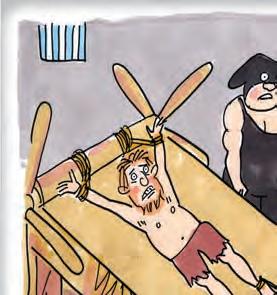

“He’s a stubborn one, all right. Bring in the boy band…”

TAKEN ON TRUST

want to be”. I have a friend who always wanted to be a singer—but the trouble is, despite years of e ort, she can’t sing to save her life. The only thing I ever wanted to be was the Duchess of Wellington, but I suspect my chances of that happening are rather slim.
I believe you should do the best with whatever talents you have, but don’t su er for not reaching the impossible. Striving to be the person you want to be is only worth it if you know when to stop.
Jana Kiesi, Epsom
“YOU SHOULD DO THE BEST WITH WHATEVER TALENTS YOU HAVE”
It was heart-warming to read Donal MacIntyre’s Consumer article about shopping using an honesty box.
Having moved from Dublin to the village of Innishannon in County Cork, I first came across this idea driving down a road to the nearby town. On a table outside a farmhouse stood four large buckets filled to the brim with da odils and a money box. From February to March every year, I drive about two miles up the road to fill my house with fresh da odils. Tulips then replace the da odils at the end of their season.
Maria Urquhart, Cork
HAUNTED BY THE PAST
“The Guilt is Far Worse Than Any Prison Sentence” made me realise there are some murderers who are truly sorry for their actions. I’m relieved to know this, but I’d find it hard to forgive someone who’d taken away a loved one. For instance, I lost my best friend when she was 17. She was walking across her local common with the family dog when her neighbour, annoyed that she kept spurning his advances, strangled her.
I’m afraid I can’t forgive a man such as this, no matter how sorry he may be for his moment of madness.
Anna Hammett, Cheshire
10 READERSDIGEST.CO.UKMAY 2013
►
◄
White. You’ll find a lot of it on this ad. It’s The Honda Way to keep things simple – and white helps make our latest offer as clear as possible. There’s a white Jazz Si too. Why? Well, doesn’t the sporty model just look good in white?



















Sporty Jazz Si
0% APR Representative
£500 deposit contribution
4 years’ servicing for £399

Model shown: Jazz 1.4 i-VTEC Si Manual in optional White Orchid Pearl at £15,210 On The Road. Terms and Conditions: New retail Jazz 1.4 i-VTEC registrations from 2 April 2013 to 30 June 2013. Subject to model and colour availability. Offers applicable at participating dealers and are at the promoter’s absolute discretion. Deposit contribution: £500 Honda deposit contribution on Jazz 1.4 i-VTEC models. £275 a month based on Jazz 1.4 i-VTEC Si in metallic/pearl paint at £15,210 total cash price (and total amount payable) with 36 months’ 0% APR Representative Hire Purchase (interest rate per annum 0% fixed) with £4,810 (32%) customer deposit required, excluding Honda Deposit Contribution. Indemnities may be required in certain circumstances. Finance is only available to persons aged 18 or over, subject to status. All figures are correct at time of publication but may be subject to change. Credit provided by Honda Finance Europe Plc. 470 London Road, Slough, Berkshire SL3 8QY. Servicing: Four years’ servicing or 50,000 miles, whichever comes first, at £399 including VAT, includes a maximum of four manufacturer’s scheduled services.
Fuel consumption figures for the Jazz 1.4 i-VTEC Si Manual in mpg (l/100km): Urban 42.2 (6.7), Extra Urban 57.7 (4.9), Combined 50.4 (5.6). CO 2 emissions: 129g/km. honda.co.uk/thehondaway
Over to You…
ON THE ROAD
According to your Motoring column, a survey asking, “Who irritates you most on the road?” revealed that elderly motorists are the least popular. Perhaps those who find us irritating should remember that one day they will be “elderly motorists” themselves. So please be a bit more patient, and hope that others show the same patience to you in due course!
Brian Cave, Somerset
FOR ALL AGES


Ellia Khan @elliak Reader’s Digest, helping me kill time in university since Day 1.
about video games these days, but they should be reading your magazine instead. Sophisticated material improves your literacy skills in a way that gaming magazines obviously don’t.
Thank you Reader’s Digest for being such an interesting and helpful magazine to the younger generation.
Tom Jackson, Teddington

The other day, when I went to buy your magazine in W H Smith, the man at the counter looked surprised and asked if it was for me. Of course, most young people (I’m 13) buy magazines
You’re still talking about…
Arthur Smith’s Maverick article on the joys of thinking negatively.
LOCATION, LOCATION
I loved reading “Best of British: Film Locations”, but I have to point out that Leeds Castle is definitely in Leeds—the village of Leeds in Kent, that is!
Jill Harding, Ashford, Kent
RD: Ooops! Sorry we missed that, Jill.
● I don’t advocate being grumpy exactly—that’s unpleasant for the people around you. But I also don’t believe that pessimists are necessarily miserable people. It simply means you’re realistic.
Janet Reeve, London
● There are di erent shades of grumpiness, from moderate to severe. Some people even make a living from it: sitcom writers,
“MOST YOUNG PEOPLE BU Y MAGAZINES ABOUT VIDEO GAMES. THEY SHOULD BE READING YOUR MAGAZINE INSTEAD”
TV pundits and comedians like Arthur Smith. Funnily enough, they’re happy being grumpy.
C J Nevitt, Tyne and Wear
● I was once advised by a nun not to look forward to anything and I’d never be disappointed. Thirty years later, I’m still testing this theory, so I’m very much on the fence regarding this debate!
Joanne Campbell, County Antrim
12 READERSDIGEST.CO.UKMAY 2013

A professional ormance
Give your home the red carpet treatment!
professional uprights have been world leaders for many years due to their outstanding German build quality, design excellence and superb performance.
domestic vacuum cleaners are built to the same high standards: That is why they routinely come top in reliability and customer satisfaction surveys and that is why, when you use one, your home will not SEBO clean.


SEBO – the vacuum cleaner professionals
For a chance to win a SEBO vacuum cleaner, enter our monthly draw at: www.sebo.co.uk

www.sebo.co.uk 01494 465533



Film R A D AR
YOUR SHORT, SHARP GUIDE TO MAY

 Author and BBC2 Review
Show critic
Natalie Haynes on the new releases
Author and BBC2 Review
Show critic
Natalie Haynes on the new releases
IN CINEMAS
The Great Gatsby It’s almost 90 years since F Scott Fitzgerald’s novel was first published. The story of Jay Gatsby, a mysterious millionaire, Daisy Buchanan, an unobtainable beauty, and the quiet Nick Carraway, who observes their story playing out, was only a mild critical success when it was first published. But eventually it was acknowledged as what it is: a great American novel, packed into only a few pages.
has never lacked ambition, and if any director was going to be brave enough to follow the famous 1974 version (with Robert Redford as Gatsby and Mia Farrow as Daisy), it’s him. He’s cast this perfectly, with Leonardo DiCaprio as the tormented Gatsby, Carey Mulligan as Daisy and Tobey Maguire taking up the role of Nick.
Baz Luhrmann




and imagine yourself in
eventually it was ►
It looks so luscious that you’ll want to pour yourself a sti cocktail, slip into your best finery and imagine yourself in the roaring Twenties.
15
Love will tear us apart: Carey Mulligan and Leonardo DiCaprio as Daisy and Gatsby
Populaire Period
French romcoms are having a moment. The Artist demolished all before it at the Oscars last year, and now Populaire arrives with bags of Fifties charm. It even boasts a supporting role for Bérénice Bejo, who played Peppy Miller in The Artist. Rose Pamphyle, a small-town shopgirl who dreams of becoming a secretary in a slightly larger town, lacks the qualifications she needs. But she turns out to have one skill—she types faster than you can imagine. It almost makes up for the fact that she knocks everything over or sets it on fire.
Typecast: Deborah Francois as Rose Pamphyle in Populaire

AND NATALIE’S PICK OF THE DVDS

Les Misérables

The Sessions
Her boss Louis is determined that Rose will win the regional speed-typing contest, and they embark on an intensive training schedule. Will they fall in love, or is it all about the carbon ribbons? Imagine Rocky with a romantic feel, prettier frocks and typing instead of boxing.

READER RADAR
Sarah Fuller, 62, nurse
Watching: Mrs Brown’s Boys (BBC1) The swearing’s not everyone’s cup of tea, but I know Irish families who talk like that. And it’s a programme where family is important.
Reading: Sea Glass by Anita Shreeve. Paints a vivid picture of America’s Great Depression.
Too worried you’d weep in the cinema? Now sob in the privacy of your own home with Anne Hathaway’s a ecting performance.
John Hawkes and Helen Hunt star in this sweet, sad film about a paralysed man who’s determined not to die a virgin.
Online: flipflorence.com. Has lots of information and accompanying short videos about a place I’ve been to on holiday and wanted to learn more about.
Listening: Faure’s Requiem. We sang this in my choir. It’s so rewarding to be part of creating something so beautiful.
16 READERSDIGEST.CO.UK MAY 2013
R A D AR

Music

BBC 6
Music’s Stuart Maconie’s pick of the recent releases
critical darlings, though they were briefly fashionable around the time of New Gold Dream with its dazzling singles

Bloodsports by Suede Think British pop without a whi of Britpop. Stifle your cynicism. The first new Suede album in 11 years is not a brazen cash cow or a last throw of the dice, but born, it would seem, of a genuine hunger and enthusiasm for the fray. After an exultant live reunion in 2010 at London’s Albert Hall, Suede went back into the studio and the result is a swaggering comeback that has all the Suede trademarks: louche sexuality, squalid romance, thrilling tunes.


Celebrate by Simple Minds Think Bon Jovi meets Bowie. Simple Minds’ journey from a ragged Glaswegian punk outfit called, risibly, Johnny & The Self Abusers to global arena rock aristocrats was an odd and unsung one. They were never
“Someone Somewhere in Summertime”, “Promised You a Miracle” and “Glittering Prize”. This tells the whole story from spiky art rock to stadium fillers.


“Promised art


Machineries of Joy by British Sea Power. Think big, warm and weird. Since emerging from a Lake District hamlet more than a decade ago, British Sea Power have ploughed a singular and joyous furrow.

They are a stirring, dynamic rock act who cast their net far and wide in search of lyrical inspiration—the Canvey Island floods of the early 1950s, Eastern European immigration, the Larsen B ice shelf. Machineries of Joy is something of a return to form: human, clever, replete with singalong choruses and a certain strangeness.
►
17 READERSDIGEST.CO.UK MAY 2013
Gadgets

Technology expert, BBC 5 Live presenter and Answer Me This! podcaster
Olly Mann reveals the latest must-haves
Dyson Hot + Cool, from £349
First vacuum cleaners, then hand dryers, then taps. Now Dyson achieve the impossible: they’ve transformed the fan heater—mainstay of the dingy granny flat—into something stunning. Quietly filling the room with air, it can be adjusted from 0C–28C with a comely remote control. The bladeless design reduces the risk to kids and pets, and it looks like a Barbara Hepworth sculpture. The catch? It’s ten times the price of a normal heater. If you can a ord it, it’s worth it.
Parrot Asteroid Mini, £249 (plus installation)
ALSO ON OUR RADAR…
May 01
May Day
May 12–18
Christian Aid Week
May 14
New Dan Brown book
Inferno published
May 18 Eurovision Song Contest. Malmö, Sweden
May 25–June 27
Isle of Man TT Races


Connect your smartphone to this hands-free kit via bluetooth and it overrides your car stereo to make crystal-clear calls. Yes, you can confidently answer the phone without removing your hands from the wheel. The touchscreen display unit—e ectively a tiny Android computer—also has satnav and various other apps. They’re a bit glitchy, but the Mini’s sound quality is faultless.
AND CHECK OUT…
Streamport by Bayan Audio, £59.99 Love streaming music
from your phone, but hate the tinny speakers? This beams sounds to your beloved old hi-fi or radio.

Clock Safe, £12.99





Heist movies teach us that crooks will uncover the safe hidden behind your oil painting. But your jewels were inside this plasticky clock all along!
18 READERSDIGEST.CO.UK MAY 2013
R A D AR

Sport

ESPNcricinfo cricket blogger, broadcaster and stand-up comedian Andy Zaltzman previews the best of the month’s action
Carl Froch v Mikkel Kessler, WBA super-middleweight world-title fight, 02 Arena, London, May 25
Two men who would feature high on most people’s lists of “People By Whom I Would Least Like to Be Punched In the Head” come fist-to-face in what should be one of the most exciting fights of the year, in or out of the ring. Froch, a fearless aggressor who’s bucked modern boxing’s trend by not refusing to fight against fearlessly aggressive opponents, is seeking revenge for the outstanding Dane’s narrow victory over him in 2010.


Cheese Rolling, Cooper’s Hill, Gloucestershire, 27 May

People chasing a massive Double Gloucester down a limb-threateningly steep hill. What more do you want in sport?
This annual contest stands as testament to human ingenuity. What other species has ever calculated that, if you coagulate acidified milk using
some weird enzyme found in the mucous squidged out from the dried stomach of a freshly slaughtered calf, you can make a foodstu ? What other species would then have the barefaced cojones to start chasing that foodstu down a hill? No other species. None that has ever lived before, and none that will ever evolve henceforth. Take that, David Attenborough!
Heineken Cup Final, Dublin, May 18 The showpiece showdown of the Northern Hemisphere club game. England’s three quarter-finalists (perennial toughnuts Leicester, the charmlessly impressive Saracens and reigning Premiership champions Harlequins) will have to overcome powerful Irish and wealthy French opposition to lift the trophy. Watch out for rugby’s trademark cocktail of institutionalised low-level cheating and sudden outbreaks of unmatchable sporting majesty when the sport breaks free from its own unrefereeable complexity. ■
19 READERSDIGEST.CO.UK MAY 2013
COTSWOLDS PHOTOLIBRARY/ALAMY; AFP GETTY IMAGES

You Couldn’t Make It Up…
¶ I WENT TO A JUMBLE SALE WITH MY HUSBAND, but we soon got separated. I was looking around for him when a lady approached and asked me if I’d lost someone. I told her I’d lost my husband. She pointed to some chairs and said she’d get me a cup of tea. When she returned, she asked gently how long ago I’d lost him.
“Not long,” I replied. “In fact, I can see him in front of me now.”
“That often happens,” she said sympathetically. But she got a real shock when my husband suddenly appeared and spoke to me. It was then we realised that this jumble sale was in aid of a bereavement charity.
Linda Stalker, Yorkshire

¶ I moved back to my old house after four years abroad, to find the garden very overgrown.
My brother came over to do some cutting back. Just after he arrived, the young musician who uses my garage for drum practice turned up wearing a very smart suit. I asked him if he was going to a wedding.
“No,” he replied, “I wore my best suit so your brother wouldn’t ask me to help him.”
Cheryl Calloway, South Wales




¶ My daughter came home from primary school after learning about the birds and the bees in the playground.
“What’s a condor?” she asked.
I was happy to tell her it was a South American vulture, but her puzzled look said it all!
Frank Murphy, Edinburgh
¶ We don’t usually have cause to complain about our meal when eating out, but on this occasion my husband felt he had to say something to the manager about the terrible food.
We weren’t surprised when the waiter said he’d gone out for his lunch.
Suzanne Roswell, Norfolk
¶ I was recently having my hair done for a night out, and the young hairdresser asked me if I’d planned my holiday yet. ►
21 MAY 2013READERSDIGEST.CO.UK
You Couldn’t Make It Up…
I told her that we’d booked a holiday to Yellowstone Park in the summer and said I was looking forward to seeing the geysers.
“Yes,” she replied, “I like American men.”
Clare Crawford, London
¶ My mum was telling me how wonderful her neighbour was for popping round during the heavy snowfall to see if she needed any shopping.


But she wasn’t so happy when the neighbour explained that a news broadcast had advised people to “check up on elderly neighbours during the bad weather”.
Fiona McGarry, Hampshire
¶ A cafe recently opened to the public at the local prison, sta ed by prisoners who’d earned this special privilege. I arranged to take my parents for lunch after hearing glowing reviews.
The entrance through a tunnel
¶ A YOUNG ITALIAN BOY called Antonio joined my class when I was teaching at a school that prided itself on the good manners and behaviour of its pupils.
Antonio, however, clearly
“Yes, I see a lot of people with stress these days”
WIN £50 FOR YOUR TRUE, FUNNY STORIES. EMAIL
excerpts@ readers digest.co.uk OR GO TO facebook. com/readers digestuk

to the prison ramparts was a bit imposing, but the table had a wonderful view of Weymouth Bay, and we sat comfortably waiting for my husband to arrive. We soon spotted him at the emergency exit, gesticulating wildly, until a waiter rushed to open the gate.
“Sorry, I couldn’t find the way in,” said my husband.
“That’s OK, I can’t find the way out,” replied the waiter. Sue Branch, Dorset
hadn’t heard the rule about running in the building. One day, he came charging down the corridor towards the headmaster, who held up his hand in a “stop” motion. Not understanding
this gesture, Antonio jumped up, slapped the upheld hand in a highfive and ran straight past—leaving a stunned headmaster behind!
Caroline Topping, Kent ■
22 READERSDIGEST.CO.UK MAY 2013
◄

A holiday on Guernsey is all about simple pleasures. Like seaside strolls and cliff-top walks. Like good food made with local produce. Like knowing that you don’t have to rush because everything you want is close at hand. There are castles and forts and one of the prettiest harbour towns in Europe. And there’s the excitement that comes with being somewhere different coupled with the reassurance that you’re not far from home.
Order your free Guernsey brochure today. Freephone 0800 028 5353 quoting ref: 17/5 or go to visitguernsey.com
Getting to Guernsey is easy. Flights take as little as 30 minutes and ferries around 3 hours.

visitguernsey.com













value short breaks available
www.lesrocquettesguernsey.com Les Gravees, St Peter Port, Guernsey AA HOTEL 79% book your escape now... or tel 01481 822 886 from London Gatwick, London Stansted, Manchester, Bristol, East Midlands and Southampton to Alderney GREAT VALUE FARES incl. luggageFREE up to 30aflights day connecting the UK/islands ST PETER PORT, GUERNSEY NO REQUEST IS TOO LARGE, NO DETAIL TOO SMALL www.theoghhotel.com
Les Rocquettes Hotel Great
Tel: 01481 722146
FLY FROM Birmingham, Bristol, East Midlands, Exeter, Gatwick, Manchester, Norwich*, Southampton and Stansted. *Weekly service in peak season only.
Alderney Herm Sark
SAIL FROM Poole, Weymouth* and Portsmouth *From mid-July.
UK France Guernsey
Have you seen our invisible hearing aid yet? No?
Not at all? Exactly.
Our fantastic invisible hearing aid is small. Really small. And, because it fits slightly deeper in the ear canal than your average hearing aid, it’s virtually invisible when worn. That means you get all the benefits of hearing better without anyone understanding how you do it.
Whilst it can’t be seen the difference can be heard.
Just because this hearing aid is small doesn’t mean it’s less effective. We’ve made sure this tiny device has the high speed processors and clarity enhancing features of the very latest hearing aids. These are the things that make sure you get to enjoy all the great things life has to offer like conversations with friends and family, an evening out in your favourite restaurant or a cosy night in front of the TV. And you can enjoy all this with the confidence that whilst people might notice the difference in your hearing they definitely won’t notice your hearing aid.
If you like what you (don’t) see, call 0845 203 7662 and book a free appointment in store to find out more about this amazing little hearing aid.
“I hear normally, it’s as if I don’t have a loss and, because you can’t see them, no one else knows I do!”

Free hearing check
To book your hearing check simply call 0845 203 7662
Terms: Valid until 4 June 2013. Free hearing check for over 18s only. Only one free hearing check per year.


For more information please visit Bootshearingcare.com
Word Power
Harry Mount hits the high notes
Born 200 years ago this month, German composer Richard Wagner famously shook up the music world. But how many operatic words do you know? Find out by answering
A, B or C below.


9 tessitura n
A average pitch B acting ability of singer C female understudy
10 libretto n
A opera text B on-stage death C dressing room
11 diva n



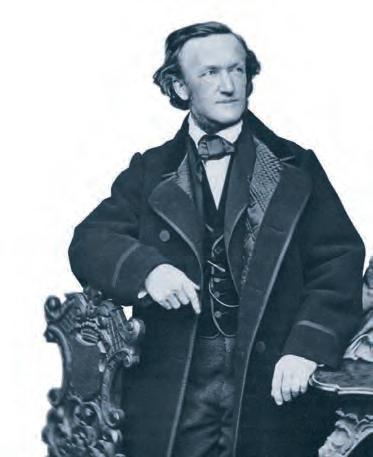
1 aria n
A violent death B dramatic pause C operatic song
2 embouchure n (omm-boo-shoor)
A position of lips B loud boom C repeated phrase
A word is born Phablet
In the new fashion for oversizing mobiles, the phablet has emerged— a mobile phone that’s approaching the size of a tablet computer.
RD Rating: Useful? 7/10 Likeable? 6/10
3 overture n
A romantic lead B bad voice
C introduction to an opera
4 recitative n
A quiet singing B narrator
C sung speech
5 tenor n
A sweet sound B animal noise C male singing voice
6 baton n
A short stick B high note
C piano string
7 bu o n
A di cult song B missed note C comic singer
8 vibrato n
A mouth organ B wavering voice C out-of-tune singing
A very low note B great female singer C conductor
12 cadenza n (cadd-ends-a) A singer’s closing flourish B high note
C tragic heroine
13 coloratura n (col-or-ah-toor-a)
A bright costume B climax of an opera C elaborate singing passage
14 bel canto n
A Italian style of singing
B minor part C company seamstress
15 soprano n
A opera stage B high voice
C tonsil
COVER STAR EDDIE IZZARD’S FAVOURITE WORD?
“Abso-f***inlument” (with dashes).
I used it when I was performing in Paris and they loved it.” ►

25 MAY 2013READERSDIGEST.CO.UK
Word Power Answers
9–11 getting there
12–13 impressive 14–15 word-power wizard!
1 aria C
operatic song. “The Maria Callas aria was heavenly.” Italian (air).
2 embouchure A position of lips. “The embouchure can put great strain on the face muscles.” French bouche (mouth).
3 overture—C introduction to an opera. “The overture is a section with no singing in it.” Latin apertus (open).
4 recitative C sung speech. “Opera singers have little chance to shine in the recitative.” Latin recitare (read aloud).
5 tenor—C male singing voice. “Luciano Pavarotti was a marvellous tenor.” Latin tenere (to hold).
6 baton A short stick. “The conductor waved his baton furiously.” Latin bastum (stick).
7 bu o C comic singer. “The bu o really hammed it up.” Italian bu one (bu oon).
8 vibrato B wavering voice. “The vibrato was unintentional.” Latin vibrare (vibrate).
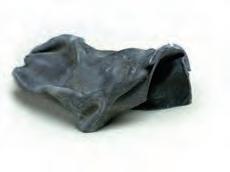
WHY PLUMBER?
Plumber originally comes from plumbum, meaning lead (the metal) in Latin. In early French, plombier meant someone who sold lead or worked in the material. In English, it changed to plumber, meaning someone who used a lot of lead for water pipes and fittings.
9 tessitura A average pitch. “Her tessitura was extremely high.” Italian (texture).
10 libretto A opera text. “The libretto was very hard to learn.” Latin liber (book).

11 diva B great female singer. “She had the bearing of a diva.” Latin diva (goddess).
12 cadenza A singer’s closing flourish.
Play WP online: go to readersdigest. co.uk/wordpower
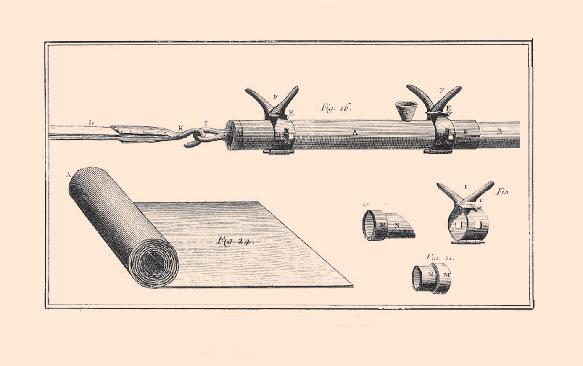

“A cadenza is often towards the end of an aria.” Latin cadere (fall).
13 coloratura C elaborate singing passage. “Her coloratura was uplifting.” Latin colorare (to colour).
14 bel canto A
Italian style of singing. “Bel canto has a really delightful tone.” Italian (fine song).
15 soprano B high voice. “Kiri Te Kanawa is a great soprano.” Latin supra (above). ■
26 READERSDIGEST.CO.UK MAY 2013
→ →















In the Future…
...everything will fall apart, says Gary Rimmer



Dimensional doodles
3D printing provides the wherewithal to fabricate “stu ” in your kitchen—even your own kitchen. The possibilities seem limitless. Plans are even available online for a DIY 3D bioprinter (one of these “printed” a silicon ear—a technique that may one day lead to functioning body parts). In the Netherlands, meanwhile, a 3D bricklaying printer is being used to print pavements.
Most 3D printing still comes under the heading of “engineering”—but this is changing. The 3Doodler is a 3D pen that exudes fastsetting plastic “wire”, allowing the 3Doodler to lend physical depth to a 2D drawing and give existence to a child’s sketches.
By 2020, if you ask a designer to draw you a kitchen, he’ll make it appear as 3D wire before your very eyes.
Walking buddy
Early-onset dementia
su erers who are still physically fit can find themselves e ectively incarcerated, because they get lost when travelling around independently. But a GPS-equipped prototype walking stick from Fujitsu may o er a solution.
If you, pre-programme locations —“my home”, say—into the stick’s handle, LED directional arrows in the top of the cane guide the user in the right direction. If the user strays o course, the LED lights change colour and the stick vibrates until they’re back on track. They could be a major boon by 2023 .
BUILT-IN OBSOLESCENCE
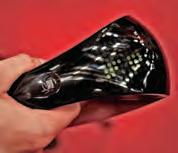
Digital Rights Management (DRM) is technology that limits the spread of electronic media. Now Swiss designers have considered how solid objects might be likewise endowed. For illustration, they’ve built a DRM-equipped chair. Using inbuilt pressure pads and an opensource electronic device called an Arduino, which can control physical objects, the chair falls apart after being sat upon eight times.
Manufacturers won’t miss out. By 2028, expect a car that sheds its wheels if driven too long by someone other than the original owner.
28 READERSDIGEST.CO.UK MAY 2013










“I got money off my bill when I moved to a tariff with rewards. Nice to be rewarded now an d then.”






However you use energy, at E.ON we believe you should get something back for your loyalty. If you’ve been with us for a year or more, you could get money off your bill by simply changing to one of our tariffs with rewards. It’s a thankyou for staying with us.

See if you could be rewarded at eonenergy.com/rewards or call 0330 400 1059





















Helping our customers. We’re on it.


















Tariffs with rewards are not available on all meter types (e.g. Heatwise/Restricted hours) or single gas only customers. E.ON Energy Solutions Limited. Registered office: Westwood Way, Westwood Business Park, Coventry CV4 8LG. Registered in England and Wales No. 3407430.
Instant Expert
Controversial changes are happening in the British justice
Why is legal aid in the spotlight?
The provisions of the Legal Aid, Sentencing and Punishment of O enders Act 2012 have just come into force. The act has cut £320m from the annual £2bn budget for legal aid in England and Wales—the Government money to help people pay for legal advice, mediation or representation if they can’t a ord it.
What are the key changes?
The same qualifications for legal aid will apply (basically, you need to prove that you can’t a ord to pay yourself).
What’s di erent, though, is that the areas of law exempt from legal aid have been substantially increased.
The areas already exempt were libel or slander cases, boundary dispute, personal injury trials, employment
tribunals and the writing of wills. The new areas are child custody, divorce, debt, clinical negligence, welfare, housing, employment, immigration, benefits and education.
However, legal aid will still be available in cases where there’s a threat of domestic violence, a risk of losing your home, or where life or liberty is at stake.
What are the arguments for the changes?...


A protester against the new act
…and against?

Before the act, Britain had the highest per capita expenditure on legal aid in the world. According to the Ministry of Justice, “Legal aid is an essential part of the justice system, but [we] can never lose sight of the fact it is paid for by taxpayers and resources are not limitless.” The ministry also says that “Legal aid will continue for those who most need it. But in cases like divorce, courts should more often be a last resort, not the first. Evidence shows that mediation is often more successful, cheaper and less acrimonious.”

The mediation is often more successful,
Lord Bach, the shadow justice minister who led Labour’s opposition to the act, has called the new restrictions “immoral” and “absolutely scandalous”, for “attacking the very poorest and the most disadvantaged”. Lord Neuberger, Britain’s senior judge, has suggested that more people will be forced to represent themselves— leading to longer hearings and even to increased costs for the Government.
30 READERSDIGEST.CO.UK MAY 2013
PETER DAZELEY/GETTY IMAGES
Legal Aid


system—Harry Mount on the facts behind the news


What e ects have the cuts had so far?
Because of the withdrawal of legal aid for housing claims, the homelessness charity Shelter will be closing nine o ces. Citizens Advice Bureaux have also sent out redundancy notices. The British Red Cross says it will have to withdraw help from those trying to bring children into the UK to escape violence or persecution.
The Government itself estimates that around 600,000 people will lose access to legal advice and representation.
What about longerterm e ects?
The majority of independent law centres have survived, with legal charges being cut. Some £65m in lottery and government money has been provided for a two-year transitional period. Many lawyers are likely to provide more work on a pro bono (ie, free) basis.
Under proposals put forward by Chris Grayling, the justice secretary, lawyers may have to compete for contracts to force down the cost of criminal cases, which take up more than half of all legal-aid costs.
Do rich criminals get legal aid?
Sometimes—but the Government is trying to stop it. From July, criminals using legal aid in a failed defence will have their cars seized and sold, with the proceeds going to pay costs. Since 2010, convicted criminals have been ordered to repay £75m in legal aid, but only £16m has been received so far.

Another Government proposal is for criminals to pay the full defence costs if they don’t cooperate with investigations into their income. ■
31 MAY 2013READERSDIGEST.CO.UK

Kate Humble If I Ruled the World
Writer and TV presenter Kate Humble’s recent credits include the BBC’s Volcano Live, Orbit: Earth’s Extraordinary Journey, Who Do You Think You Are? and the long-running wildlife series Springwatch and Autumnwatch. She’s the second woman ever to be made president of the RSPB.
I’d ban plastic shower curtains and teacups. Finding yourself cling-wrapped in a mouldy bit of cold plastic takes away all the pleasure of a nice warm shower. Frankly, I’d rather use a bucket. And teacups are useless. As soon as the tea is poured it gets cold, you have a mere mouthful to drink and the awkwardness of dealing with the handle, saucer and teaspoon is rather exhausting. When I have tea it’s got to be a big mug of hot comfort that I can wrap my cold hands around—that’s the best-ever feeling.
Outdoor education would be mandatory in the school curriculum. We’re constantly—and rightly—bombarded about the fragility of our planet. But if people aren’t exposed to the way nature works, why should they care? The future is in the hands of our children, so it’s vital that urban kids experience the wonder of nature first-hand. I took a group of city schoolchildren pond dipping recently at an RSPB centre. A little girl caught a stickleback fish and she was so excited you’d have thought she’d caught a shark.


All her friends got excited too, and it was an important, magical moment of connection. Amazing organisations like Farms for City Children, set up by the writer Michael Morpurgo, do a great deal to get kids immersed in farm life, but if I had my way, all schools would have the funds to take children into the countryside on a regular basis.
I’d do away with exams. I went to a very academic school where we spent all our time preparing for or taking tests. I left with lots of passes, but the process
32 READERSDIGEST.CO.UK MAY 2013
ILLUSTRATED BY SAM FALCONER; REX FEATURES
killed any further desire I had for learning.
Wouldn’t it be wonderful if children had more time to explore the things that really interest them? I remember when we were asked to find a poem by the rather dull writer we were studying. In the anthology I was searching through, I came across a poem by a di erent writer that completely caught my imagination. I rushed to my teacher, telling her about this incredible poet called e e cummings who didn’t use any punctuation, but whose words had touched me deeply. She said, “But we’re not studying cummings, are we? We’re studying George Crabbe.” No wonder I didn’t go to university.
I’d stop meat being sold in supermarkets. I hope the recent horse-meat scandal has woken people up to the real issues of cheap food production. We should buy our meat from butchers or farm shops where the goods on o er have been produced locally, and where we can learn about di erent cuts. I’d like people to start to value and know their meat, and to appreciate the skill required to bring something of good quality to the table.
I’d support good farming practice. If you hate the idea of battery chickens then don’t buy cheap eggs—buy free range. Look at products that contain eggs and check they’re free range too.
It’s consumers who drive good farming practice. Making the connection between
“Everyone would take two weeks o a year without phones or the internet”
what you buy and the way the animal product has been cared for is something with which our urban population is becoming increasingly out of touch.
I’d make private gardens wildlifefriendly. If you joined the private gardens in Britain together, they’d make a bigger area than all the nature reserves in the country. So our gardens really do count and even little things can make a di erence. For example, put dead leaves and grass cuttings under hedges to make a cosy home for slow worms (who eat slugs), plant flowers to help the bees find pollen, pile twigs and logs up to make homes for insects, and consider keeping bees, making a pond or putting up a nesting box. I’d love to see a row of terraced houses with all the gardens joined up and everyone working together to make the street as wildlife-friendly as possible.
Everyone would take two weeks o a year without phones or the internet. They’d go somewhere they’d never been before and use this special time to enjoy and connect with their surroundings, free of guilt. ■
As told to Caroline Hutton
Humble by Nature: Life, Lambs and a Dog Called Badger by Kate Humble (£16.99) is out now.
33 READERSDIGEST.CO.UK MAY 2013
Reasons to Be Cheerful 30
It’s time to give up the urge to give up, says James Brown
The greasy grey football spins away from the player two feet in front of me. I know I can get there first, so I charge in and put my boot right through it. I win the tackle, but my standing leg slips from beneath me and I find myself lying in a bed of mud. It’s cold. Soaking. It covers me from neck to ankle, like a new layer of wet clothing.
But it feels OK. I’ve done this before,
scores of other amazing challenges she’d set herself. My longstanding aim has been a little easier. I just wanted to play football on grass again, and enjoy it. Unfortunately to do that, I’d have to overcome my short-sightedness, my massive stomach (“wok smuggler” to my friends), my asthma and the fear that I wouldn’t be any good. It doesn’t matter what physical activity we’ve been into in our pasts—

many times, in a different century. I get up and carry on. With all this rain it was bound to happen—it might as well be in the opening few minutes. It’s my first touch in my first 11-a-side match on grass in decades. I’m 47, and I’m feeling fantastic, which is a reason to be cheerful.
I was very impressed with Paula Reid, in February’s RD, who sailed round the world and dived with sharks, among
horse-riding, dancing, sex, perhaps all three simultaneously—many of us have let go for whatever reason and just given up. I’m hoping I’m only halfway through my life. I don’t want to give up any more.
I’ve been playing 5-a-side on artificial surfaces for years, but there’s something more serious about football on grass. It’s what the professionals do. It’s what I used to do as a kid most school nights.

34 READERSDIGEST.CO.UK MAY 2013
Still Football Crazy...

Somewhere in the attic of my mind I’m still deluding myself that I might get a game for Leeds United.
Not long ago I turned out for a mate in an 11-a-side friendly on AstroTurf. The opposition seemed like friendly guys who played a good standard and didn’t kick their way to victory, so I asked them if they fancied playing our office team.
pretty confident that if I was the unfittest player in our team, we might well do all right.
On match day, I bought some shin pads and had a bloody good suck on the inhaler. As I jogged out through the rain and into the mud, I also tried to think positively. I was very much aware that my stomach has a larger circumference than a washing-up bowl, that I grind my

The fact that we didn’t yet have an office team wasn’t important—we’d talked about it often enough. I’d assumed we’d play on AstroTurf as well, but pitch congestion shunted us onto grass.
Come the big game, there were seven of us from work, including Preecy, a former professional goalkeeper, at centre back. And I’d made sure there were two whippets on the wings. I was

teeth, which gives me earache, and that my glasses would get covered in rain and mud. There was no possibility I’d be mistaken for an athlete. Instead, I thought about what the former Leeds player Tony Dorigo said about one of my favourite players, David Batty: “He just went out to win the first tackle, then the second, then the third.” And I thought about what I tell the boys I coach—short, easy passes; ►
35 READERSDIGEST.CO.UK MAY 2013 ILLUSTRATED BY JOHN RIORDAN
I conserved my energy, kept my passes simple and let the boys in their twenties do the sprinting
give and go; always be prepared to receive the ball.
And that’s where we came into this column, with me totally covered in mud. Cold, clinging sleeves and legs of mud. It was all the motivation I needed. I conserved my energy, kept my passes simple, won most of my tackles and let the boys in their twenties do the sprinting. The weather also worked in my favour. While the slippery surface made the younger, fitter players of the opposition more cautious, my weight kept me stable like a tug boat in an industrial estuary. Both teams enjoyed a 3–3 draw and
afterwards Preecy came up sort of hesitantly and, as he paused to speak, I said, “You thought I was going to be s**t, didn’t you?” He laughed: “No, I didn’t, but I didn’t know how good anyone was going to be and you were really good. I was genuinely impressed.”
That’ll do for me. We’re lining up a return fixture. n
James, founder of Loaded magazine, now edits Sabotage Times—an online magazine with the motto: “We can’t concentrate, why should you?” Follow James on Twitter @jamesjamesbrown
Chumps on the Stump…
The local elections are now swinging into action, with politicians of every stripe hitting the campaign trail. But, as history shows, it can be a tricky place. Everyone is vulnerable to an ambush—both Tony Blair (verbally) and John Prescott (physically) were mugged in 2001, but David Cameron was arguably more disturbed by voter Brian Kendrick in 2005, who hugged him closely and shouted, “They’re trying to dig up your past. It’s nonsense! We’ve all been bad boys.

I’m a bad boy even now” —prompting a nervous laugh from the future PM.
Looking silly is also a risk, whether it’s Margaret Thatcher holding a calf during a visit to a farm in 1979 (a treat for caption writers) or former minister Oliver Letwin addressing a mock hustings in a toga —while being heckled by musician Billy Bragg
dressed as a centurion. (Letwin whipped o the toga after spotting a TV camera, sensing how odd it looked to outsiders.)
But the honours must go to US vice-president Joe Biden who, in 2008, heaped praise on his colleague Chuck Graham at a rally before shouting, “Stand up, Chuck, let ’em see you!” When he realised to his horror that Graham was wheelchairbound, he recovered (sort of) by saying, “I’ll tell you what, everybody else stand up for Chuck!” PA
36 READERSDIGEST.CO.UK MAY 2013
◄
ARCHIVE/PRESS ASSOCIATION IMAGES
SOFIA NAT IONAL BALLET Formed in 1928 and steeped in the Russian classical tradition for over 80 years, the company has become a national cultural institution in Bulgaria and is now fast developing an international reputation for its remarkable and breathtaking performances.
SPECIAL READER’S DIGEST OFFER—
SAVE £10 PER TICKET
Reader’s Digest readers can experience this highly acclaimed ballet company on their first ever visit to the UK and save £10 o the top two ticket prices for performances of Giselle and Don Quixote. To take advantage of this limited o er call your chosen venue box o ce from the list on the right and quote ‘Reader’s Digest O er’ when booking.

Accompanied by T HE ORCHEST RA OF S OFIA NAT IONAL BALLE T featuring a company of 90 performers, including a full orchestra. Their remarkable talent is perfectly showcased as they delight audiences with their magnificent skills, elaborate sets and dazzling costumes.
LIVERPOOL 1-3 July
Empire Theatre 0844 871 3017
£24 £19.50 (BOOKING FEES APPLY)
READING 4-6 July
The Hexagon 0118 960 6060
£24.50 £22.50 (BKG FEES APPLY)
AYLESBURY 8-10 July
Waterside Theatre 0844 871 7607
£21 £18 (BKG FEES APPLY)
GLASGOW 11-13 July
King’s Theatre 0844 871 7648
£21 £18 (BKG FEES APPLY)
EDINBURGH 15-17 July
Playhouse 0844 871 3014
£24.50 £22.50 (BKG FEES APPLY)
BRISTOL 19-21 July
Hippodrome 0844 871 3012
£26.50 £21 (BKG FEES APPLY)
MANCHESTER 22-24 July
Palace Theatre
0844 871 3019
£22 £16 (BKG FEES APPLY)
WOKING 25-27 July
New Victoria Theatre
0844 871 7645
£21 £16 (BKG FEES APPLY)
MILTON KEYNES 29-31 July
Milton Keynes Theatre 0844 871 7652
£26
£23 (BKG FEES APPLY)
CONDITIONS: THIS OFFER IS SUBJECT TO AVAILABILITY, DOES NOT APPLY TO TICKETS ALREADY PURCHASED AND CANNOT BE USED IN CONJUNCTION WITH ANY OTHER OFFER OR DISCOUNT. OFFER DOES NOT APPLY TO PREMIUM SEATS. OFFER CLOSES 17 MAY 2013. TICKETS SUBJECT TO BOOKING FEES. TICKETS CANNOT BE EXCHANGED OR REFUNDED. TICKET OFFER APPLIES TO PERFORMANCES OF GISELLE AND DON QUIXOTE ONLY.
ST RIC TLY LI MIT ED SUMM ER SEASON OF BALLET M AST ERPIECES
A SPECIAL OFFER FOR READER’S DIGEST READERS
When Eddie Izzard decided to honour Nelson Mandela, failure wasn’t an option
BY BENJI WILSON
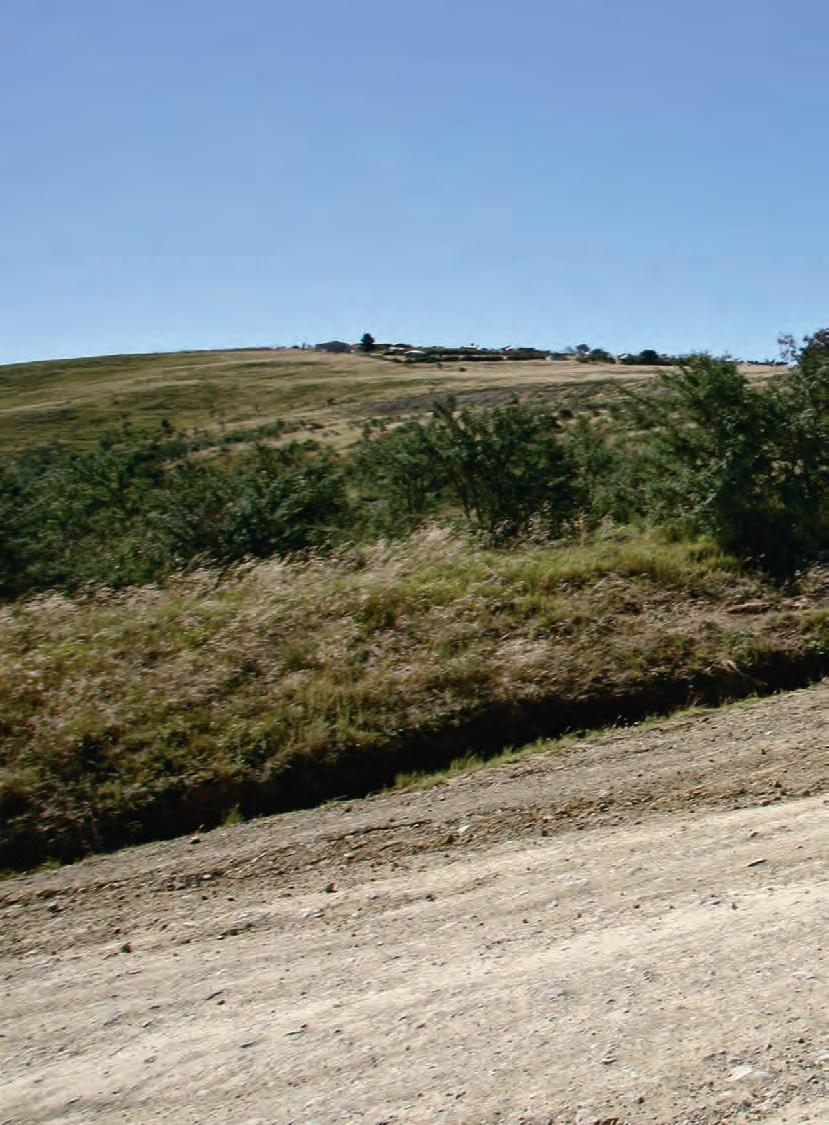
Running for Mandela
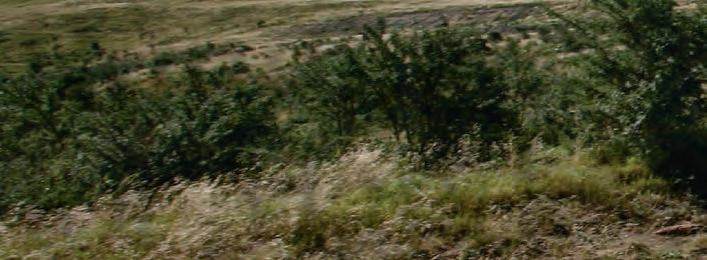
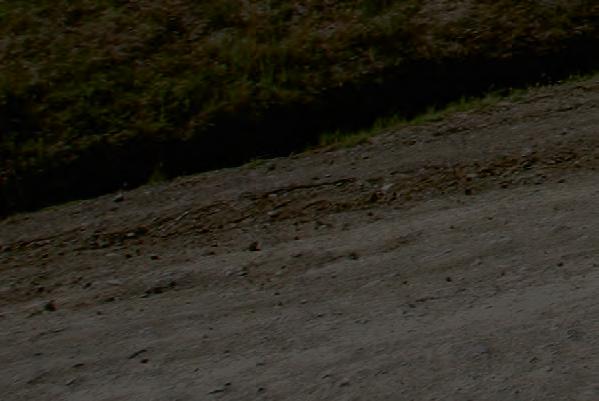
Eddie Izzard is not a man accustomed to failure. He was already one of the world’s most popular stand-ups when he decided that, actually, acting was his true calling. So he started again, and with roles in US cable-TV hit The Riches, the film Valkyrie and NBC’s forthcoming Hannibal, it’d be fair to say he’s succeeded. Then, having shown no aptitude for, or interest in, long-distance running, he suddenly ran 43 marathons in 51 days for Comic Relief in 2009.
So when he announced last year that his next project would be a mere 27 marathons in 27 days across South Africa, as part of a Sky documentary telling the story of Nelson Mandela (imprisoned for 27 years), we all assumed it would be a doddle.
As it happens, Eddie sees Mandela as a hero precisely because he’s an ordinary man who did extraordinary things.
►
38
LION TV/SKY

39
“He’s one of the greatest people who’s lived because he’s not a saint. I would say Nelson Mandela isn’t special, but what he’s made himself do is special. He spent all that time in prison—to come out that calm, with that generosity of spirit…this guy needs to be celebrated.”
So to honour Mandela’s long walk to freedom, Eddie set out on a long walk, run and stagger of his own.
“And it just went wrong.”
◄ still a good deal of separation, but the black community are the people in political power. The fact that there was a black South African doctor giving me good advice in a hospital that was quite far out in the Eastern Cape, very much in the countryside; and the fact that young black comedians are doing very well in stand-up comedy and that scene’s growing; and the fact that I was doing gigs with both black and white people coming in: these are things that just wouldn’t have happened before.”
Four marathons in, says Eddie, “I was peeing pee that got darker and darker, up to Coca-Cola colour. I thought it was the vitamin supplements I was taking. So when I agreed to go to the doctor and get checked up, I thought he’d give me something and I’d be back on the road the next day. Instead, he said, ‘You go straight into hospital.’
“That threw me. I started working out the maths of whether I’d be able to complete the marathons. I thought, If we miss out one marathon I can do two in one day. Then I had to take a second day off, then a third.”
Eddie had had an extreme reaction to some prescription drugs. He was seriously unwell—and his marathon challenge was over.
“I’ve been told since that if I’d continued it could have killed me. But I wasn’t feeling that as I ran. Apparently, you just carry on and then you drop dead. There you go.”
Even with a “mere” four marathons under his belt, he still got the opportunity to assess the progress of the Rainbow Nation some 20 years after its first free election.
“It’s definitely in a better place. There’s
He was told running in a country with a reputation for violent crime would be a safety risk, and he’d need security. He didn’t see the point, but it wasn’t a polite request.
In the event, though, “the only thing that happened was one guy drove his car very slowly…right at me. He was going 5mph and not moving out the way. I jumped to the side and he sailed past. I think he was a bit stoned! He was in a happy state—probably shouldn’t have been in a car, though.”
Apart from nearly being run over, the abiding emotion from his South African trip is a sense of unfinished business. I put it to him that this may be his firstever failure; he counters that, in his view, he’s been failing for a large part of his career, by not following a childhood dream of being an actor.
“I knew I wanted to act when I was seven, but I only got my career going when I was 30, So I consider I’ve had 23 years of getting nowhere. I’ve done a lot of failure. And the trick about failure is to get back up, regroup and go back in again: that’s Nelson Mandela’s story.”
He insists he’ll finish the remaining
40 READERSDIGEST.CO.UKMAY 2013
23 marathons. “A lot of people think that’s it. At Sky maybe they think, OK, we’ve got a documentary and that’s it. I’m going back, even if no one’s paying for it. Just so that everyone’s clear on this: I will. Do. The 27 marathons. And if I fail a second time, I’ll go back a third time. I won’t stop until I get there. I’ll complete my tribute to Nelson Mandela.”
You’d be a mug to bet against him. There’s determination behind those mischievous eyes and that wonky nose. So when he starts talking about wanting to run for London Mayor in 2020, you find yourself erring more towards “possible” than “ridiculous”.
“I plan to go for a nomination for the Labour Party in 2019. Do canvassing from now until then. I’m getting into politics because I don’t like the right wing and the right wing keeps coming back. It’s the whole UKIP…BNP thing, and I just want to fight against that.”
He says that as a funnyman going into such a serious world, he’s not expecting an easy ride. But perhaps a ►
“Mandela isn’t special, but what he’s made himself do is special”




AMANDA SEARLE; GLENN COPUS/EVENING STANDARD/REX FEATURES
RUN, EDDIE, RUN Top tips from the marathon-gobbling comedian

MORE IS BETTER
If you’re doing multiple marathons, it gets easier after ten. That sounds as glib as hell. But it’s something to do with the brain: it works out what you’re doing. Maybe it reaches back into our DNA from when we used to chase animals for three days, and after ten it gets easier.
SHOES AND SOCKS
Swap your shoes as soon as they get wet.
I use double socks too. The key thing is try to keep everything as dry as possible. Or go barefoot— it’s healthier and it’s what we came from.
OOWW!
Blisters? Rip ’em open and shove your feet in surgical spirit. That’s the only thing that works.
LEAP THE BARRIER
Take the pain and never think of stopping. If you ever think you’re going to
little comedy in politics would be no bad thing.
“I think being a comedian does lighten up a very dry subject. Plus, being a comic involves improvising, thinking on your feet, and that’s helpful.”
The difference is that right now, when Eddie steps up on stage, his public are by definition supportive—some to the point of adoration. Were he to be elected,
stop and give up, you will. We can all do more than we think we can do. The wall? I don’t believe the wall is there.
NO TUNES
I had all this power music ready to go before the British marathons and then I dumped it all. I would say don’t listen to music if you’re doing massive things. The mission is the thing. I was listening to the sounds of the street and the roads. I had a relationship with the road in the end. I felt like it was a friend of mine.
AND FINALLY…
Take a TV camera team with you if you can—it helps. Then you’re too embarrassed to stop.
it would be very different. He’d soon find himself having to make tough decisions that wouldn’t always be popular. How would he cope with that?
“Imagine the day I realised I was a transvestite. Even among my friends, a lot of crap came my way. Still does. I was 23. No back up, no advisers, doctors, psychiatrists. Just a personal decision: seemed like the best thing to do. So I can
42 READERSDIGEST.CO.UKMAY 2013
◄
make tough decisions. I’d rather not, but that goes with the game.”
He’s staunchly pro-European, a facet of a broader world view that sees tolerance and cooperation as humanity’s natural state. “I’d say that if Europeans can’t learn to work together, the world will not make it. Those are the stakes. If we can’t do it, there’s no way the other continents will and no way there’s going to be a fair world.”
He goes on to talk about how Brussels’s food laws are sensible, how Theresa May questioning the Human Rights Act isn’t (“Human rights are good, surely?”), and how bureaucracy is annoying, but a necessary evil of democracy, which he describes, borrowing from Churchill, as the least-worst system of government. He says closer European integration is a “long game” that we have to stick with and not falter.
“We need to work together to make things better in Europe, not run to the hills like UKIP and the BNP want to do.”
His views seem a little idealised, maybe a little disjointed, but his zeal is undeniable. And the one thing we do know about Eddie is that, in the blink of an eye, the downright silly can suddenly become quite feasible. Personally, I wouldn’t bet against him becoming a regular sight on his soapbox come 2020.
“There are people out there who don’t like what I do. I imagine they’ll get more vocal. But I’m not a quitter. If I go in and have a tough time? That’s when I won’t quit. If everyone says, ‘Right, let’s go for him now,’ I’ve been ready for that since I came out as a transvestite. I’m not going into politics for the trappings or the money. I’m going in because I think I can see the centre of an argument, I’ve got energy and I can see different ways of doing things. I’m determined and I’m for the people. I want everyone to do well. Except for the right wing.” n
Eddie Izzard’s Mandela Marathons is on Sky 1 HD this month.
A Touch of the Verbals
Just occasionally there’s a flash of genius among the drunken ramblings of hecklers at stand-up gigs…
Jim Tavare: “Good evening, I’m a schizophrenic.”
Heckler: “Why don’t you both f*** o ?”
Eric Douglas (son of Kirk): “You can’t do this to me—I’m Kirk Douglas’s son!”
Heckler: “No, I’m Kirk Douglas’s son!” (Swiftly followed by the rest of the audience)
Comedian: “Oh, leaving already?”
Heckler: “No, I’m just going to the loo before the comedian comes on.”
But you can never put a good comedian down.
Heckler: “I met you at medical school.”
Frank Skinner: “Ah, yes…you were the one in the jar.”
43 MAY 2013READERSDIGEST.CO.UK
Every year thousands of people put their faith and trust in Cats Protection when looking for a new addition to the family. Behind each volunteer and member of staff is a wealth of experience and expertise which means when you adopt one of our cats, you can feel safe in the knowledge that he has been given the best possible care.
When he leaves Cats Protection, your cat will have been treated to a top-to-tail medical.
This means he will have been:
• Fully examined by a veterinary surgeon
• Vaccinated at least once against flu and enteritis
• Treated against fleas, roundworm and tapeworm
• Neutered if old enough
• Microchipped

We also provide four weeks’ free insurance (terms and conditions apply) giving invaluable peace of mind and reassurance as you and your cat embark upon this lifelong friendship.
All he needs now is a loving home to make his dreams come true – over to you!
T: 03000 12 12 12
E: helpline@cats.org.uk
W: www.cats.org.uk
Reg Charity 203644 (England and Wales) and SC037711 (Scotland)
THE WINNERS 100-Word Story Competition:
We’ll be running more of your 100-word stories throughout the year in the magazine. If yours is one of them, we’ll pay you £50! We’ll also feature a commended story every day on our website
There’s just one simple question. Who took the prizes in our ultra-short-story competition?
We were shocked when we sat down to judge the winners of this year’s contest, but only because the standard of entries was so high. This is the third time we’ve run this contest, so we thought our readers might be a bit blasé about it. How wrong we were. The stories had twists, turns, tearful moments, killer endings and much laughter too. RD readers, younger and older, obviously have powerful imaginations. A special mention should go to Bancroft’s School, Woodford Green, Essex, which won three prizes. That’s what we call an A-plus performance! So, here, after much debate, are our winners.
THE JUDGES
James Walton RD’s books editor and Catherine Haughney RD’s editor.
Special thanks to writer and editor Eleni Kyriacou for helping whittle entries down to an initial longlist, and to the RD magazine team for refining the longlist.
See the judges weighing up your stories and reading a selection at readersdigest. co.uk/magazine.
45 MAY 2013READERSDIGEST.CO.UK
►
 ABI GLIDDON PHOTOGRAPHED BY MARC BURDEN
ABI GLIDDON PHOTOGRAPHED BY MARC BURDEN
ADULT CATEGORY WINNER
ABI GLIDDON, 28 Our £1,000 prize goes to Abi, a journalist from London
The tweed was a little tight and, frankly, the heavy waistcoat did not flatter Julie’s feminine figure. But inspecting herself in her father’s wardrobe mirror, she thought she looked the part. She could see his strong brow in hers; the cut of her chin just like his. The funeral was about to start and she was nearly ready. Julie’s mother would be surprised to see her in the suit, it having lain so long in mothballs. Yet it deserved one final outing, and this sombre occasion would be just right. She wiped her tears and began drawing on the moustache.
ADULT CATEGORY RUNNERS-UP
THE JUDGES SAID: This poignant story took the sadness of a funeral and turned it into an unexpected show of strength and purpose. Beautifully written. ABI: I don’t like characters that stare into space and worry about their feelings; I like people who do things, especially things that might seem inappropriate or strange. I loved the challenge of only having 100 words—each word really has to earn its place. I’m going to use the money for things I’ve never done before, like having a manicure, going to Georgia and ending the month in the black!
CLARE BANKS, 52 £100-worth of book tokens go to Clare from Cheltenham
TIT-FOR-CAT
Buttons glances up at the window. Green eyes trace the climb. Garden wall. Kitchen roof. Drainpipe.
Best paw forward and up. Finding her pillow, she deposits a little gift in the dent. Out. And wait. A shriek.
“Rich-a-a-r-d. That bloody cat.” Yes! Better than the disemboweled rat in the bath. Such fun dreaming up punishments.
Hurray for reincarnation. Although, how come she remembers her old life? Maybe because she’d broken the rules. She hadn’t meant to top herself. Just scare her husband and his silly mistress. Now. If she could just work out how to turn the gas taps on…
TRACY FELLS, 47
£100-worth of book tokens go to Tracy from West Sussex
Despite his age he carried her to the cli top. “I’m too old to care for her now,” Grandad whispered. “She’s seen more summers than you or I will ever know. It’s time for her to go home.”
The salt breeze stung my cheeks. Her tangled white hair drifted like snow across her bare shoulders.
I remember asking, “But, Grandad, can she swim?”
“Aye lad, like a fish.”
When her white head dipped beneath the surf a shaft of sunlight broke through the cloud, crowning her with diamonds. I glimpsed a flash of golden scales as Grandad’s wife swam home.
47 MAY 2013READERSDIGEST.CO.UK ►
 CHARLE S BLA KE
PHOTOGRAPHED BY BARRY MAR S DEN
CHARLE S BLA KE
PHOTOGRAPHED BY BARRY MAR S DEN
12–18 CATEGORY WINNER
CHARLES BLAKE, 17
£500-worth of high-street vouchers go to Charles, plus £500 to Bancroft’s School, Woodford Green, Essex
That one question now filled the space between them. It swelled over the months and gradually there was room for nothing else. No room to share the same meal table anymore, the same bed. He started coming home later, slept through her rough mornings; so it grew and grew and forced them further apart. He said: “the house is too small”, though that wasn’t why. She said: “You wanted this”, though she’d always suspected. The question wasn’t utterable. It was a pamphlet, carefully placed; it was eyes that couldn’t meet. And the outline of my cradle, there in the corner.
THE JUDGES SAID: A beautifully structured story that unfolds gradually and lingers in the mind. The author says just enough to invoke a mood, but not too much to spoil the e ect.
CHARLES: I had just finished reading Julian Barnes’s The Sense of an Ending when I wrote my story. The novel explores the impact that an unexpected pregnancy can have on a relationship and I tried to capture this idea in my piece. I wanted to reflect how painful this kind of dilemma could be and also that it encompasses three people, not two. My story is about an absence of words, so I think its length suits the theme. I enjoy writing, but I’ve never really attempted to create anything like this. I’m really excited to have won.
12–18 CATEGORY SPECIAL COMMENDATION AND £75 TO:
MOLLY WAKEMAN, 13
Bancroft’s School, Woodford Green, Essex
Aware that his companion hadn’t yet touched their chips, Sebastian gestured to the greasy packet before him. Regretfully, Betty declined. “My diet,” she explained. Smiling knowingly, Sebastian edged closer to her, and they were the very picture of tender and loving partnership until a small stone only narrowly avoided hitting Betty’s head. At an age where he’d grown weary of the practical jokes of unkind children, Sebastian emitted a loud cry as the two quit the bench and soared down to the beach below. “And they call us inhumane?” both seagulls wondered in a unison of utter disbelief.
ALICE CATTLEY, 13 Thornden School, Hampshire THE PLANT
In the corner of the waiting room there’s a plant. It’s squat; bright green beneath the hospital ceiling light. I study it, having no alternative. The left side is better endowed, eleven leaves to nine. No flowers, so he wouldn’t like it.
“If you can’t eat or smell it,” he’d say, “what’s the point?” It stands by the window, overlooking the car park and photosynthesising cheerfully. Look at it; perfect health. Odd, really. No matter what happens tonight, in all the wards from floors one to five, that plant will live. Not forever, of course. But at least until tomorrow. ►
49 MAY 2013READERSDIGEST.CO.UK ►
 EMILY PLATT
PHOTOGRAPHED BY BARRY MAR S DEN
EMILY PLATT
PHOTOGRAPHED BY BARRY MAR S DEN
SCHOOLS UNDER-12 WINNER EMILY PLATT, 11
£500 of high-street vouchers go to Emily, plus £500 to her school: Bancroft’s School, Woodford Green, Essex
I couldn’t breathe I gasped for air but none filled my lungs. The room was claustrophobically dark. Water was everywhere. Screams pierced the silence. My instincts told me I needed to escape now! The walls appeared to be drawing in but I couldn’t see a way out. I spied a dim light ahead, the primeval screaming grew louder and louder like a wild animal being ripped apart by a predator. I pushed past the slime-covered walls and emerged into the startling daylight. Someone hit me. Shocked, I screamed. Knowing I was free I gazed into my mother’s eyes. I was born.
THE JUDGES SAID: Emily builds a creepy tension that would happily grace a horror film, before revealing that the gruesome events she’s describing are actually rather wonderful. A mini-masterpiece in show-not-tell.
EMILY: My idea for my story came from my Mum. She’s had three children and is always moaning about how painful childbirth was. I thought about what it was like for me being born and how frightened I must have felt.
I’m so pleased to have won £500 for the school but even more excited to have won £500 for myself! I can’t wait to spend it—I’m thinking of buying a laptop so I can start writing my first novel.
SCHOOLS UNDER-12 SPECIAL COMMENDATION AND £75 TO:
JACK TODD, 10
Birkhill Primary School, Angus
Why do turkeys not live in Turkey? I find it strange. Why do people from Turkey not eat turkey for their Christmas dinner? Why are they called turkeys if they’re not from Turkey? There are lots of questions to ask. I’d like to know why. It’s a peculiar subject don’t you think? I can sort of picture a turkey running along a beach in Turkey but that would never ever happen. It’s weird. Is it too hot in Turkey for them? Do people from Turkey even know what they are? Can somebody please, please, please tell me the answer? Please?
LEWIS GEORGIOU, 9
Felbridge Primary School, East Grinstead
STRANGE LEGO
One day I opened my front door and I turned into a Lego character. Everything started to turn into Lego: the swishing trees; the soiled, tough ground. And my house shrunk to a house of Lego. Then I turned round and got into the car and I went into London and things became Lego in medieval times. Eventually I became the world’s strongest man and I fought in the war. My legs, my arms, my head and my hands got taken o . But I’m Lego so I’m fine and I can get fixed. Later on, I became the best football player in the entire world and solar system. n
51 MAY 2013READERSDIGEST.CO.UK
THE DAMBUSTERS THE N AND NOW

It’s 70 years this month since the Dam Raids introduced the world to the bouncing bomb and scored a major blow against Hitler. But the legendary squadron behind the mission is still as vital as ever
BY TIM BOUQUET

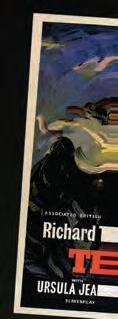




O
n May 16, 1943, a secret RAF squadron of 19 Avro Lancasters took off from an airfield in Lincolnshire to stage the most audacious night bombing raid of the Second World War. Under heavy fire, they flew just 60 feet above marbleblack water and dropped revolutionary bombs that bounced liked skimming stones before exploding right next to two massive hydroelectric dams and destroying them with an earthquake effect. The dams powered armaments factories and other industry crucial to Hitler in the Ruhr Valley.
The 113 handpicked young aviators of 617 Squadron were led with unerring confidence by a 24-year-old wing commander called Guy Gibson. “This squadron will either make history or be completely wiped out,” he commented beforehand. Most people considered its mission impossible, but, although eight Lancasters didn’t make it back and 53 of the airmen were killed, the Dambusters—as they became known— destroyed the dams and flew into ►
MAY 2013 53 READERSDIGEST.CO.UK
legend with their motto Après Moi Le Déluge. Gibson won a Victoria Cross and his colleagues shared five Distinguished Service Orders, ten Distinguished Flying Crosses and four bars, 11 Distinguished Flying Medals and two Conspicuous Gallantry Medals.
And that, as far as most people are concerned, is where the Dambusters story stops; part of a glorious but distant RAF history, and a film with a famous theme tune that gets dusted off on TV every Christmas.
But the RAF’s most famous squadron never went away: 617 flew many other sorties in the Second World War, as well as in Bosnia, Kosovo and Iraq. And now it’s playing a crucial role in the Afghanistan conflict—as I discovered when I joined the squadron in spring 2011 at Kandahar Airfield (known as KAF), during its first tour in the country.
Ringed with muscular brown mountains and white surveillance balloons, KAF sits on a dusty, colourless plain some 3,000 feet above sea level. It rumbles with the sound of jets, helicopter gunships and fleets of massive transport planes from the US, Canada, France and
other Nato countries. The squadron’s 26 aircrew and 102 engineers make up just a tiny part of the base’s 35,000-strong population. But they clocked up 1,400 vitally important flying hours during the three-month tour—flying in a week what they’d normally do in a month at RAF Lossiemouth, their base in Moray, Scotland. Instead of thundering Lancasters, these Dambusters were flying supersonic GR4 Tornado bombers, supporting Natoled troops on the ground with an array of laser-guided missiles and powerful surveillance equipment that gathered pinpoint intelligence of where IEDs (improvised explosive devices) had been buried. Unseen from 20,000 feet, they could also warn of Taliban movements.
Today’s 617 Squadron is very aware of its proud heritage. Aircrew have “Dambusters” emblazoned on their flying suits and RAF Lossiemouth has a big sign saying “Welcome to the Dambusters”, alongside a bouncing bomb.
“To be part of one of the most famous



◄
It works! Bouncing bomb trials before the Dams Raid
VC: the man who flew into legend
“For my guys to have all this history behind them is inspirational”
Wing Commander Keith Taylor (above)




bomber squadrons in the world is something special,” 29-year-old Flight Lieutenant Gary “Monty” Montgomery told me. His keen interest in the squadron’s history meant he’d volunteered to answer the hundreds of letters and emails about 617 that still come in from the public. “The Dams Raid was a remarkable feat,” he said. “The standout mission of taking it to the enemy.”
But taking it to the enemy in Afghanistan was just as likely to involve aerial photography as bombing runs, and the constant challenge facing aircrew was when to fire weapons—the political imperative being to avoid doing so if at all possible. Killing civilians wouldn’t help to win the peace and dropping huge amounts of munitions might suggest that Afghan forces wouldn’t be able to carry the fight by themselves when the Nato forces leave over the next couple of years.
“Laying down a show of force, making a lot of noise, is often just as effective,”
said Wing Commander Keith Taylor, 617’s 43-year-old leader, after returning from saving an American convoy ambushed by smallarms fire in a mountain valley south-west of Kabul. In true Dambusters style, he had screamed his jet in over the Taliban gunmen at 700 miles an hour just 200 feet off the ground. Faced with 29 tons of RAF metal hurtling at them out of nowhere, the insurgents scattered. As Taylor arched up into the sun to get out of the range of rocket-propelled grenades, he had a call on his radio from the troops on the ground: “Man, it was great to show the enemy that our dog is bigger than their dog.”
At a barbecue in Kandahar, Monty told his colleagues: “A huge amount has been written about Guy Gibson. He was a remarkable pilot, but this wasn’t just a one-person event. It was science, engineering, aircrew and ground-crew skills that came together; a big combined effort to do something outrageous. Just like now.”
The strain on jet engines from the heat and a fine dust as sharp as glass was immense at KAF. So, too, was the pressure on the complex computer, weapons, navigational and environmental systems in each £25m aircraft. And yet, thanks to the ground crew, the modern Dambusters only missed two
55 MAY 2013READERSDIGEST.CO.UK
CROWN COPYRIGHT 2011/FLT SERGEANT PAUL PEDEN (OPENING & ABOVE) ►
“Your body often weighs four or five times its normal weight”: Tornados in action

sorties. While the engineers worked in 45-degree heat to keep their jets airborne, they dodged 33 rockets fired into KAF by insurgents from four miles away. Ugly black shards of shrapnel became a grim souvenir on many a desk in the squadron building.
Like their forefathers, Afghanistan’s Dambusters were predominantly young— this was a first operational tour for most. Thirty-six-year-old Squadron Leader Ian “Rocksy” Sharrocks, who had flown Tornados in Iraq, described early sorties with the rookies as being “like taking ducklings to water”. The local airspace is very busy. It’s akin to five M25s stacked on top of each other, with jets, spy planes, helicopters, unmanned drones and tanker aircraft that refuel other planes mid-flight transiting in all directions in a huge complexity of manoeuvres run by a series of air-traffic controllers.
Rocksy’s first sortie on his tour was with 29-year-old Flight Lieutenant Caroline Day. Educated at Gordonstoun,
close to Lossiemouth, and Loughborough University, Caroline had once set her heart on becoming a fast jet pilot.
“All navigators do!” she laughed. And she passed all the aptitude tests except one. “My arms are too short! They measure your reach around the cockpit when you’re strapped into the front seat and I came out 2mm below the cut-off line.”
During her debut mission, Caroline would need to rely totally on her suite of navigation, surveillance and targeting screens at the back of the plane. That’s because it was a night mission, providing overwatch for a Special Forces “hardknock” visit to insurgent strongholds north and east of Kandahar.
With no moon, the sky over Afghanistan was an impenetrable black void. “It is scary,” Sharrocks warned. “There are big bad mountains out there, or you could be 20 feet away from a refuelling tanker and all you’ll see are the lights on its hose disappearing into the black.”
As they headed north towards Kabul, Sharrocks could see in his rear-view
56 READERSDIGEST.CO.UKMAY 2013
U .S. AIR FORCE PHOTO/ MAS TER SGT. L A NCE C HEUNG
◄
“The Dams Raid was a big, combined effort to do something outrageous. Just like now”

mirror his navigator’s bowed helmet as she juggled competing radio frequencies and worked out where their next tanker would be. In her headphones, a jangle of crews and air controllers and troops on the ground were all trying to tell somebody something all of the time—and it all sounded like it needed a response. The trick, Sharrocks advised, “is to work out which bits you need to listen to and which don’t affect you, and what the hell you need to do about it when they do.”

The old hand and the rookie: Ian Sharrocks and Caroline Day
A couple of times, when he sensed that his navigator was finding it tough, Sharrocks said, “Caroline, I’ll just take the radios for two minutes,” to allow her to catch up. It was important to support, but not undermine, her.
As the Special Forces team went in, Sharrocks and Day searched for any sign of Taliban reinforcements, ready to attack. None was detected and, mission completed, Sharrocks returned to
Kandahar with a navigator who’d grown in confidence.
“Show me an experienced operator who early on in the deployment says that this is easy, and I’ll show you a liar,” he commented afterwards.
Before I headed o to Afghanistan, I experienced the genuine thrill of flying in the back seat of a Tornado myself with 2 Squadron, which is based at RAF Marham, near King’s Lynn. We skimmed and slalomed 250 feet above the valleys of north Wales, seemingly close enough
57 MAY 2013READERSDIGEST.CO.UK
CRO WN COPYRIGHT 2011/SERGE A NT RO SS TILL Y, R AF
►
to lean out and touch the trees. Then it was back to Norfolk in 12 minutes and out over the Wash—with the jet’s afterburners flaming fuel to max up the thrust—to feel the G-force.
“Overcoming disorientation is at the heart of military flying,” says exDambuster pilot David “Noddy” Knowles, who won a Distinguished Flying Cross dodging missiles to bomb Saddam Hussein’s bunker in March 2003. “The world is frequently upside down. Your body often weighs four or five times its normal weight—or less than nothing. Great distances are consumed in seconds.”
Gone are the days of pilots sitting around in wicker armchairs waiting for a klaxon to sound. In Afghanistan, they’re summoned by computer for six-hour sorties. Throw in briefings, debriefings and an expectation to respond within minutes to protect troops who’ve come into contact with the enemy, and Tornado crews would not blink at a 16-hour day—making split-second decisions flying at 700mph, probably upside down and in the dark.
But where today’s Dambusters have the edge over their predecessors is in technology. The Second World War pilots had to rely largely on courage to hit their target. The bouncing bomb left a Lancaster at a sedate 220mph, 450 yards from the dams, with the planes in clear view of the enemy. Today’s pilots can fire inch-
Spot the Oxymoron…
perfect from height and distance. Shortly before I arrived at KAF, an insurgent commander about to mortar a Norwegian infantry patrol half-turned his head as if he’d heard something. He had. It was a six-foot-long supersonic Brimstone missile that Squadron Leader Chris Ball had fired from three miles away at an altitude of 16,000 feet. “He was a bad dude who would no longer be spreading his badness around,” said Ball.
But for all the changes in warfare since 1943, Keith Taylor believes that “for my guys to have all this history behind them is inspirational. I hope that the 70th anniversary of the squadron and its most famous raid will allow more people to learn about the exploits of the aircrew involved and link this to the work that the squadron continues to do in war zones today.”
A resurgence in interest in the Dambusters certainly looks on the cards. A remake of the 1955 movie, to be directed by Peter “Lord of the Rings” Jackson, is planned. A new play is also in the works.
“Those who fly with 617 are rightly proud to do so,” says military historian James Holland. “We, as a nation, should be proud of that heritage too. We forget it at our peril.” n
617: Going to War with Today’s Dambusters (£20) by Tim Bouquet is out now.
I saw this somewhat strange notice at the Loews Beach Hotel in Los Angeles. Submitted by Peter Paine, Wickham Skeith, Su olk

58 READERSDIGEST.CO.UKMAY 2013
◄
Prostate Problems?
Did you know that there is a herbal remedy available to help men with bladder symptoms of an enlarged prostate such as frequent urination, weak stream and having to get up at night for the toilet?












Prostasan®
Saw Palmetto capsules
A traditional herbal medicinal product used for the relief of lower urinary tract symptoms in men who have a confirmed diagnosis of benign prostatic hypertrophy (BPH), based on traditional use only. Always read the leaflet.
Available from health stores, pharmacies, we’re good for you
Available at larger & boots.com
Take a minute to check the health of your prostate. Visit www.avogel co.uk/prostate For more information call our helpline on 0845 608 5858.


2954

From afternoon tea with the Queen to a knees-up in the Highlands—this summer is packed with great events to attend. What are you waiting for?
BY LOLA BORG





BESTof BRITISH Summer


60 AFP/GETTY IMAGES



Summer

BUCKINGHAM PALACE GARDEN PARTY
There’s nothing more quintessentially British than standing on the lawn of Buckingham Palace on a warm, slightly sticky day, taking tea while trying to get a glimpse of the Queen’s hat. Or if there is, we can’t think of it.
Each summer for over 150 years, the monarch has held an open house. Some 8,000 people attend, dolled up as if attending a very smart wedding. Invites are mostly for the upstanding and those who have done their bit for charity, though the Palace stresses that these events are for people “from all walks of life”.
The Queen sails out at 4pm on the dot to the strains of “God Save the Queen”, accompanied by beefeaters and any members of the family who happen to be at home that day. She takes her tea segregated from the ordinary folk by a velvet rope while two brass bands play. And, by all accounts, the cucumber sandwiches are utterly delicious.
Should your ticket get lost in the post, you can always take a tour of the State Rooms at Buckingham Palace during the summer (rceltickets.com)
WHITSTABLE OYSTER FESTIVAL
As good an excuse as any to visit this pretty town in Kent, but the irony is that this ancient festival—revived in the 1980s—is not actually during the oyster season (which starts on September 1), but coincides with the annual holiday of the oyster dredgers on St James’s Day, the patron saint of fisherman.

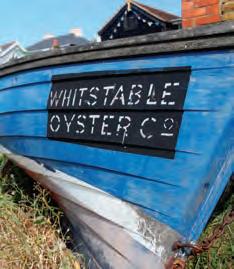

Choose from events such as the Landing of the Oysters, when the shellfish are blessed and paraded around town, and competitions to determine who can eat the most oysters. A good excuse for a knees-up.
Takes place in Whitstable, Kent, from July 27 to August 2. Many events are free (whitstableoysterfestival.com)

62 READERSDIGEST.CO.UK MAY 2013
COUNTRY COLLECTION-HOMER SYKES/ALAMY; JASON HAWKES/THE IMAGE BANK/GETTY IMAGES


DAWN OF THE SUMMER SOLSTICE, STONEHENGE
Every year at precisely 4.52am on June 21, when the sun rises and aligns over an enigmatic set of stones on Salisbury Plain (described as a “puzzle that has never been solved”), druids, pagans, wiccans, hippies, new-age travellers and curious onlookers gather to observe and maybe hug a stone or two. Yes, it’s the celebration of the summer solstice, meaning the longest day and shortest night—the point when the axial tilt of earth is most inclined towards the sun.
In short, it’s the start of the summer for druids and the rest of us too (even if the weather is distinctly soggy, as it was last
year), and an ancient time of celebration for more cultures than we have room to list. On Salisbury Plain, the monument field is open for revellers, although they can’t get too merry—there are very strict rules about how much alcohol is allowed on site.
As one druid said recently, “For some 5,000 years people have been making their way here to see the sun rise over Stonehenge, and they’ll probably be doing so in 5,000 years’ time. We come to be part of something much bigger than ourselves.” Quite.
Takes place at Stonehenge, Wiltshire. The site has special opening hours for the solstice—access is free, but certain conditions apply (english-heritage. org.uk)
GETTY IMAGES 63 READERSDIGEST.CO.UK MAY 2013 ►
COWAL HIGHLAND GAMES
Sporrans, kilts, bagpipes, massed piped bands marching through the streets to “Scotland the Brave” and just about every other Scottish cliché you can think of can all be seen in Cowal in August. And why would anyone want it any other way? It is, after all, the Cowal Highland Gathering— the largest Highland Games in the world. Events and competitions include those for Highland dancing, solo piping, drum majoring, wrestling and the so-called “heavy” events where muscled-up men in skirts get to chuck large objects around (otherwise known as tossing the caber or the hammer throw).
Dating from the 11th century (though wiped out after the defeat of Bonnie Prince Charlie at the Battle of Culloden), games take place all over the Highlands during the summer and have a practical origin: it was traditionally a way of selecting the best men for soldiering. There is, they say, no better way to immerse yourself in Scottish and Celtic heritage and traditions. At the end of events on Saturday is the “salute to the Chieftain”, when some 3,000 pipers and drummers play “Highland Laddie” in unison. Top that if you can. Takes place in Dunoon, west Scotland, from August 29–31. Entrance starts at £5 per day, or £1 for children (cowal gathering.com). For details of this and events all over Scotland this summer, go to visitscotland.com
DERRY/ LONDONDERRY CITY OF CULTURE





to celebrate the 100th anniversary of that most maudlin and ►
Gloss over the fact that there are still arguments over what to call the place (Derry or Londonderry—no one can agree, so it’s both), it’s our first UK city of culture, following on from the success of Glasgow and Liverpool as the European versions. So expect around 140 diverse cultural events in Northern Ireland’s walled city. In June, for example, you can take your pick from Elvis Costello (pictured), Status Quo or, at sunset on June 21, a massive outdoor choir performance to celebrate the 100th anniversary of that most maudlin and poignant of Irish songs, “Danny Boy”. Takes place throughout the year. For listings and details of all cultural events, visit cityofculture2013.com

64 READERSDIGEST.CO.UK MAY 2013
JAMES O’MARA

ELIZABETH LEYDEN/ALAMY
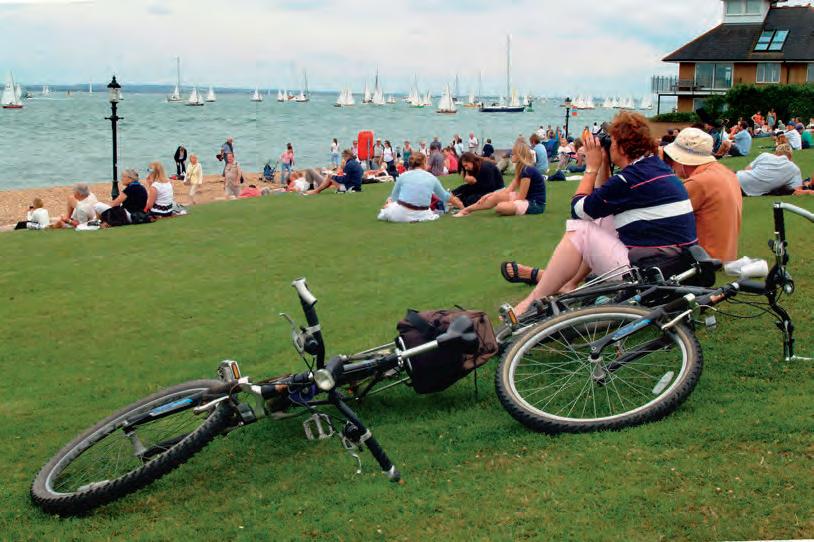
COWES WEEK, ISLE OF WIGHT
The biggest, longest-running and probably most civilised sailing regatta in the UK, Cowes brings a little flash of suntanned glamour to the Solent every August and is a magnet for sailors, celebrities, Olympians and the odd sprinkling of younger royals (Zara Phillips, usually).
Of course, you need a reasonable amount of money to race (your own boat, for starters), but visitors without any a nity for deck shoes can soak up the atmosphere (“really jolly”, they say), the party hoopla and—one of the highlights—fireworks

on the Friday night finale. Those without the right connections might miss out on invites to the exclusive cocktail gatherings around town, but the harbour and the River Medina are awfully pretty in sparkling sun. There’s free live music, it’s great for boat watching and—as the organisers point out—it’s one of the few major summer sporting events that’s totally free for spectators (the best vantage point is The Green). Expect a party atmosphere. Takes place at Cowes, Isle of Wight, on August
11–18. Entrance is free for spectators, but there are fees to enter individual sailing events (aam cowesweek. co.uk)
11–18. Entrance is free for spectators, but there are fees
66 VISITBRITAIN/GRANT PRITCHARD/GETTY IMAGES
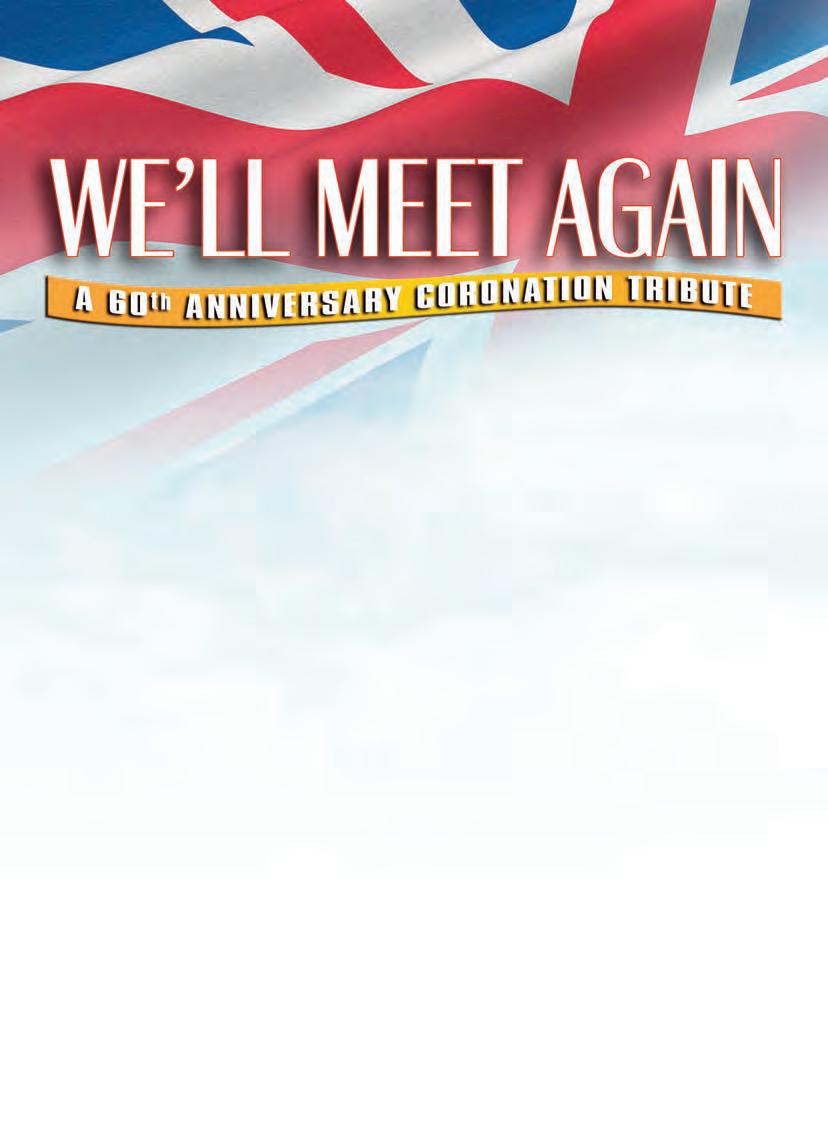


RAYMOND GUBBAYpresents


Presented by Star of TV, Stage and Screen JEAN BOHT
WE’LL MEET AGAIN
IN THE MOOD
SING SING SING
BEGIN THE BEGUINE
PACK UP YOUR TROUBLES
THE WHITE CLIFFS OF DOVER
IT’S A LONG WAY TO TIPPERARY
DON’T SIT UNDER THE APPLE TREE
Plus a traditional Singalong to favourites including

CALLING ALL WORKERS KNIGHTSBRIDGE MARCH UNDERNEATH THE ARCHES RUN RABBIT RUN HANG OUT THE WASHING ON THE SIEGFRIED LINE
and a special tribute to the 60th anniversary of the Queen’s Coronation
JERUSALEM THERE’LL ALWAYS BE AN ENGLAND NIMROD RULE, BRITANNIA! HORNPIPE LAND OF HOPE AND GLORY
Graham Bickley guest singer Gavin Sutherland conductor Capital Voices London / Manchester* Concert Orchestra
Sunday 12 May at 3.00pm Birmingham Symphony Hall 0121 345 0603
Sunday 19 May at 3.00pm Nottingham* Royal Concert Hall 0115 989 5555
Thursday 30 May at 7.30pm Liverpool* Philharmonic Hall 0151 709 3789
Sunday 2 June at 3.00pm Manchester* The Bridgewater Hall 0844 907 9000
Saturday 15 June at 7.30pm Southend Cliff’s Pavilion
www.raymondgubbay.co.uk
01702 351135
GROUPS 10 + SAVE 20 % on tickets
Call venue box office for details
NOTTING HILL CARNIVAL
It’s a little bit Port of Spain with a side order of Rio, and all on the streets of west London. Since 1966, this carnival has been held on August bank holiday weekend in the area of the capital that was the first home to Afro-Caribbean immigrants. Now the streets under the Westway strain for two days to contain over a million revellers.
If banging music, steel bands or gaudy carnival floats aren’t your thing, then go for the food—jerk chicken, rice and peas, and curried goat that many locals cook up and serve in their front gardens (the crowd gets through an estimated 16,000 coconuts, 400 goats and 25,000 bottles of rum). Huge, messy, chaotic and vibrant—but best experienced in small doses.
Takes place on August 25–26, centred around Westbourne Grove and Ladbroke Grove, London (thenottinghillcarnival. com). For tips on how to enjoy it, visit londonist.com


HAY-ON-WYE LITERARY FESTIVAL
Hay-on-Wye gets so much press coverage, you can pretty well follow events without going anywhere near a field in Wales. The original and the best (it’s now been exported all around the world), it lures in the starry names and is an unmissable weekend for literary bods. Some quarter of a million people now attend each year, and its website has many celebs waxing fulsomely (the favourite is always Bill Clinton’s “Woodstock for the mind”). Book early. Takes place at Hay-on-Wye, Powys, Wales, from May 23 to June 2. There’s no charge to the festival site, just for individual talks or events (hayfestival.com) n
If you know of a better summer event than the ones we’ve mentioned here, we’d love to hear about it. Send us an email—with a picture if possible —to theeditor@ readersdigest.co.uk.
NEXT MONTH: ROSE GAR DENS
68 READERSDIGEST.CO.UK MAY 2013
GETTY IMAGES
















Bring your car and sail away to the Isle of Man. Your holiday begins the moment you relax on board, before driving away to explore unspoilt countryside, a stunning coastline, fascinating culture and marvellous heritage attractions. Bring your sense of adventure. Leave with treasured memories. £67



















BOOK NOW, VISIT



















Terms and conditions apply. Subject to availability. *Valid for travel until 21.05.13. Via English ports journeys must be completed within 3 days on Mon, Tue, Wed or Thurs. Via Belfast and Dublin ports journeys must be completed within 4 days on any available sailing. A combination of ports should be considered. † Price is per person, based on two people sharing twin/double room, package includes return foot passenger sea travel, two nights bed and breakfast with a 3 course carvery meal each evening. Offer valid 23.03.13 to 23.05.13 and is based on a minimum 2 night stay. For payment by credit card, a fee of £3 applies per transaction, not per person.

TIME TO UNWIND BRING SOME BIGGEST SUITCASE BRING YOUR
LOVE OF HISTORY BRING YOUR WHOLE CREW BRING THE STEAM-PACKET.COM
AR
EACH WAY MIDWEEK *
BAGGAGE
BEST WESTERN PALACE HOTEL ♦ CASINO
breakfast & evening meals
-NIGHT
REAK BY FERR Y FRO M EACH †
C
+ TWO ADULTS FROM
NO
FEES 4 STAR
Including
£125 2
B
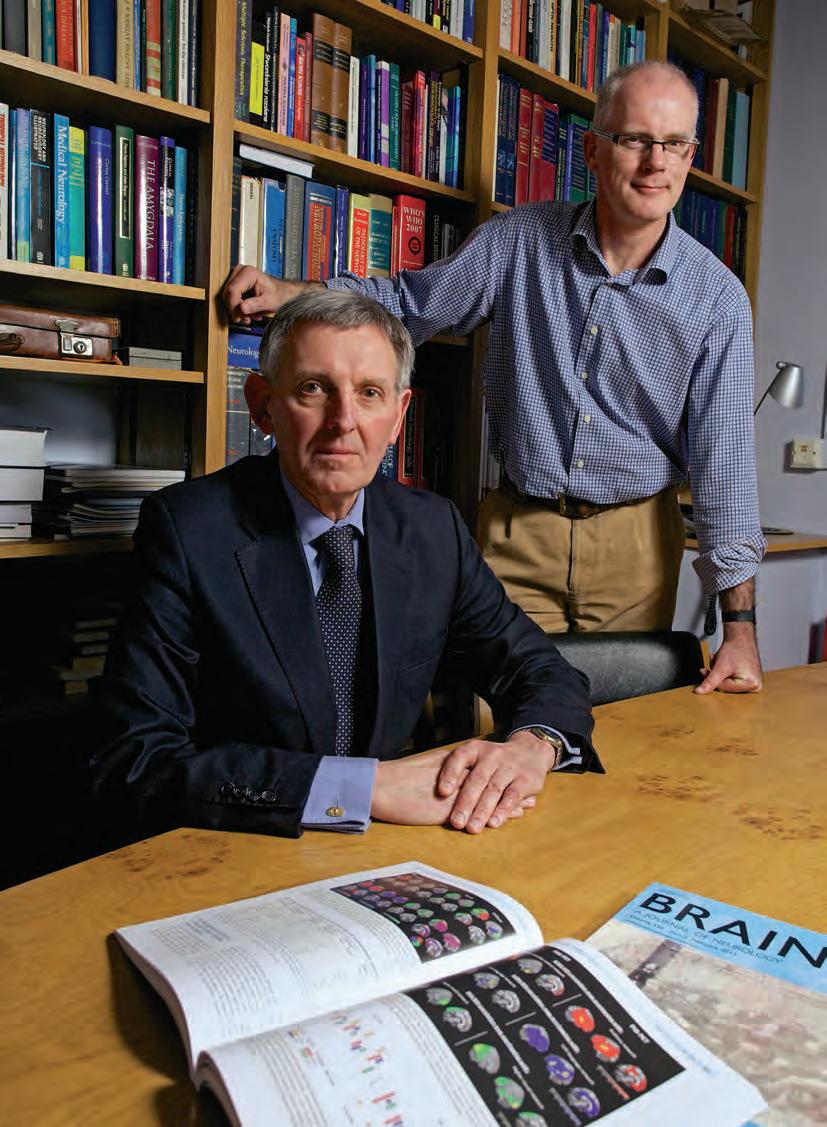
Multiple sclerosis blights the lives of 100,000 Britons. But, after years of dedicated research, a new drug is set to change all that
THE MEN WHO MS
TOOK ON
BY SUSANNAH HICKLING
When Bea Perks found out she had multiple sclerosis at the age of 31, all she could think of was a family friend who’d thrown herself from the top of an office block after being diagnosed with the disease back in the 1970s. “Everyone I knew with MS was in a wheelchair,” says Bea, a medical writer from Cambridge.
MS is incurable. In most cases, it starts with symptoms —known as relapses—that usually fade within weeks. But, as the years pass, it can progress to permanent physical and cognitive disability affecting most parts of the body.
During one of Bea’s relapses, she went numb from
71 MAY 2013READERSDIGEST.CO.UK
►
Medical pioneers: Professor Alastair Compston (left) and Dr Alasdair Coles
PHOTOGRAPHED BY PHIL SAYER
her feet to her chest. Then her balance started going and she had to hold on to tables and chairs when she moved around the office.
But when her GP referred her to Addenbrooke’s Hospital, she learned that researchers at the affiliated Cambridge University had been working on a drug to seriously combat MS. Bea was asked if she wanted to join a trial.
She weighed up the offer carefully. The drug caused temporary damage to the immune system and could bring on thyroid problems. She wouldn’t be able to have a baby for the three-year duration of the trial, and she and her husband Barnaby had wanted to start a family.
“Then I imagined myself disabled with children,” she says. She agreed to the trial.
Ten years on, Bea is so glad she did. She hasn’t had a single relapse and now has two children: Dora, five, and Charlie, four. In fact, Bea was one of the first recipients of alemtuzumab, a drug that could transform the lives of millions with MS if—as expected—it’s licensed for use in Europe and the US this summer. But without the tenacity of two doctors, this astonishing medical success story could have ended very differently.
In the 1970s, as a young neurologist in London, Alastair Compston had conducted pioneering research into the genetics of MS that strongly suggested it was an autoimmune condition: a disease in which a person’s immune system starts to attack parts of their body. But confusion reigned as to what triggered the disease and how it caused so much harm. It was only when Compston became a professor of neurology at Cambridge in
1989 that it struck him it might be worth coming at MS from a new angle.
The university had become the hub of research into monoclonal antibodies, drugs that are disguised so the body doesn’t reject them. “They’re stealth weapons of mass destruction,” says Compston. They were already being used to treat blood cancer and, more recently, diseases of the immune system. In each

case, their mission was to hunt down and kill T-cell lymphocytes, cells in the immune system that usually fight diseases but had started spraying friendly fire around the body.
This set Compston thinking. In MS, too, T-cell lymphocytes were the baddies. They attacked myelin, the coating on the nerve endings carrying messages from the brain to the body, causing inflammation and, ultimately, irreparable damage. Might it not be possible to pick off those troublesome T-cells, thereby preventing the disease from progressing?
One particular monoclonal antibody,
72 READERSDIGEST.CO.UKMAY 2013
◄
alemtuzumab (which Cambridge scientists named Campath-1H), seemed perfect for the job. A colleague who’d used it successfully to treat the blood-vessel disorder vasculitis, another autoimmune disease, agreed.
Compston was still a practising neurologist and took MS clinics at Addenbrooke’s, so he soon identified a suitable test patient. Early in 1991, Judith Paden,

“Everyone I knew with multiple sclerosis was in a wheelchair …I imagined myself disabled with children”
Bea Perks
a 45-year-old accountant who’d been diagnosed two years before, came to see him. She’d suffered a succession of frightening relapses. On one occasion, she’d gone blind in one eye and started seeing in black and white through the other. Walking was difficult and she no longer drove. She was afraid she’d have to stop working too. Her husband Tim had already given up his job to help her. Surely, she asked, there must be something that would slow the rate of decline?
Tentatively, he suggested Campath. It offered no guarantees, but within weeks of the treatment she felt energised, could
walk better and even booked a skiing holiday. Scans showed that the white spots in her brain—telltale signs of brain damage caused by MS—were appearing at a slower rate, perhaps even stopping.
Compston was thrilled and spent the next two years monitoring Judith until it was clear that Campath hadn’t caused her any serious side effects. Starting in 1994, he and a new colleague—27-yearold Dr Alasdair Coles—spent the next few years eagerly testing alemtuzumab on a group of people with the secondary progressive form of MS, who were becoming increasingly disabled.
The results were a crushing disappointment. Yes, the patients suffered fewer new relapses, but their long-term symptoms got worse. Even Judith Paden was now succumbing to disability—often, she couldn’t even walk up the stairs—and a second dose of Campath didn’t help.
The two colleagues felt as if they’d betrayed their patients. They saw them frequently and knew how this cruel disease was wrecking their lives. “However much you caution them that they’re a guinea pig, they hope,” says Compston.
Sitting in their lab one rainy afternoon in 1999, the two neurologists had never felt so low. Colleagues were advising them to forget about alemtuzumab. Then, as they went over the findings yet again, they had a eureka moment. The drug had worked. It had stopped the inflammation and the relapses that provoked. The fact that the patients had got worse could only mean one thing: inflammation was not the reason people with MS became disabled—this was a separate stage of the disease. Compston and Coles were ►
73 MAY 2013READERSDIGEST.CO.UK
treating the right people with the right drug, but at the wrong time.
With renewed confidence, they started prescribing alemtuzumab to patients in the early phase of MS. But when they asked pharmaceutical companies to fund a proper clinical trial, they got rejection after rejection. “The chances of it working are [tiny],” Jeff Buchalter, the visiting boss of US drug-development company ILEX Oncology, told them.
But as they saw him out, they bumped into an attractive young woman on her way to the MS clinic. Buchalter noticed her immediately.
“Here’s Mary, she’s had treatment,” Alasdair Coles said.
“It’s great. It’s made such a difference,” she enthused. Jeff Buchalter smiled. He agreed to fund a trial of more than 300 patients, which started in December 2002.
Bea Perks joined the trial the following year. After two courses of infusions, she, like the vast majority of others on alemtuzumab, had never felt better. Alastair Compston and Alasdair Coles felt vindicated. Then the bombshell dropped.
In June 2005, the Cambridge team received a call from Boston, where a parallel US trial of alemtuzumab was taking place. A man taking part had died of a rare blood-clotting disorder, immune thrombocytopenia (ITP), another immune-system disease. The trial was halted and all the participants had to be tested for the condition.
“If you have any unusual bruises…” the doctor began when Bea went for her regular consultation at Addenbrooke’s.
“It’s funny you should say that,” Bea replied. Her ITP was caught in time and steroids dealt with it, but six other

patients also had to be treated. Was it the end of the line for Campath?
Soon after, though, interim data showed that, when compared with beta interferon, the most effective MS drug available, alemtuzumab reduced relapses by 74 per cent and cut the risk of further disability by 71 per cent. Officials at the drug company had never seen anything like it. Alemtuzumab seemed capable of stopping MS in its tracks.
Compston and Coles moved from struggling to be heard to rapt attention at neurology conferences. In Boston in the spring of 2008, 3,000 people packed into an auditorium to listen to them. Afterwards, Coles was surrounded by delegates wanting to know more. It took him an hour to get out of the hall.
A bigger trial followed. The two doctors saw patients who not only had fewer relapses, but recovered bladder function after MS had made them incontinent, who could see and walk normally again, and who no longer struggled with foggy
74 READERSDIGEST.CO.UKMAY 2013
◄

“When I meet people with multiple sclerosis who haven’t had access to alemtuzumab, I feel blessed”
Tiger de Souza
thinking. As the years passed, the patients who’d had the drug were travelling, thriving in their careers, getting married and having kids—while many of those who had not were confined to wheelchairs.
Tiger de Souza, a 33-year-old charity worker from Ipswich, took part in the new trial after being diagnosed with MS in October 2008. Almost immediately, he felt better than he had for years. His bladder problems and poor concentration
at work vanished. Four years on, he’s still well and has a new baby. “When I meet people with MS who haven’t had access to alemtuzumab, I feel blessed,” he says.
In October 2011, the day before the last trial results were due, an official from the drug company phoned Compston and Coles. “I have good news,” he said.
“The rest was a blur,” remembers Coles. “It was just such a feeling of relief.” After 20 years of hard work, they’d cracked it. Alemtuzumab has side effects —up to a third of people suffered other autoimmune problems—but it’s clear that the benefits outweigh the risks. It’s the most effective drug in MS history.
For Alastair Compston, now 65, the sense of achievement is palpable. “I’ve seen so many people come past me whose lives have been blighted,” he says. “It’s very satisfying as one moves towards the end of a professional career to feel there’s an answer.” n
For more information on alemtuzumab, go to colescambridge.org.uk. People with MS should speak to their GP or neurologist.
Patent Nonsense
While the arrival of the telephone and penicillin changed the world, other inventions registered with the UK Patent O ce haven’t really caught on…
An ashtray that warns you to quit smoking. The verbal lecture is activated when you pick up the box of matches.
A horse-powered minibus. The horse walks along an endless conveyor-belt treadmill in the middle of the bus.
A ladder to enable spiders to climb out of a bath. This comprises a thin latex rubber strip that follows the inner contours of the tub.
Piping snow and ice balls from Antarctica to irrigate the Australian desert. The patent suggests that this will solve the world famine problem.
75 MAY 2013READERSDIGEST.CO.UK


Peter Davison
‘‘I remember...’’
…MY FIRST HOUSE. My family moved into a small terraced house in Streatham, London, just before I was born. I spent my early childhood just playing in the street.
But we moved out to Knaphill in Surrey when I was nine or ten because my father, an electrical engineer, had this dream of running a village shop. I think he wanted to be the centre of the community! I wasn’t really aware of this passion until suddenly my parents announced that we were all moving. It was fairly gut-wrenching because I had lots of friends.
…WATCHING POPEYE ON TV.
I absolutely believed that if I ate a tin of spinach, I would develop superhuman strength. So I asked my mother to buy some. It was the most disgusting thing in the world.
...QUITE REGULARLY DAMAGING VARIOUS PARTS OF THE GARDEN.
I created a wonderful tunnel system for my Dinky cars by digging right underneath the concrete path. My parents were fairly tolerant in that respect.
...I WAS ALMOST TERMINALLY SHY.
I wouldn’t say anything to anybody, and
I went bright red if spoken to. It’s quite a common problem with actors, actually. Going on stage is a way of escaping it.
...ENJOYING SCHOOL IMMENSELY.
But I didn’t really work hard. I had fun and was a member of the tape-recording club. We would make little radio sketches for the amusement of the rest of the school.
My report now reads like a classic: “I can’t see any point in this boy being here”; “He’s not living up to his potential.” Indeed, I failed most of my exams.
I had a very good English teacher, though. There was a Rotary Club publicspeaking competition, and every year it was won by a team from the local grammar schools (I was at the secondary modern). One year, my teacher said, “Why don’t you enter?” I wrote a ridiculous speech about philosophy, which I knew nothing about. But I delivered it with such passion that we won. After that, I came up with this insane idea of being an actor and joined an amateur-dramatic society.
…SEEING MY FIRST DEAD BODY. I left school halfway through sixth form (heaven knows why I thought I could do A levels when I only got three O levels), and
►

76 READERSDIGEST.CO.UK MAY 2013
EVERETT COLLECTION/REX FEATURES



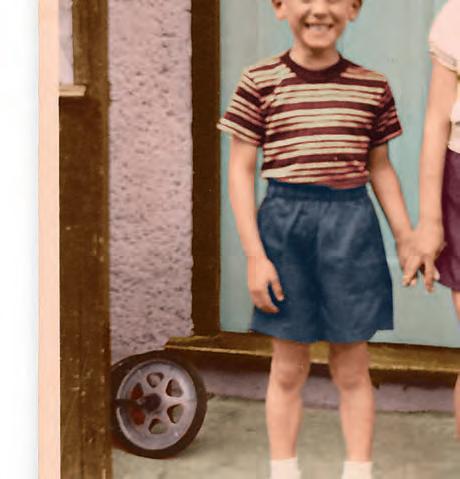





 Short and curly: Peter with sister Shirley at home; (inset) dad Claude and younger sister Barbara join them on the beach
Short and curly: Peter with sister Shirley at home; (inset) dad Claude and younger sister Barbara join them on the beach


“I wasn’t a party person; I came out of my shell gradually”
took a few part-time jobs. One of them was as a porter at Brookwood mental hospital. It wasn’t until I arrived that I realised I’d been assigned to the on-site mortuary as part of my duties.
The first time I went in, I found the attendant sitting on one of the slabs eating a sandwich. You think, How can anyone possibly do that? I later found out it was [a trick] he pulled on all new people!
Then I was shown how to wrap and wheel away a body on a stretcher. Once you’ve done it you get really quite glib about it. It’s bizarre.
...GETTING INTO THE CENTRAL SCHOOL OF SPEECH
&
DRAMA BY THE
SKIN OF MY TEETH. I auditioned, was put on a waiting list, and was called back a week or so before the term began. So I suddenly started drama school without any real idea what it entailed.
I got a flat o Goldhurst Terrace [south Hampstead]—a very damp basement flat with three other students. I wasn’t a party person; I came out of my shell gradually.
But it was a great time, it really was. You wish you could go back and relive it and have an even better time!
…WORKING WITH JEREMY IRONS ON THE ITV SERIES LOVE FOR LYDIA
. Before reading for the part of Tom, I went to a second-hand bookshop in Twickenham to find the original novel by H E Bates. I happened to find a first edition. Then I discovered at the audition that one of the producers was Richard Bates, who was H E Bates’s son. They said to me, “Have you read the book?” and I said, “Yeah, I went round the corner and I managed to find a first edition.” Bates was so impressed—I think it contributed to me getting the job.
We shot it in the long, hot summer of 1976—I was 25. Jeremy was sort of like the Brideshead character…very nice, but sort of from a di erent world—a world where people spoke terribly well and tied jumpers around their shoulders. You could tell he was going to be a star, because he seemed so much wiser than us.
78 READERSDIGEST.CO.UK MAY 2013
PERSONAL PHOTOS COURTESY OF PETER DAVISON
◄



...GETTING FAMOUS UNEXPECTEDLY.
I thought Love for Lydia was my big break, but before it came out, I got the part of Tristan in All Creatures Great and Small. We were up filming the end of the first series in Richmond, North Yorkshire, when the initial few episodes were broadcast. I went shopping in town and was suddenly aware that people were looking at me. I was followed around by these girls, and I went back to the hotel and told [co-star] Christopher Timothy. He said, “You must take me tomorrow!”
So we went back with the sole purpose of being recognised. But, of course, we had to walk round for about two-anda-half hours before anybody did!
…OVERCOMING SHYNESS. While I was working on All Creatures, I was asked to open a fete in Hawes, Wensleydale. They asked me to make a speech, and I remember saying to Robert Hardy, “I don’t know what I’m going to say!”
He told me, “Just be Tristan.”
So, in a way, I did. I kept imagining I was
this outgoing and gregarious character. It’s not exactly pretending to be somebody else; it’s slightly di erent. My 13-year-old son Louis used to go to this playgroup when he was little, and he wouldn’t talk to anyone. They thought he was an elective mute.
Then the Spider-Man film came out, and he decided he wanted to go to playgroup with a Spider-Man mask on. When we picked him up they said, “It’s extraordinary. He’s done nothing but talk all morning.”
...BEING THE FIRST ACTOR TO PLAY DOCTOR WHO WHO’D WATCHED IT GROWING UP. I watched the first five or six years of the show avidly. So when I started in 1981, I was daunted about following Patrick Troughton and William Hartnell. I was much younger than any previous Doctor and the producer said to me, “You need an outfit that’s eccentric but British.” It seemed to me that the cricket jersey was an obvious choice, since it was sportier, younger.
...BEING IN A PLANE WHEN IT GOT STRUCK BY LIGHTNING. The engine stopped! I’m flying to a Doctor Who convention in the mid-1980s, and ►
79 READERSDIGEST.CO.UK MAY 2013
SHERBOURNE/DAILY MAIL/REX FEATURES; PHOTOSHOT/HULTON ARCHIVE/GETTY IMAGES
JOHN
Who are you: (from left) one of the lads at drama school; as a young actor; with Robert Hardy in All Creatures; and as Doctor Who

I’m aware that it’s very bumpy. Then suddenly everything goes...not quiet, but swishy or something. And this very calm British Airways pilot comes on the Tannoy and says, “Nothing to worry about! But we’re just going to wait a few moments and restart the engines...”
My life didn’t flash before me. The moment when they said they’d lost power did feel like an eternity, but I don’t remember feeling I was going to die. Had we been plummeting out of the sky, I probably would have.
...MY FORTIETH BIRTHDAY WAS MORE MEMORABLE THAN MOST. My then-wife Sandra was away in California, but my daughter Georgia and the nanny were there. I was woken at 6am and told, “We’ve got a surprise for you.”
We drove down to Newbury and the surprise turned out to be a hot-air-balloon ride. We took o and it was quite plain to me that it was far too windy. I remember a guy on a walkie-talkie going, “We’re just flying over Gibbet’s Ridge, and we’re going
“I think I have an easy ability to make myself content”
like the clappers.” I thought, This is not right. We came in to land rather like an aircraft, bounced o the ground and went smack into the branches of a tall tree. We were stranded about 25 feet up.
I’ve always been a very good climber, thank God, and managed to escape and help guide everyone else down. But I had such a sense of it being a bonus that my life was carrying on after that. I’d dodged the bullet!
…A FUNNY CONNECTION WITH A NEW DOCTOR WHO.
I was in Spamalot in the West End, and Georgia said she was going to come and see the show, and she was bringing someone. It turned out to be David Tennant—she’d acted with him on an episode of Doctor Who.
I said, “Are you going out?” And she said, “Oh no, just friends”—which was true at that time.
He was actually very shy about getting round to asking her out. They’d meet up and go to the theatre, and it was quite a while before he plucked up
80 READERSDIGEST.CO.UK MAY 2013
◄
CATHERINE
As King Arthur in Spamalot
ASHMORE
the courage. She said, “I don’t understand. If he’s interested, why he doesn’t just ask me out? He’s playing Doctor Who!”
And I said, “It doesn’t really make any di erence. You’re either that sort of person or you’re not.” It doesn’t matter if you’re the most famous guy in the world if you’re self-e acing. I knew how he was feeling, of course! [Georgia and David are now married.]

with my life—my three children, my grandchildren and my wife Elizabeth.
With daughter
Georgia Mo ett


When my parents died, I was sad, but I worried for a while that I wasn’t more upset. I simply felt that this is what life is. Both of them lived until they were 81, and I remember making jokes at the funeral because they’d had a great life. My father was the same. He was born in Guyana and it’s something to do with the West Indian ethos.
...LEARNING TO ACCEPT THINGS
AS THEY ARE. I’ve had patches where things have gone wrong, but I think I have an easy ability to make myself content. I was in quite serious debt after my divorce in 1994 and had to move from a big house on the Thames to a rented flat in Belsize Park, yet I seemed to be as happy as I am now. And I’m very content
If something happened to my children, that would be very hard to cope with. And when I see unhappiness I know it’s not as simple as saying “Don’t be unhappy.” I just don’t think I’ve ever really taken myself too seriously. Life isn’t that serious, actually. ■ As told to Ellie Rose
Peter Davison stars in the new series of Law & Order: UK on ITV1 this summer.
Line of No Enquiry
As these court transcripts from constitutionclub.org demonstrate, the art of cross-examination hasn’t been mastered by everybody.
Lawyer “The youngest son, the 20-year-old, how old is he?”
Witness “He’s 20, much like your IQ.”
Lawyer “Can you describe the individual?”
Witness “He was about medium height and had a beard.”
Lawyer “Was this a male or a female?”
Witness “Unless the circus was in town, I’m going with male.”
Lawyer “All your responses must be oral, OK? What school did you go to?”
Witness “Oral…”
Lawyer “Doctor, how many of your autopsies have you performed on dead people?”
Witness “All of them. The live ones put up too much of a fight.”






81 READERSDIGEST.CO.UK MAY 2013
PETER DAZELEY/GETTYIMAGES; ITV/REX FEATURES
THE MAVERICK
“DON’T MOAN ABOUT THE WEATHER—IT’S MADE BRITAIN GREAT”

Broadcaster and ex-politican Michael Portillo says our damp and dreary climate has helped shape a successful nation
THE BRI T ISH LOVE T O COMPLAIN A B OU T T HE WEAT HER —in particular, that it’s always raining. In fact, London has less precipitation than Rome, Sydney and New York. But our weather does lurch from promisingly warm to wet and chilly with tedious regularity. Average rainfall in August—the height of our so-called summer—is 2.7 inches, only 0.6 inches less than January. Average temperatures in June are an unimpressive 18.6C.
This changeability isn’t something to moan about, though. It makes an important, positive contribution to our national character, happiness and prosperity.
Being so often let down by the weather has probably led to a certain national gloominess—we wallow in forebodings fulfilled, but, more attractively, it contributes to our stoicism. We show little surprise that the weather has betrayed us (washed out the last day of the cricket, for example). We shrug it off. With teeth gritted, we demonstrate that we’re determined not to be laid low by such calamities.
Our disappointing weather is famously an easy topic of conversation for Britons meeting for the first time. This has helped create and share our gift for

82 READERSDIGEST.CO.UK MAY 2013
ILLUSTRATED BY GREG CLARKE ►
Thinking di erently!
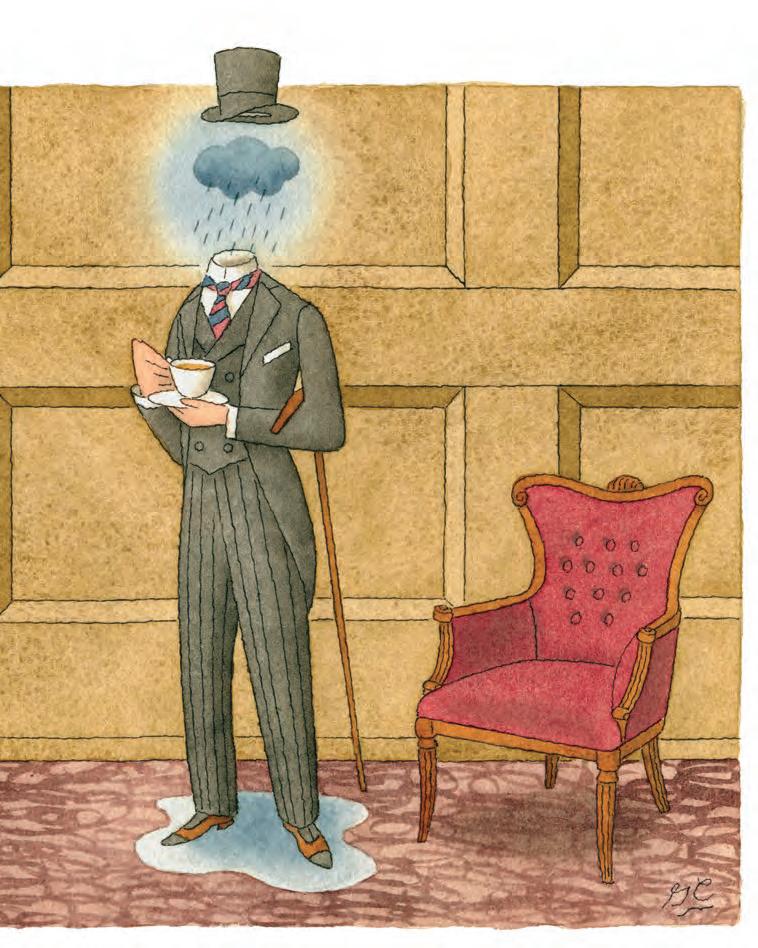
83 MAY 2013READERSDIGEST.CO.UK
sharp, self-deprecating humour and modesty—based around the generous, but not always accurate, assumption that everywhere else’s weather is better because it’s warmer.
For most British people most of the time, our weather is a nuisance rather than a disaster. Historically, we didn’t live on the edge of catastrophe, as those in hotter climates did, fearing drought or plagues of locusts.
This has brought economic success. Fairly dependable harvests enabled many living on the land to move beyond subsistence farming. With small surpluses, they could build up a little wealth. They were the consumers who fuelled the industrial revolution, a ready market for massproduced textiles. A fertile soil produced an excess of population, who could move from the land to the mills, creating the first industrial cities in the world. And, of course, the earliest mills were waterpowered, made possible by the even spread of rainfall across the year.
When we British moan about a ban on watering our flowers with a hosepipe, we show how little we understand the gift of rain
America’s Atlantic seaboard can be devastated by hurricanes. Chicagoans can scarcely set foot in the open air during the long winters in Illinois. With our relatively gentle weather, we don’t suffer from incinerated landscapes and homes, and we don’t need to divert investment into hurricane defences or the subterranean passages required to link buildings in the Windy City.
The climate’s lack of extremes may also have helped develop this nation’s preference for moderation. The hot-blooded Briton is virtually unknown in history or fiction. Following the Reformation, for instance, Queen Elizabeth I deliberately banished dogma from the public debate on religion, fearing that fanaticism would tear apart her realm. The so-called Protestant ethic that encouraged self-improvement and hard work was well received in a country that rarely had to endure a fierce midday sun.
We tend to moan when, rarely, snow disrupts our travel, and governments like to blame bad weather for poor economic-growth figures. But, in fact, weather rarely has much negative impact on our national output. In Australia, summer heat brings massive forest fires.
Talking of monarchs, could there have been a better demonstration to the world of British phlegm than the sight of the Queen in her eighties and her husband in his nineties enduring the downpour on deck, as their royal barge sailed down the Thames during the Diamond Jubilee? Without that typically inopportune
84 READERSDIGEST.CO.UK MAY 2013
◄
torrent she couldn’t have demonstrated her uncompromising concept of duty, nor could her subjects—lining the river banks like drowned rats—have displayed their unforced affection for the Crown. Other countries with more even climes must have gulped with envy as the heavens opened upon our party, regretting that their own festivals, held in dependably dry conditions, make no demands upon the national character.
Is the British weather the key to our character? Join the debate at facebook. com/readersdigestuk or email readersletters
and storms, our curiosity and spirit of adventure knew no bounds, so we became a country of empire and great explorers.
@readersdigest. co.uk
Where populations battle the heat —in north Africa, say—their houses face inwards. The family lives around a cool courtyard or garden. In Britain, we build big windows on the outside, hungry for light and heat. Our architecture, I believe, makes us more ostentatious, less private or modest. It has made us more open to strangers, with new ideas and different ways of thinking—we are more tolerant of immigrants, for instance, than most other countries. And since, as an island nation, we had to master the sea, with its frequent gales
There’s a danger that our weather makes us culturally insensitive. When I go to Spain, I want it to be hot and dry. But my hosts long for cool, wet days. They anxiously measure rainfall and inspect their drought-shrunken crops. When we British moan about a ban on watering our flowers with a hosepipe, we show how little we understand the gift of rain.
I’ve spent recent summers travelling through Britain, having for many years spurned this country for warmer climes. Our fecund and gentle landscape has impressed me, not just of itself, but as a metaphor for Britishness too. Our climate is the making of this nature and, with it, the making of us. n
Michael Portillo’s second series of Great Continental Railway Journeys starts on BBC2 later this year.
Things You’ve Never Wanted to Know
The internet is a wealth of information. But, as the unanswered questions on answers.com demonstrate, there are still limits on human knowledge
What would happen to animals without energy?
When a guy says he loves you with exclamation marks, what does that mean?
What are the e ects of drinking mint tea without sugar?
What is Ringo Starr’s IQ?
How reliable is the prediction?
85 MAY 2013READERSDIGEST.CO.UK
A Life Less Ordinary
Crazed drug binges, near-fatal car accidents —even a brief career as a teenage gigolo… American ex-pat Billy Zima has lived a wild life. So why is he now making furniture with teenagers in Scotland?
CARVING OUT A FUTURE
 BY GILLY SMITH PHOTOGRAPHED BY MURDO MACLEOD
BY GILLY SMITH PHOTOGRAPHED BY MURDO MACLEOD
86 ◄ READERSDIGEST.CO.UKMAY 2013

Nineteen-year-old “JD” strode into Billy Zima’s art class. He was two weeks late for a three-month course and his reputation preceded him: the young man from Edinburgh was a well-known substance abuser, heavy drinker, criminal and hard nut. There was a palpable tension among the other youngsters in the room.
JD glared at them and took mental control. Everyone instantly became subservient to him—heads down, no eye contact. JD saw Billy and walked right up to him. When he got close enough, a right jab laced out like lightning. JD pulled the punch about a quarter of an inch from Billy’s chin, wanting to see him flinch.
But Billy barely moved. Instead, he looked at JD and said “Nice jab, pal… Hey, what do you think of this?” He pointed at a painting in a book and a perplexed JD turned to study it. One by one, the class started chipping in with their thoughts on the art and soon, amid the animated discussion, JD’s macho display was all but forgotten.
“JD used that jab as a defensive mechanism,” says Billy. “By not responding, I gained his respect. But it’s a move that got him excluded from school.”
JD is just one of hundreds of troubled youngsters in eastern Scotland who’ve
been won over by Billy, a charismatic 51-year-old American. For the past five years, his Identity Artworks course— a social-enterprise business that he runs in schools, with young-offender groups and in job centres—has been combining art and positive psychology to inspire 12- to 24-year-olds to turn their lives around.
Billy’s methods are anything but conventional. He draws kids in with fun, creative activities such as furniture making and revamping (or “pimping”) recycled chairs and tables. Then, when they’re absorbed in that, he shows them Edvard Munch’s The Scream “and we talk about emotions. These guys haven’t talked about this stuff before, but they will while we’re sanding down and painting furniture.”
Still, it would probably all still be a little airy-fairy for tough Scottish kids if anyone but Billy ran the course. He knows what tough means. The journey from his childhood in Portage, Indiana, to Scotland has been a long one and if he hadn’t stopped at key points and made some crucial changes in his life, he might not have made it at all.
By the age of 13, his parents’ bitter divorce, and constant verbal and mental abuse from his father—whose failed advertising agency had lost the family’s fortune—had tipped him into a maelstrom of drink and drugs.
“I was heading off into the shed on my own to do whatever I could get hold of—from Colombian red bud cannabis to LSD,” he says. “No one helped me. My mother, bless her heart, did what she could, but she was trying to survive
88 READERSDIGEST.CO.UKMAY 2013
herself. I ignored my studies and by the time I was 14, I went for a year without speaking. I had nothing to say.”
When he did eventually talk, the hallucinogens overloaded an already active imagination. “I would say things like ‘Does the air smell green?’ Or ‘If I went blind and then got fresh eyes from someone and it turned out that they’d murdered someone, does that make me a murderer?’ ”
Billy was marked down as an oddball, drifted out of school and by the summer of 1977, was working as a swimming-pool cleaner in Nashville, earning extra money where he could. He blushes a little: like something out of a film, this tanned, six-packed 16-yearold would do whatever his bored housewife bosses demanded in return for a bag of grass.
It sounds almost glamorous but, says Billy, “I was in a dark place—suicidal. These women didn’t care who I was. I didn’t care what I was doing as long as I got the drugs.”
He was also taking advantage of the drunks on the local pool tables. “When someone’s playing pool like that, you’re going to beat him,” he says. “I was making a couple of hundred dollars a night. Then word got out that there was this guy hustling and I found a
gun to my head and was told I’d better get out of town.”
By the time he was 18, he’d been stabbed, shot and imprisoned, and was regularly blacking out. A near-fatal car crash should have been the final straw. “I was drunk and high with a couple of guys, and all I remember was going through the windscreen. My scalp ►



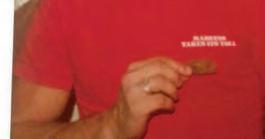



“As a teenager, I didn’t care what I was doing as long as I got the drugs”


89 MAY 2013READERSDIGEST.CO.UK
COURTESY OF BILLY ZIMA
was torn back here,” he says, taking off his pork pie hat to reveal a huge scar across the brow of his bald head.
But, despite three months in hospital and six months’ recuperation at his father’s home in Indiana, it took another drama to finally convince him to change his habits. “It was 10 o’clock in the morning and everyone was out. My buddy comes over with some angel dust, animal tranquillisers, tabs, LSD, and half an hour later we’re flying.
“He says, ‘Let’s do some target practice’ and he pulls out a .357 Magnum. He has an old beat-up cop car and we’re heading out into cornfields, driving 100 miles an hour with the windows down and Van Halen on the radio singing ‘Runnin’ with the Devil’.
“Suddenly, a river comes up, I bounce off the roof and this Magnum is banging down on my knee and I pull the trigger. Time stops. If that gun had been loaded, I’d literally have shot myself in the foot. I realised how close I was to ruining everything in my life.”
This is what Billy calls the “Magnum Moment”—the instant he knew he had to take a new direction in life now , or maybe end up dead. When he finally completed high school, he put together a portfolio that won him a place to study sculpture at the highly acclaimed School of the Art Institute of Chicago.
There was no support from home. “When I told my dad I was going to be an artist, he said, ‘Are you a faggot, Willard?’ ” But by the age of 28, Billy had become successful enough to spend a year being mentored at Newcastle Polytechnic by Gilbert Ward, one of the best stone-carvers in Europe.
The turning point in Billy’s life came when he almost shot himself with a .357 Magnum—now all the youngsters on his course are encouraged to find “Magnum Moments” of their own

It was here that he met his wife, an ethical banker whom he's been with ever since. With this new stability in his life, he was able to piece together how his youth had taken such crazy turns.
“I read a lot about positive psychology and realised that my negative thoughts were the problem. I helped myself by exercising mindfulness—thinking about what I was thinking about.”
90 ◄ RE A DER S DIGE S T. C O.UK MAY 2013

For the next few years, Billy worked as a joiner in Chicago to fund his sculpting and, as a side job, taught art to underprivileged kids. It was clear the kids enjoyed the creativity, but it also ignited a rare flicker of self-belief and hope. So, when he and his wife eventually moved to Edinburgh to be near her family, Billy decided to combine art and mindful thinking to create Identity Artworks.
A great story-teller, Billy uses tales of his mad exploits to win kids over, but they soon realise the moral of his story. A key moment in his courses is when he gives them a card with “The Magnum Moment” written on it and tells them to look at it every time they might be about to make the wrong life choice.
“I recently met a group of eight young guys on the street who were drinking
91 ► MAY 2013RE A DER S DIGE S T. C O.UK
heavily,” he says. “I suggested that they checked out what we were doing at Identity. Three came along and I gave them the card. It saved them from getting involved in a failed armed robbery for which their friend got four years. That’s £720,000 on prison time that the Government isn’t spending. If you change your mind consciously enough, your habits will change. You need to ask yourself, ‘What’s the greatest thing I didn’t do?’ ”
Over the rest of his course, even JD began to lower his guard. “One day, I noticed him carving the word ‘STAY’ into his chair,” says Billy. “I asked him what it meant. ‘I can stay being what everyone thinks I am,’ he said. ‘Or I can be something else.’ It was a really profound thing that he’d noticed there.”
JD has long since disappeared and Billy’s not sure what became of him. “These kids change their mobile numbers
all the time.” But he does hear about what’s happened to several of his students—such as when a Magnum Moment has helped them quit smoking or drinking. Last autumn, Billy worked with eight youngsters from Bannockburn High School, Stirling, who were classed as at high risk of exclusion. Six months later, they’re all still in classes. “The school played a huge part in that, but I know the moment those kids changed their minds.”
Identity Artworks was granted charitable status in January, so Billy can now get funding to train staff and roll out his programmes across Scotland. That could mean many more young people who will stay out of jail, grow up to tell their kids about the Magnum Moment—and to ask them, “What’s the greatest thing you didn’t do?” n.
To find out more, or to donate to Billy’s work, go to identityartworks.co.uk
Eurovision Stinkers

Bonnie Tyler (above) is representing the UK in this month’s Eurovision Song Contest, which, sadly, looks like continuing our recent run of bad form.
Britain once dominated Eurovision, with top-two placings in the Sixties and
Seventies (the worst was eight points for Kenneth McKellar’s ballad A Man Without Love in 1966, which placed ninth).
The rot really set in with Mary Ann by Black Lace in 1979, an odd folk pastiche that only got to 42 in the charts and was accused of plagiarism. From then on, despite the occasional triumph, it’s been a story of manufactured tunes and dodgy lyrics (Samantha Janus’s
1991 entry A Message to Your Heart takes the wooden spoon with, “Every day is a compromise for a grain of corn.”)
But at least Bonnie can’t do any worse than Jemini (below), who scored “nul points” in 2003 with Cry Baby (though our recent invasion of Iraq hadn’t endeared us to many).

92 RE A DER S DIGE S T. C O.UK MAY 2013
◄




Thousands of women worldwide have discovered that Menopace® provides comprehensive nutritional support, specially formulated by Vitabiotics’ experts. Menopace® is ideal whether or not you are on HRT and can be taken for as long as required.
Menopace® Tablets is the original combination of micronutrients including vitamin B6 which contributes to the regulation of hormonal activity.
Menopace® Plus Botanicals is a dual pack with Menopace® Original tablets plus a botanical tablet providing soya isoflavones, flaxseed lignans, sage and green tea.
Menopace® with Calcium is a convenient all-in-one formula with calcium, vitamin D3 and magnesium, which contribute to the maintenance of normal bone health.
Menopace® Night includes all the support Menopace® Original plus soya isoflavones, chamomile, hops extract and 5-HTP.
Menopace® Red Clover provides 40mg of the highly researched Menoflavon® isoflavones, plus 25mg polyphenols from green tea extract. Red Clover is ideal taken alongside any other product in the Menopace® range.



















From Boots, Superdrug, Holland & Barrett, Lloydspharmacy, supermarkets, chemists, GNC, health stores & www.menopace.com Vitamin supplements may benefit those with nutritionally inadequate diets. † Professor Beckett is not cited in the capacity of a health professional, but as a product inventor and former Chairman of Vitabiotics. www.womens-health-concern.org Menopace® Supports: supports women going through a premature menopause www.daisynetwork.org.uk trusted no.1 for the menopause you at your best

What the Tree Saw
From historical horrors to painted panoramas, trees have stood watch over events big and small. Here, they break their silence
The Great Yew at Runnymede
“I saw K I ng J ohn grovel” ►
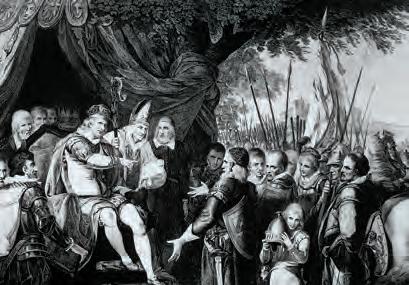
They call the yew the “sacred tree”. We can regenerate ourselves and live, some say, for 9,000 years, so people have long thought we’re a little mystical. I’m halfway through my third millennium and once watched as the druids performed bizarre rites under my boughs. Then early Saxon kings thought—because I’m safe on an island in the Thames—that I’d be a worthy yew to be
94
ROBIN BUSH/OXFORD SCIENTIFIC/GETTY IMAGES; TIME & LIFE PICTURES/GETTY IMAGES

next to while they consulted their runes. Humans are so superstitious. In 1160, they built a convent beside me and, 50 years later, when England’s barons had had enough of tyrannical King John, my island seemed the perfect neutral place to make him sign their momentous “charter of liberties”.
It enshrined everyone’s right to due legal process, rather than justice being the whim of the monarch.
I’ll always remember that June day. The 25 barons in their chain mail, obviously pleased with themselves. The king suspiciously examining the document. And the bishops in their

Next to the oak tree runs the camp’s motto (Work Makes One Free). When Auschwitz was liberated on January 27, 1945, most of the prisoners had already been killed by the Nazis
◄
fancy robes who’d come to observe. Well, I’d been around too long to be surprised when King John reneged on the agreement. But one day the Magna Carta would be regarded as a “sacred text” of English law.
Later, I witnessed still more history. Henry VIII occasionally wooed young
Anne Boleyn in the shade beneath my branches, when he was staying at Windsor. How gently he caressed the soft, pale neck he later put to the sword. Luckily, the yew’s ageing branches can grow back down into the soil, where they are blind to the world of men.

The Polish Oak at the Gates
“i sUrViVed THe HeLL of AUsCHWiTZ”


As any carpenter will tell you, my wood is dense. I can be split, but I don’t give way easily. I’m a hardy Polish oak accustomed to harsh winters. My unhappy fate is that I grow at the entrance to a Polish army barracks. After the German invasion in September 1939, I thought the barracks had been abandoned. But I was wrong.
On May 1, 1940, I saw Commandant Rudolf Höss arrive, flanked by SS guards. On his face was the satisfied smile of the conqueror. Less than two months later, the first victims passed beneath my branches: 728 Polish political detainees.
RichaRd Melloul; gettY iMages
Other prisoners poured in, mostly Jews, from the four corners of Europe. “Juden!”—I’d never heard that word before. And I’d never heard the music of Johann Strauss. Each morning, the able-bodied prisoners marched to work past an orchestra of fellow inmates forced to play joyful tunes. Later, they returned exhausted, carrying those who had died, and were marched back in to the strains of “The Blue Danube”. My bark has healing properties as an astringent, but what use would that have been? I’ve breathed the grey smoke from the crematoriums and lived on ground filled with the ashes of 1,100,000 people. I might be the only tree that has ever wanted to run away. ►
97 MAY 2013 READERSDIGEST.CO.UK

Renoir lived at Les Collettes with his wife Aline and three sons for 11 years; (right) his painting “Paysage aux Collettes” (“Landscape at Les Collettes”).


The Oak in Pennsylvania
“i TooK BULLeTs AT THe BATTLe of GeTTYsBUrG”
i’ve heard park workers on Culp’s Hill near Gettysburg tell people that we oaks are Witness Trees. From July 1 to 3, 1863, I not only saw the bloody fighting where some 50,000 men were killed or wounded, but I got shot myself.
The historic Pennsylvania battle inspired Abraham Lincoln’s famous address. Almost 150 years went by. At some point about ten years ago, I fell, and I rested on a boulder near Culp’s Hill summit. In 2011, park staff decided to cut me open. They were shocked when their chainsaw hit lead. Astonished, the historians decided to put the bullet-ridden parts of me into a museum and to allow the rest of my body to remain on the slope—a testament to American history.
98 “PaYsage auX collettes”, PieRRe-auguste RenoiR/MusÉe RenoiR, cagnes-suR-MeR, dÉPÔt du MusÉe d’oRsaY/PhotogRaPhY BeRnaRd oliVes
chaRles Kogod/coRBis (Right)
The Provence Olive Tree
“i posed for renoir”

it was my wild nature that attracted the attention of Auguste Renoir. Four centuries of wind and sun in Provence had given me my twisted shape, but I would have died if Auguste had not saved me. On June 28, 1907, he bought the land beneath my roots at Les Collettes, preventing a horticulturist from cutting down all the trees to plant carnations. Auguste was 66 years old at the time, already walking like an old man. His sons carried him to sit at my roots with his easel.

One day, I heard him complaining about me to his art dealer Ambroise Vollard: “Olive trees are such a swine to paint,” he said. “If you knew the trouble I’ve had with this one. It has so many colours, not grey at all. Its tiny leaves have really made me sweat! One gust of wind and the tonality changes.” Although Auguste griped about me, we were brothers. His fingers, deformed by rheumatism, looked like my branches. He’s long gone, but I haven’t forgotten our time together.

►
Richa R d Melloul (left); Roge RViollet/ u lls tein Bild
The Dorset Sycamore
“i GAVe sHeLTer To THe ToLpUddLe MArTYrs”
You’d think that a sycamore on a typical village green, deep in English farming country, would have had an uneventful existence. And for the first 200 years of my life, there wasn’t much going on in Tolpuddle. Then all hell broke loose.
It all began in 1832 with whispered conversations among a group of six farm labourers, who used me as a regular meeting place. It tore at my heart to hear them describe their desperate poverty. They could barely feed their families, and now the landowners were about to cut their meagre wages again.
They formed a group called the Friendly Society of Agricultural Labourers to try to safeguard their



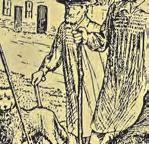


interests. It sounded innocent enough to me, but the local squire got wind of it and, worried by the recent French Revolution, had the six arrested for swearing an unlawful oath. The tearful scenes around me when they got seven years’ hard labour in Australia were terrible. But thousands marched through London in protest, and the men were eventually pardoned.
The village hosts a trade-union rally every summer in their memory. Workers have their snapshots taken beside me, but it’s a relief when they all go home and peace returns. I’m not as young as I used to be. ■

100
“i saW King John gRoVel” and “i gaVe shelteR to the tolPuddle MaRtYRs” Both WRitten BY Monica PoRteR EDWARD PARKER/ALAMY




“I never ask God for a win”: Matt Baker on his home ground

102 READERSDIGEST.CO.UKMAY 2013

Football isn’t always the most saintly of sports —yet there are 180 chaplains ministering to Britain’s professional clubs. So what’s it like to be one of them?
HALLOWED BE THY GAME
BY MARC WEBBER PHOTOGRAPHED BY BARRY MARSDEN
Reverend Matt Baker, 44, is Charlton Athletic chaplain and pastoral support director for Sports Chaplaincy UK
I was a local church minister when the chaplaincy at Charlton came up in 1999. As a lifelong fan, being o ered such a role at the club I love was an honour. And though it would take up a lot of spare time, my wife let me do it—providing I didn’t go to away games.
My time at Charlton has been a rollercoaster ride. I was there when we were in the Premier League, but also when sta were made redundant after relegation.
With all that change comes the constant need to build new relationships. I’m lucky to have worked with managers who see the benefit of my work. When Chris Powell was appointed boss in January 2011, one of the first things he did was introduce me to the 18 new players we signed, and give training-session time for me to talk to them.
It’s often been the players who’ve initiated ways to bring faith into their routines. Former defender Linvoy Primus, for instance, asked if I’d lead prayers before a match. (I never ask God for a win!) We now also o er
103 MAY 2013READERSDIGEST.CO.UK
►
◄ a prayer room for Muslim players. In my Sports Chaplaincy UK role, o ering advice and training to the other 150 or so football chaplains in England, I see an increasing appetite for our work.

“WE NOW ALSO OFFER A PRAYER ROOM FOR MUSLIM PLAYERS”
There was no better example of that than when Fabrice Muamba of Bolton Wanderers had a cardiac arrest at [Tottenham’s ground] White Hart Lane last March. There was an instant call for prayers on Twitter and I know Bolton’s chaplain was praised by club o cials for the support he o ered sta and fans in coming to terms with what they’d witnessed.
Reverend Pete Horlock, 36, has been Manchester City chaplain since January 2012
It’s fair to say I came to City at just the right moment. A few months later, the team won the FA Cup for the first time in 40 years. The next year, they won the Premier League for the first time ever. Not bad timing!
I was the minister at Holy Trinity Platt church in Rusholme when I heard
Sports Chaplaincy UK recently organised a symposium on mental wellbeing in sport. Being a top athlete can be a lonely thing, however loved you are by fans. We feel there’s work to be done to support players with the whirl of emotions they can experience in their career.
One of the best plaudits I had was from ex-Charlton defender Eddie Youds. He was out of action for months with an injury in 2002 and I used to pop in and chat to him while he was with the physio. Years later, after he’d retired from the game, I bumped into him in a pub.
“This is my good Christian friend Matt,” he joked to his friends. But then he was entirely serious. “When you’re in football, everyone wants to know you, but it can be tough and lonely when you get injured. I really appreciated the fact that Matt came in and talked to me every time I was in that treatment room.”
about the job. The old City chaplain was o to Oman and, given that I’d already been a chaplain for Greater Manchester Police and the Royal Marines, he asked if I’d take over. I grew up in Hampshire and supported Arsenal as a child, but I thought, Why not?
Like that of most club chaplains, mine is a voluntary role endorsed by the Church of England. I can give City about four to six hours a week, visiting the training ground and the stadium, including on match days.
Mostly, I operate an
open-door policy, just letting sta and players know I’m there if they want to talk to a neutral person not too close to their particular situation.
One of the stewards might tell me about a stressful time they’re having in one of their other jobs. Someone else may have su ered a bereavement. Money doesn’t make everyday problems go away, so the footballers have the same issues as all of us. They worry about their friends and family, or may have days where they’re ►
104 READERSDIGEST.CO.UKMAY 2013
◄



 City priest: but Pete Horlock isn’t there to “push God”
City priest: but Pete Horlock isn’t there to “push God”
◄ concerned about their future. And I’m sure the majority of us are glad we’re not televised during our working day, with pundits chewing over our mistakes.
You have to build trust with everyone at the club, show them you’re not there to “push God”. And everything said is confidential—that’s especially important in a media bubble like a football club.
good idea to attempt some songs in French, Spanish and Italian. [Argentinian]

“I CAN’T AGREE WITH THE IDEA THAT FOOTBALL PLAYERS ARE BADLY BEHAVED”
Pablo Zabaleta
kindly tried to badly behaved.
My other roles include scattering-of-ashes services for Citysupporting families, organising educational talks for the academy players and writing for the match-day programme. I also accompany the players on community visits, like Christmas trips to see children in hospitals.
There are some things I’d never have imagined doing: singing carols with some friends to the players during their Christmas lunch, for example. As so many languages are spoken at the club, I thought it would be a
kindly tried to teach us “Silent Night” in Spanish. He was very patient, but we were awful! I can’t agree with the idea that football players are badly behaved. There are just one or two incidents on the pitch that the press blow out of proportion. The huge majority of footballers are decent, and give everything they can to their team.
They and the club also understand their responsibility to the wider community. City runs after-school football sessions and healthy-eating programmes in schools. It supports the Factory Youth Zone, a state-of-the-art facility that provides sports, media and arts activities for young people.
Do I think more people believe in God if their team is successful? Not necessarily, but I suspect some fans thought Sergio Agüero was a god when he scored the last-gasp goal that won us the title!



Let us play: Alan Comfort— fan, ex-player and now chaplain

Reverend Alan Comfort, 48, is the chaplain for Leyton Orient
I’m one of two chaplains in English professional football who were once full-time players. The other is Peter Hart at Walsall. Although not brought up with a church background, I became captivated by God while at Cambridge United in the mid-1980s. I was inspired by the way my teammate Graham Daniels spoke about
106 READERSDIGEST.CO.UKMAY 2013

his life having a purpose beyond the game because he was a Christian. It was a good job he thought like that—I’d been bought as a winger to replace him! His contract wasn’t renewed six months later and his playing career ended. But I watched as he went to bible college and a whole new future opened up for him. As well as having had spells in non-league coaching, he’s now director of Christians in Sport.
Around that time, I went to church for the first time.
I didn’t know anything about faith, but I did know my life was a mixture of good and bad. There had been moments when I’d done things I knew had hurt people, like being sent home in disgrace from an England Youth trip to Norway after going out with two other players the night before an international.
Though it sounds unbelievable, during that church visit my life changed. Knowing I had God’s forgiveness through



Jesus was a wonderful thing and I felt so di erent.
Some people in football made fun of me because of my new faith, but being a Christian was such an important part of who I’d become that I couldn’t keep it hidden. And I went on to have five years of relative success as a player—including for Orient between 1986 and 1989. I ended up playing for an excellent Middlesbrough team in the old Second Division. Then
107 ► MAY 2013READERSDIGEST.CO.UK
PHOTOGRAPHED BY SIMON O’CONNOR
injury struck and, aged 25, my career ended.
Fortunately, God can be trusted even when everything seems to be going wrong and the vicar at my church in Durham, recognised my passion for God and suggested I become a priest.
I scraped through the selection process, but I hadn’t studied properly since my O levels, so theological college was frightening. I was suddenly surrounded by so many people who understood this world. I used to look out of the windows during lectures and dream of playing football again!
The other students were all very kind. Perhaps hobbling round the pitch for the college team helped to even things out a bit.
I became a vicar in east London and, four years after playing in Leyton Orient’s 1989 play-o final success against Wrexham, I returned to the club as its chaplain. I was back home.
I was still training with the first team until about six years ago. It was a great way to get alongside players and show them I understood their world—especially when they saw their vicar could still play a little, even if he couldn’t run!
Being an ex-pro means I have some understanding of what they’re going through and what not to do. For example, I will never pass comment on a player’s performance—not to anyone.
I’m there to listen to
sta , and I’m also part of the team that supports schoolboy players and their relatives to see what can be done if issues at home or school are a ecting their family life or football.
I’ve taken the funerals of many Orient fans and relatives have said how pleased they are I have o ciated, not only because I’m club chaplain, but also because the deceased may have watched me playing back in the day.
Orient is a very special club full of precious people who need to know God loves them. I hope that many of them realise this because of the work I’m privileged to be doing.
■
Go to:
sportschaplaincy.org.uk

Survival of the Fittest
Smoking a cigarette is risky enough without adding fuel to the fire. Two 24-year-olds (identified as a man and a woman) invaded the property of an oil-drilling company located 75 miles east of Dallas, Texas. For reasons unknown, they decided that four oil-storage units were ideal platforms for a 3am cigarette break. The duo climbed on top and lit up, thereby setting the tank and themselves on fire. The emergency services thankfully saved their lives, and also prevented worse tragedy by throwing large foam blankets over the remaining oil tanks. Entrant in this year’s Darwin Awards, which honours people “who protect our gene pool by making the ultimate sacrifice of their own lives in an extraordinarily idiotic manner, thereby improving our species’ chances of long-term survival” (this pair only merited an “honorable mention”, as they survived).





108 READERSDIGEST.CO.UKMAY 2013
◄
Replace your 3.5Kw night storage heater with 1.9Kw Fischer storage heater. Use less, save more...
Beat the rising energy costs: ACT NOW!
The unique Fischer 40mm chamotte clay core for extended storage, reducing energy wastage.
www.fischer-futureheat.co.uk Call 0116 242 5533 Reduction*





clay core 40mm Slimline low input SMART STORAGE HEATERS
• Instant heating for one room or the whole house
• High quality German engineering, economical 40mm fire clay
• Heatwise, Economy 7, Solar PV compatible
• Direct from the manufacturer


• Easy to install - uses 13 amp, modern 110mm slimline design
• Control your room temperature away from the radiator for total comfort with our modern, wireless, intelligent room thermostat
• Use less energy and have more control over your heat
Request your free catalogue now!
Complete details below, cut out and pop into an envelope with this address:
FREEPOST FISCHER FUTURE HEAT No stamp or address required.
Or call us on 0116 242 5533, quoting RD31APR
Name: Tel/Mob: Address: Post Code: Your information will not be sold to a third party.
* When you replace your 3.5Kw night storage heater with 1.9Kw Fischer storage heater. Controllable Heat
Fischer-Future Heat UK, The Waterfront, 19-20 North Mills, Leicester, LE3 5DH
HOW TO…
BY LINDA GRAY

1,001 Things
EVERYONE SHOULD KNOW
Welcome to the pages that help make life simpler, easier and— we hope—more fun!


How to WOW A CROWD
We may only have seconds —a glance at a snapshot is enough for strangers to form a judgement about us, says psychology professor Sam Gosling, author of Snoop (£8.99). So how can we make sure they’re seeing the best of us rather than the worst?


It’s not about being the life and soul. “It’s all about the fit,” says Gosling, who points out that a chatterbox won’t be welcome on a silent retreat. But there are specific signs people pick up on, so try the following. Smile. There’s no downside. “You’ll come over as




110
CAREYHOPE/E+/GETTY IMAGES
agreeable, extrovert, open and emotionally stable,” claims Gosling.
Go smart rather than casual. Wearing a shirt rather than a T means that people are likely to think better of you. And dig out your suit if you’re o to an interview, because neatness and formality are associated with motivation. “Messy people are assumed to be less conscientious, though it’s not necessarily true,” Gosling points out.
How to AVOID APP TRAPS
an unrealistically high opinion
Shake hands firmly if you’re female. Women who do are thought (correctly) to be more open to experience. Don’t check your reflection in public. People who do this often tend to be narcissists, who have an unrealistically high opinion of themselves.
Wear distinctive accessories. show that you’re creative imaginative and welcome new ideas. But beware slogans and political symbols that people mistrust, though they’re usually an honest reflection of the wearer’s beliefs.

Wear distinctive They creative imaginative ideas. But beware honest reflection if you’re tired. A sparky,
Skip parties if you’re tired. high-energy attitude is what’s required, or other guests may dismiss you as dull.

Angry Birds can peck holes in parents’ wallets if children who play the game sign up for pricey extras without asking. But it’s not the only app (a mini computer program on smartphones and tablets) that comes with a hidden cost.

Many free apps are teasers that give away minimal content before charging or bombarding users with o ers of expensive extras or upgrades. Others ask if you’re happy to receive texts and then charge you for the privilege. A few are rogue programs that deduct a tenner or more every time the app is opened. And, helpful as they are, even satnav apps can rack up huge data charges if used abroad.
To protect your bank balance, only download apps from the store on your phone or tablet, and take time to read the customer reviews. If you’re after a satnav, pick one that works o ine and without 3G (users recommend Navfree and Sygic). Check your mobile bill regularly and report unexpected charges. “Any costs charged to a phone must be clear,” says phone-charge regulator PhonepayPlus (phonepayplus.org.uk).
“If they aren’t, inform your network provider and contact us.”
» For more about the best apps on the market, see p140 ►
111 MAY 2013READERSDIGEST.CO.UK
We advanced a cool £2.6bn last year to family and friends, ranging from a fiver for a workmate’s sandwich to an average of £13,000 loaned to o spring. But it’s important to protect yourself. “Discuss what it’s for, how it’ll be paid back and what will happen if things go wrong,” says Michelle Highman of moneyeducation charity Credit Action. “And never lend more than you can a ord to lose.”
How to MAKE GINGER BEER How to LEND TO A FRIEND
Think twice if someone is always in debt (because they need expert help) or you’re asked to subsidise a business (if the bank doesn’t rate it, why should you?). Even helping kids with their mortgage can have drawbacks—if salaries and house prices stay static, will they ever manage on their own?
If you decide to go ahead, a legal agreement is a must. You can download one free from biztree. com, but it’s best to use a solicitor if the sum is high. The contract should cover the amount, the repayment term, any interest charged and security of some kind. Don’t allow anyone, however close, to default completely. “It teaches them not to take responsibility,” says Highman. And as bad debts can ruin relationships, it could be better to give rather than lend. You might even have the blessing of the taxman, who ignores gifts to children of up to £3,000 a year.


There’s nothing like a glass of fiery, ever-so-slightly alcoholic ginger beer, as long as you’re prepared to...
1. Buy a ginger-beer “plant”. It’s easiest to find one online— try scobybiotec.com (£8.95).
2. Grate 5–8cm of fresh ginger and mix with 50g ginger-beer plant, 100g sugar, and 1 litre still water. Cover loosely and leave at room temperature until foam forms on the surface. Strain, add sugar or lemon juice if wanted, then pour into a plastic bottle (not glass in case it explodes) and chill for a few days.

3. Rinse the ginger-beer plant, cover with water and keep it in a jar in the fridge until next time. Can’t wait? Then blend 100g of fresh ginger with a lemon and a cup of water. Drain, add 100g sugar to the pulp and chill. To serve, add a litre of soda water or posh lemonade and filter into a jug for a tangy ginger refresher.
IMAGE SOURCE/GETTY IMAGES 1,001 THINGS
How to RUN A HOLIDAY LET

A nice little earner in a sunny place is a tempting alternative to the derisory interest banks pay on savings—and you can rake in more than the rent. UK residents can claim tax allowances for holiday lets anywhere in the EU, so a Grecian villa or Paris flat is as eligible as a cottage in Cornwall. There are even tax breaks for caravans on holiday sites.
June to September, so that should do nicely.

For maximum returns, look for a property with a pool or by the sea, in the mountains, or near a lively city. According to holiday website ownersdirect.co.uk, Tenerife, Majorca, Portugal and Barcelona are the most soughtafter destinations, with St Ives in Cornwall topping the UK charts. If you need a mortgage, make sure a week’s peak-season rent will cover a month’s repayments. There are 12 prime weeks from

If your bolthole is classed as a furnished holiday let, you can set capital costs against profits. To qualify, the property has to be available to rent for 210 days a year and let for 105 at the market rate, for up to a month at a time. Too much hassle? Then let it out in the usual way and claim for renewals and repairs.
You’ll also need to factor in management fees of up to 20% of the rent, unless you want to deal with tenants yourself. But you could save on marketing by advertising on Owners Direct (£149 for six months) and making your own Facebook page and website (promotemyplace.com, £69 pa). Then cross your fingers and hope that the bookings roll in, so you can holiday for free.
113 MAY 2013READERSDIGEST.CO.UK
►
GARY JOHN NORMAN/ICONICA/GETTY IMAGES


How to PLANT BULLET-PROOF BASKETS
Baskets need watering daily, twice as often in a hot spell, so pick drought-resistant plants if that’s unlikely to happen. Garden writer Jonathan Edwards suggests geraniums, pink and purple verbena, tropical portulaca and lemon-yellow bidens, with silvery cineraria, helichrysum and mint leaf for foliage. Busy lizzies will bounce back after a dry spell, but opt for the New Guinea variety as others su er from blight.
Get a big basket, ideally 16in in diameter, line it with polythene, a ready-made mould, or moss (even an old jumper will do) and put a saucer at the bottom to act as a reservoir. Mix compost with water-retaining granules and fill the basket about a third of the way up. Punch holes in the liner at intervals and push the plants through to create a cascade of flowers. Repeat with another layer of compost mix and plants, stopping about an inch from the top, then cover the surface with the remaining plants.
WHAT YOUR CARDIOLOGIST WON’T TELL YOU
● Bad breath won’t harm your heart. Sorry—I know I told you to floss, but though we believed there was a link between gum disease and heart damage that’s now thought unlikely. We may have got it wrong because gum disease is a side e ect of diabetes and smoking, and they do cause heart disease.
● Your heart can heal itself. It’s a slow process—the peak rate for cell turnover is just 1% a year. But if research to stimulate renewal is successful, we may be able to repair damaged tissue months or even years after a heart attack.
● It’s possible to be too fit. Overdoing endurance sports such as marathon running and competitive cycling can scar the heart and cause an erratic heartbeat—so watch out, Wiggo!
● I know how to raise your blood pressure. If I take it, it can be 10–30mmHG higher than if you monitor it at home. We call it White Coat Syndrome, because the stress of seeing a doctor can make patients’ blood pressure zoom.
● Look at the tape measure, not the scales. Storing fat round the middle can triple
SOURCES: AMERICAN HEART ASSOCIATION; BRITISH CARDIOVASCULAR SOCIETY; BRITISH HEART FOUNDATION; KAROLINSKA INSTITUTE, SWEDEN; US NATIONAL CANCER INSTITUTE
114 READERSDIGEST.CO.UK MAY 2013 1,001 THINGS
the risk of heart attack even if your weight is healthy. Your waist should measure no more than half your height, even less if you’re generally skinny.
● Don’t ignore goosebumps. A feeling of dread can be a warning of a heart attack, because not all are the kind you see on Casualty. If you’re apprehensive, dizzy and out of breath with jaw or back pain, take an aspirin. If you’re not better in 15 minutes, ring 999.
● I eat salmon, not steak. It’s packed with omega-3 fatty acids, which keep blood vessels healthy and reduce the risk of clots. Unlike meat, which is high in saturated fat.
● Smokers can cut their risk by 600% simply by calling the NHS stop smoking service on 0800 022 4 332 and taking their advice. Smokers are up to six times more likely to have a heart attack than those who don’t. And smoking is even more lethal for women, who are 25% more vulnerable than men.
● Why are you yawning?
Consistently poor
sleep—trouble dropping o , disturbed nights and waking up feeling groggy—can be early signs of heart failure. Everyone has the odd bad night, but if you’ve forgotten what it’s like to sleep through, see your GP.
● I need to know about your sex life. Erection problems, common in men over 50, are a red-flag symptom for heart disease. They’re often caused by narrowing of the arteries, which takes longer to a ect the heart where the blood vessels are bigger.

● Snoring threatens more than your relationship.
Thundering snores followed by gasps are symptoms of sleep apnoea, which raises the risk of heart attack, so don’t ignore it. It’s easily treated by a CPAP machine to regulate breathing, available on the NHS.
● Your heart needs friends too.
Loneliness can increase the risk of heart disease—so pick up the phone. n
115
RIVER NORTH PHOTOGRAPHY/GETTY IMAGES (B AS K ET); GPOINTSTUDIO/E+/GETTY IMAGES
MEDICINE WITH MAX PEMBERTON
We

didn’t want to dish out tablets, but was there an option?
he’d soon need nursing care
Mr Brown was admitted to the ward because his wife could no longer cope with him at home. In his 50s, tall and sprightly, he had developed Creutzfeldt-Jakob disease (CJD), a degenerative brain disease that results in rapidly progressing dementia. Ultimately it’s fatal, and there is no known cure. He could now barely communicate, save for a few clichéd phrases. His wife had been determined to care for him for as long as possible, despite warnings from the GP that he’d soon need nursing care as his physical health got worse. But, ultimately, it was the change in his behaviour that led to his admission.
worse. But, ultimately, it was anything else about his life,
“What have you done to Mr Brown?”
I asked, astonished

happening around him, but he believed that he was at work, on a removals job. His wife had woken up countless times to find him emptying the lounge, lugging heavy bits of furniture out onto the front lawn in the dead of night. Once, when she left him for a few hours to go shopping, he managed to clear the entire downstairs, and she came home to find the washing machine in the drive with an armchair balanced on top.
Although unable to recall anything else about his life, deep in the recesses of his mind Mr Brown must have remembered the job he’d done day in and day out for nearly 40 years—since the age of 16 he’d been a removals man. Now, in his confused state, he was oblivious to where he was, what time it was, or what was

the drive with an armchair home and, given how dangerous




We delayed starting the another

The case seemed bleak. There was little chance that Mr Brown would be able to return home and, given how dangerous his behaviour was, it seemed our only option was to sedate him for the rest of his limited life. We delayed starting the tablets, hoping another solution would present itself. Which it did.
I’d become used to regular interruptions from Mr Brown—he’d come into my o ce and try to remove things.
I’d become used to regular interruptions from o ce and try to remove things.

116 READERSDIGEST.CO.UK MAY 2013
GEORGE DOYLE/STOCKBYTE/GETTY IMAGES
But one day, I noticed I hadn’t been disturbed. From the corridor, I could see into the lounge where Mr Brown was quietly sitting in a chair with a cup of tea, peacefully watching TV. I’d never seen him sit down for more than a brief moment.
Marsha, one of the nurses on the ward, was sitting next to him. Occasionally, he’d begin to stand up and she’d say something to him and he’d sit down again. I waved her over. “What have you done to Mr Brown?” I asked, astonished.



“It was so simple in the end,” she replied. “I just watched him for a while and then it suddenly struck me.” As we were talking, Mr Brown went to stand up. “It’s a tea break,” Marsha called to him and he looked over, nodded and sat back down. “He thinks he’s on a never-ending removals job, but it occurred to me that even removals men have breaks,” she said. “You just tell him he’s on a tea break and he stops trying to move things.”
Over time, Mr Brown got used to his more sedentary lifestyle and stopped being so restless. Eventually, he was discharged back home, where his wife, using the simple words, “It’s a tea break”, cared for him for another nine months before he died.
Max Pemberton is a hospital doctor and author. His most recent book is The Doctor Will See You Now


THE MYTH? SUGAR MAKES CHILDREN HYPERACTIVE MEDICAL MYTHS— BUSTED!





IS IT TRUE? Sorry,
but no, this simply isn’t true. There is no evidence to show that foods or drinks that are high in sugar have any real e ect on children’s behaviour. In fact, over 12 double-blind, randomised controlled trials have been done specifically looking at this claim, and in all of them no link was found between sugar intake and children’s behaviour. Interestingly, in one study, parents were told that their children had been given sugar when in fact they hadn’t, and parents noted that their children were more hyperactive anyway!

WHERE DID THE MYTH COME FROM? It’s possible that it’s based on research into artificial colours used in sugary, fizzy drinks. There is some evidence to suggest that certain additives (E numbers) used in sugary drinks and sweets can cause hyperactivity in susceptible children. It seems that this might have caused confusion and people wrongly attributed the hyperactivity to the sugar, rather than the additives.
SO THERE’S NOTHING TO WORRY ABOUT?
While your children might not like this, there are still plenty of reasons to watch the amount of sugar they eat. Although sugar might not a ect a child’s behaviour, it does still a ect their teeth, and it’s linked to obesity and even diabetes. ■
117 MAY 2013READERSDIGEST.CO.UK
ILLUSTRATED BY DAVIDHUMPHRIES.COM
HEALTH WITH SUSANNAH HICKLING

From Richard III to Usain Bolt: ten facts about scoliosis

born with it too, or it can occur as you age—sometimes because of arthritis or osteoporosis.
2. It’s not as rare as you might think. Three or four in every thousand children need specialist supervision for a curved or twisted spine. And as many as 70 per cent of the over-65s are thought to have it.
3. It a ects girls more than boys. The adolescent variety is around ten times more common in girls. So Richard was unlucky—and not just on the battlefield.
1. Scoliosis, a sideways curvature of the spine, can happen at any age. Analysis of Richard III’s skeleton after it was discovered in a Leicester car park suggested that his scoliosis started in adolescence. But you can be …give up smoking. Lung cancer has now overtaken breast cancer as the deadliest form of the disease among women in the UK. The reason? Probably the rise in smoking among young women in the 1960s and 1970s. …take folic acid. Babies born to mums who take folic acid before conception and in early pregnancy are 40 per cent less likely to be autistic, a Norwegian study of 85,000 children has suggested. …exercise regularly. It cuts your risk of developing ovarian cancer by half, according to Australian research based on 1,000 women.
4. You can still have babies. In most cases there are no problems conceiving or having a natural birth.
GOOD REASONS FOR WOMEN TO…
5. Scoliosis isn’t caused by carrying heavy school bags. Nor is too much sport to blame. In most cases no one knows why it happens.
6. The problem often goes away on its own. Or at least it does in children. As many as 90 per cent of
GENNA NACCACHE/TAXI/GETTY IMAGES
118 READERSDIGEST.CO.UK MAY 2013

MEN’S HEALTH DYING FOR A DRINK
According to the O ce of National Statistics, twice as many men as women die from alcohol-related diseases.
If you find that a sobering thought and want to have control over your drinking, try these six challenges:
● Keep an honest drink diary—seeing your habits put down in black and white helps.
● Avoid rounds.
● Avoid mixing your drinks.
● Order a soft drink now and again—try it as your first drink.
● Have one favourite drink and stop for the night.
● Don’t drink for a set period—say, a week or a month.
If you can’t meet one of these challenges, ask yourself why alcohol is so important in your life. If the challenge has you beat, you may need to stop drinking rather than simply cut down. You certainly need to talk to someone like your GP or Drinkline on 0800 917 8282. There’s more on men’s health from the Men’s Health Forum on malehealth.co.uk. And the forum is also testing a new online GP service at manmot. co.uk. It’s free and, if you wish, anonymous. We’d love to know what Reader’s Digest readers think of it.

children with the condition don’t need any treatment.
7. Surgery isn’t the only option. Having metalwork inserted in your spine will straighten your back once it’s bent, but wearing a plaster cast can help a child’s spine grow straight naturally. And there are plenty of ways of improving posture and relieving pain in adults, including osteopathy and physiotherapy.
8. Scoliosis doesn’t necessarily give you grief. Children with the condition don’t usually su er pain. Adults, though, often need painkillers for backache.
Find out more from the Scoliosis Association, sauk.org.uk.


9. You can still play sport.
9. You can still play sport. In fact, staying fit and flexible is crucial. Plus you want to keep those back muscles strong. Walking, swimming, Pilates and yoga are all good for scoliosis—although you might want to take advice before launching into horseriding, skydiving or rugby.
“It’s not you, it’s me”: Is it time to think about your relationship with drink? or have had scoliosis.
10. Many famous people have or have had scoliosis. They include Liza Minnelli, Sarah Michelle Gellar, Elizabeth Taylor and Usain “Lightning” Bolt, the fastest man on the planet. Proof, if you needed it, that scoliosis is no barrier to success.


and Usain “Lightning” Bolt, the
MARC GRIMBERG/THE IMAGE BANK/GETTY IMAGES
► 119
EASY WAYS TO HEALTHY BLOOD SUGAR QUACK QUESTION
If you have diabetes or prediabetes (or just want to cut your risk), try these ways of keeping your blood sugar and insulin levels in check. They’re all backed by research. Just relax. Spend ten minutes a day tensing and then relaxing your muscles, from your toes to your eyes.
Walk every day. Cover six miles a week and your risk of dying from anything diabetes-related plummets by 40 per cent. Get enough zzzs. Sleep deprivation has a dramatic e ect on blood sugar and insulin levels.

Go to bed and wake up at the same time every day. Make yours a decaf. If you can’t resist that croissant for breakfast, drink deca einated co ee—it counters the blood sugar rise from sweet treats. Do resistance training. Try to fit in at least one session a week. The greater your muscle mass, the more e ciently your body burns glucose (sugar).
Watch a funny film.
Laugh at a comedy after eating and you’ll be laughing on the blood sugar front. Try soba noodles. This popular Japanese lunch is made of buckwheat, which may lower blood-glucose levels by up to 19 per cent. It’s full of fibre, well known for its bloodglucose benefits.
We all know about “good” HDL and “bad” LDL cholesterol, but how many of us have heard of the “ugly” type? No, nothing to do with Clint Eastwood, but everything to do with often overlooked “remnant” cholesterol, caused by high levels of triglycerides—a type of fat in your blood.
UGLY TRUTH

A new Danish study of 73,000 people has shown that those with raised ugly cholesterol have triple the risk of ischaemic heart disease. This is the leading cause of death worldwide and is a result of the
QWhich is better, juice or fruit?
A Fruit. You’re more likely to develop Type 2 diabetes if you drink a glass of juice a day, probably because of the sugar load. On the other hand, eating three or more servings of whole fruit a day seems to reduce the risk.
For more information, go to diabetes. org.uk.
arteries narrowing and hardening. Remnant cholesterol is now the prime suspect in this process.
So, given that high levels of the ugly stu are linked to obesity, losing weight is a no-brainer. Along with that, take moderate exercise at least five times a week. Giving up smoking will also bring triglycerides down, as will cutting right back on the booze—a major factor in increased levels. And try to eat more fatty fish like mackerel, sardines and salmon which are rich in Omega-3 fatty acids. ■
120 HEALTH FOR MORE ON HEALTH, GO TO READERSDIGEST.CO.UK/HEALTH
?
Accidental Discovery Lowers Blood Pressure
Zona Plus® – what they found
Fighter pilots have to withstand huge G-forces in combat or they risk blacking out. This presented a major dilemma for flight researchers… and they spent a lot of money trying to solve the problem. Their research worked and the pilots were able to fly aggressively.
But they also found an amazing discovery. They discovered that some of the pilots now had lower blood pressure!
Curious researchers sought to find out why this was true. This research led to the development of the Zona Plus® therapy device, where the researchers discovered a unique ‘triggering point’ that multiplies the normal response of isometric handgrip exercise into substantial blood pressure drops.
NOw APPROVED IN THE UK
Doctors scoffed, then changed their minds
Early research showed such a large blood pressure drop that doctors didn’t believe the small studies. However, as more and more studies were published they all showed similar results. Finally, after several years of results, the Zona Plus® is becoming accepted around the world. The clinical evidence just keeps getting better, with 15 independently published journal articles showing significant blood pressure drops in 95% of patients.*

How does the Zona Plus® work?

“As long as I can remember I’ve always had elevated blood pressure. My blood pressure peaked at very high levels particularly in stressful situations. Being quite an energetic character I took it as God given. I did take my medication, but only reluctantly and not very consistently. Shortly after starting with my Zona Plus Therapy, my blood pressure dropped so quickly that I felt dizzy and had ringing in my ears. It turned out that my body just needed time to adjust to a lower blood pressure. Now my blood pressure is normal, I feel great and take better care of myself. Zona Plus helped me to finally achieve healthy blood pressure levels but also increased my resolve to do something about this disease.” Mr J Blattner
We all know aerobic exercise is good for the heart and typically drops blood pressure a little, but the Zona Plus® isometric therapy done just 12 minutes a day decreases blood pressure by two to three times that much. You can see a video at www.zonahealth.co.uk
The therapy produces physiological changes in the body, including improved endothelial function, nitric oxide production and improved vagal tone. The combined effect causes lower blood pressure.
The therapy takes just 12 minutes a day, five times a week, and your results are guaranteed.**
The Zona Plus® gives you the Power To Change® your life, try it enjoy the benefits.
GUARANTEE SATISFACTION
*13/8 mmHG; Kelley. Journal of Hypertension 2012; 28(3): 411–418 ** If not completely satisfied simply return the Zona Plus® within 90 days for a refund of your purchase price. To ORDER/Questions call Freephone 0800 046 1348 or VISIT www.zonahealth.co.uk Advertisement
BEAUTY WITH ALICE HART-DAVIS
How to bare your legs with confidence
Now that summer is almost here, you may want to show the world a bit of your arms and legs. But if your limbs have been wrapped in multiple layers of thermals for the past six months, they might be looking a bit dry and not exactly beach-ready.
Keeping the skin soft is mainly a question of trapping water—the quick way is to exfoliate as you bathe, then slather your newly smooth skin with body lotion. But several people have told me recently that they hate the feel of lotion, and have asked what else they can do soften their skin.
Pop the right pills. Contrary to popular theory, drinking more water won’t hydrate your skin (when you drink more, it doesn’t come out of your pores, does it?), but eating enough omega-3

PRODUCT OF THE MONTH

essential fatty acids (from oily fish, fish-oil supplements and flax seeds) will help your skin repair its cell membranes from within and hold more moisture. Many people swear that supplements such as Imedeen (imedeen.co.uk) and Perfectil Plus supplements (vitabiotics.com) make their skin less dry too.
Put porridge in the bath. Soak some oats in your bath and you get a milky liquid that’s soothing for dry skin (it contains saponins, which act as gentle cleansers, and polysaccharides, which form a protective film). Tie your oats in a tea towel or muslin cloth, so you don’t get covered in porridge or clog up the drain, and let them soak in the water before you get in. Or try Oat Soak bath sachets (£9.95 for ten, skinshop.co.uk).
Tom Ford Cream Colour for Eyes
Eyeshadow Mousse (£28, Selfridges)
A gorgeous colour, a lovely texture that’s easy to apply with fingers and a finish that stays put all day. Before you start to fume about the price, try the tester if you find yourself anywhere near a major department store. I tried it as routine duty (tough job, this) and I know I’ll use it all summer.


122 READERSDIGEST.CO.UK MAY 2013
TETRA IMAGES/GETTY IMAGES
Shower with oil instead of gel. Sanctuary Spa’s new two-day moisture Shower Oil (£6.99 at Boots) is thick and smooth, but also non-slippery and foaming, and leaves skin feeling softened. Don’t have the water too hot as this strips moisture from the skin.
Pull the other one. I’m sceptical about the claims of moisturising tights, but I’m a fan of Proskins Slim Leggings (£60, proskins. co.uk), which have woven into their fabric microcapsules of moisturising ingredients that last for 100 washes. The company has also conducted trials to show that these can help reduce the appearance of cellulite.
FAST FIX 1

I JUST LOVE...

Hilary Tytler, 54, from Hertfordshire, just loves Mama Mio’s Skin Tight. “Despite swimming, riding and gym work, my upper underarms were looking a bit loose, and had (to my horror) a touch of cellulite. After a week of massaging this toning serum into my underarms, my skin was more supple and less craggy-looking. I use it every day, and now I’m happy to wear a sleeveless dress. Result!” (£35, mamamio.com)

Every now and again, up pops independent research to suggest that skincare products really can do what they promise. The latest good news—courtesy of chemist Ian Hamley and published in the journal Molecular Pharmaceutics—is that the peptide Matrixyl, used in a concentration of three per cent or greater, doubles collagen production in the skin. Find it in Dr Lewinn’s Ultra R4 Night Cream (£46, drlewinns.co.uk), Sanctuary Spa Power Peptide Serum (£25, Boots) and Dr Darren McKeown Active Peptide Day Cream (£20.99, Superdrug), while Crystal Clear Intense AntiAgeing Serum (£60, crystalclear. co.uk) boasts 12 per cent of the wonder ingredient in its formula.


my

dress. Result!”
FAST FIX 2

We don’t like to talk about dandru , but so confident are hair specialists Phyto that their unpronounceable Phytheol anti-dandru lotion will work its magic for you that they’re o ering a refund if you don’t see results in 28 days (£13.50, SpaceNK and feelunique.com). ■
Alice Hart-Davis is an award-winning beauty journalist who writes regularly for the national press, and is the creator of Good Things skincare
123 MAY 2013READERSDIGEST.CO.UK

Bumped from a flight? Don’t get angry—get compensation
I was on Bill Clinton’s trail during the Lewinsky a air in the Nineties when I arrived at Washington Dulles airport, only to discover that the seat I’d booked had been given to another. I was being bumped—or, as it’s technically called, “Voluntary Denied Boarding”.
It wasn’t personal; it’s policy for most airlines to overbook seats, and complex algorithms are deployed to make sure their planes take o as full as possible. There’s always a percentage of “no shows” at check-in, so the maths generally works out—except when it doesn’t and you find yourself with a ticket and nowhere to go.
Some might despair in such a situation. But, unless you’re in a real hurry, it could turn out to be a lucky break. The airline will usually o er to put you on the next flight, but if you hold your line you can exact a princely ransom in return for being bumped.
In my case, by volunteering to take the flight the next day from Washington, I was upgraded to business and got a free

Unless you’re in a hurry, getting bumped could be a lucky break
economy transatlantic flight to boot. When it happened again recently on the way to Dublin, I garnered overnight expenses, lounge access, an upgrade and some extra frequent-flyer miles.
If you’re “forced” to bump, you can get cash compensation too. But remember: when you do your deal, if you have connecting flights, make sure the airline confirms the seat reservations all the way through, so you don’t find yourself being bumped again at another destination.
124 READERSDIGEST.CO.UK MAY 2013 CONSUMER WITH DONAL MACINTYRE
IMAGE SOURCE/GETTY IMAGES
IF YOU DON’T ASK...
Donal answers your questions. Please email queries to excerpts @readers digest. co.uk
QLast year I was due to fly from Manchester to Lisbon with three members of my extended family. We were delayed for five hours, only to be told our flight was cancelled another two-and-ahalf hours later. My cousin, her husband and his mother had to share a double bed in a hotel before flying out a day later, with no explanation for the delay. All letters of complaint have been ignored.
A I’m delighted to tell you that all four of your group are entitled to compensation for the delayed departure as a result of new EU rules. Each passenger could be entitled to up to £515, because your flight took o from an EU airport. Indeed, if you’ve been delayed on any flight going back to 2005, you also could be entitled to compensation. The flight must have arrived three hours late and the delay must be the airline’s fault. The reluctance to explain why this flight was delayed may be partly due to this. As the airline has been uncooperative, I’d go direct to the Civil Aviation Authority website (caa.co.uk)—they will respond within ten days. Good luck!
CHIPS TODAY

Donal MacIntyre is an investigative journalist and a former presenter of ITV’s London Tonight
QI lost my luggage on a European carrier and arrived with no clothes or toiletries at all.
Am I entitled to compensation? A
You can push your airline to provide up to £50 per day (for five days) for reasonable expenses and losses incurred due to your delayed luggage.

There’s no general rule, but many reputable mainstream carriers will reimburse receipted expenses. That’s certainly the experience of many travellers, but if you don’t ask you don’t get. Make sure you get insurance if you’re travelling, and also that you declare the value of your suitcase contents.


American carriers have a limit of $3,000, and international or EU travellers can claim up to $1,500. Typically, if you have a claim against an airline, they’ll suggest you claim against your insurer first, but as it’s the airline’s fault you should claim against them to protect any no-claims history and against any excess in your policy. of ITV’s you carriers and suggest against and against any excess in your policy.

Every Friday, I dive into my local fishand-chip shop and order a bag of chips (definitely not French Fries, those slimmeddown athletic impostors). One thing I’ve learned is that our orders reveal our age. Most over-30s have a splash of vinegar over their fish and chips, but younger people usually go for ketchup or mayo. No doubt guided by US TV, it seems the new generation have missed the joys of vinegar and chips.
So if you want to look young at your local chippie, try a bit of moisturiser but avoid the vinegar! ■
125 MAY 2013READERSDIGEST.CO.UK
MONEY WITH JASMINE BIRTLES

Hey, big spender– don’t give up on saving just yet

With interest rates on savings so low—and certainly less than inflation—you’d be forgiven for thinking that it’s just not worth putting money aside. You might as well spend it while you have it! Personally, I don’t agree —and these are my reasons:
1. Are you saving or investing?
Quite often, when people talk about “saving” for the future, they really mean investing. In other words, they mean putting money in an investment that they won’t touch for at least ten years, probably not until they’ve retired. For this kind of “saving”, you shouldn’t be putting your
money in savings accounts anyway. You should be putting it in better-performing, slightly riskier products such as pensions and the stock market—and, as a result, you can ignore what’s going on with savings rates right now. Keep putting money into pensions and the rest, because these are long-term and you will need the money when you retire.
2. There are some good savings rates around In fact, it’s worth investigating current rather than savings accounts at the moment. Nationwide, Santander and others are o ering well-abovebasic rates for their current accounts, at least for a year. So if you can put in a certain amount regularly, and you’re willing to switch after a year, it’s worth doing.
3. There are alternatives
Look at peer-to-peer lending, where you can choose the interest rate you get on your “lending” (ie, saving). Sites like ratesetter.com, fundingcircle.com and zopa.com want you to tie your money up for at least six
126 READERSDIGEST.CO.UK MAY 2013
CARTOONS BY STEVE WAY
months, but you’ll get a far better rate than on the high street.
4. Look to the future
Many savers complain that they’ve been penalised, while those who haven’t bothered to put money away have been looked after by the state. This won’t continue for long. For a start, there’s no money left in the Government’s co ers. Also, around 2025 (or earlier), the Asian economies will be taking over the world. They certainly don’t hold with state support for any but the most desperately poor—and will be setting the bar for the rest of the world when it comes to social and economic behaviour.
5. It’s always important to have a savings safety net Most of us couldn’t cope for more than a month if we suddenly weren’t earning. So even if you feel you’re losing money compared with inflation, having a savings account with enough to cover you for six months (that’s the ideal) is still worth it. You need to have that “self-insurance” in case the worst happens.
“Having a savings account with enough to cover you for six months is still worth it”
HOW TO MAKE YOUR HOUSE INTO A FILM STAR
Fancy appearing on screen?
Well now you—or at least your home—can. If you think your property would look good as a TV or film set, you could rent it out for more than £1,000 a day...
How to do it.
First you need to let locations companies know that your home is available. Contact your local BBC locations department or a local film production company—or try one of the national locations libraries, such as Sarah Eastel Locations (film-locations.co.uk), who will send you a form.



THIS MONTH’S BARGAIN
If you love pomegranates and all their antioxidant health benefits, then you’ll love PomeGreat’s new 100% Pure Super-Strength Pomegranate Concentrate. To get £5 o , simply use the discount code RDMAY13 at: pomegreatpureplus.com
Ordinary homes are often in demand for TV dramas— although, because of travel costs, they shouldn’t be too far from the major film-making cities. There also needs to be enough room to film and, ideally, good parking.
Think about what your home has to o er what type of show. For example, historical series such as Call the Midwife might want a property with original period features.
127 MAY 2013READERSDIGEST.CO.UK
►
How much money can you make? The average home fee is around £1,000 per day, but this largely depends on the size of the property. Less would be paid for a smaller home and more for a larger one. In London, documentary makers pay around £300–£500 a day—but if you happen to have a stunning stately home to o er, you could make up to £2,500.
Are there any costs for you? If the film crew takes over your home for more than a day you and your family might need to find alternative accommodation.
Don’t forget, either, that film and TV crews can be big. You might end up with 30–40 people in your house, along with their equipment, which means there’s a risk that some of your personal belongings could be damaged. Your carpets will certainly be a ected!
You’ll need to check with your insurance company to see if you’re covered for filming—and what happens if something is broken or damaged. Film crews will usually replace broken or damaged items but you might find damage later on that’s not recoverable from them.
So if there are any items you don’t want being used, damaged or put at risk of being stolen, you might need to consider hiring storage and this could also eat into your overall income from the job.
WHAT TYPE OF LIFE INSURANCE DO YOU NEED?
If you have any dependants—whether children, elderly parents or a disabled relative—it’s important to have some form of life insurance so they can be provided for if you’re not around. The problem is that it’s such a complicated (and potentially expensive) subject that people often don’t bother—simply because they don’t know where to start.
So here’s a list of the basic types of life insurance (also known as “assurance”) available.
Level Term insurance. Generally the cheapest and simplest option. Sometimes called “protection only”, it guarantees to pay out a set amount if you die within a certain time. You contribute a fixed premium each month, but the insurance only pays out in the time agreed. So if you live longer than that, the insurance company won’t pay. At that
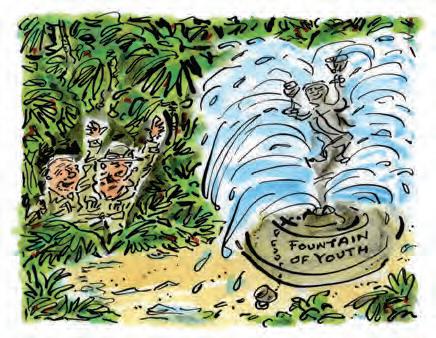
“We’ve found it…cancel my life insurance”
128 READERSDIGEST.CO.UK MAY 2013
◄ MONEY
point, you’ll have to negotiate another deal—and it could be a lot more expensive, as you’ll be older and potentially have more health issues.
Increasing Term Insurance. This type of insurance increases the level of cover over the years without the need for a medical. At the same time, the amount you pay also increases.
Decreasing Term Insurance. Here, the premium remains constant, but the payout decreases over the life of the policy at a predetermined rate.
Renewable Term Insurance.
A short-term policy that can be renewed at the end of the term without having to go through a medical. It’s often significantly cheaper than other forms of life insurance, because it lasts for a shorter time.
FASCINATING FACT
According to Forbes magazine, Hollywood’s bestpaid actors are:
Tom Cruise (annual earnings, $75m)
Leonardo DiCaprio ($37m)
THE ONE THING YOU MUST DO THIS MONTH...
...is get the best value you can on days out, particularly for the bank holidays.

Adam Sandler ($37m)
Joint Life insurance. Don’t forget that you can insure your partner as well and get a joint policy. Even if you’re the sole breadwinner, the costs of home or childcare will still need to be addressed if your partner or spouse passes away. It doesn’t make sense to leave just one of you protected.
Joint life, or first-death, policies initially cover both parties, but pay out after one partner dies, leaving the other one uninsured. Joint policies are generally cheaper, but separate policies can be less complicated, especially when it comes to inheritance tax—or if you should divorce or separate.
Many life insurance policies also o er the option of built-in critical-illness cover. This can be very helpful, as there may be times when you are ill yourself and unable to provide for others.
Invest in a railcard (railcard. co.uk) for a start. They exist for seniors, families, young people, disabled people and, now, anyone travelling in London and the South East. They cost £28 (£20 for disabled), but they give you a whopping third o rail fares (60 per cent o for kids). Also, check out visitbritain. com/en/Cheap-and-free-Britain/ on the Visit Britain website. It has lots of ideas and links for cheap and free days out, including for families, and the site is updated every day.

JARGON BUSTER BULL MARKET
A bull market is one in which prices are generally rising and investor confidence is high. This is the opposite of a “bear” market where investors have lost confidence and believe businesses will do badly, so they sell their shares where possible. ■
Jasmine Birtles is a personal finance writer and the founder of moneymagpie.com
129
FOR MORE ON MONEY, GO TO READERSDIGEST.CO.UK/FINANCIALSERVICES
Tasty recipes you can make in just 30 minutes
Why not mark National Vegetarian Week (May 20–26) with this flavoursome flan—where the thyme and cheese combine perfectly. And don’t be put o by the idea of pastry: the scone-like dough can be whipped up amazingly quickly.
1. Preheat the oven to 220C/425F/Gas
Mark 7. Sift the flour and baking powder into a bowl, then rub in 50g of the butter. Add 5tbs of the soured cream—and mix to a soft dough. 2. Roll out the dough on a floured surface into a circle about 28cm in diameter, and use it to line a 25cm loose-based flan or sandwich tin. Trim the edge, prick the base, line with greaseproof paper and fill with baking beans or small balls
ONION AND FETA CHEESE FLAN (Serves 4)
175g plain flour
1tsp baking powder
85g butter, at room temperature
150ml soured cream
500g onions, peeled
2 sprigs fresh thyme
3–4tbs olive oil
125g button mushrooms
250g Greek feta cheese
A few chives and pepper to garnish
of cooking foil. Bake blind for 10 minutes.
3. Meanwhile, thinly slice the onions, and rinse and dry the thyme, strip o the leaves and chop them finely. Heat the oil in a large frying pan, add the onions and thyme, and fry over a moderate heat until the onions are soft and golden.
4. Melt the remaining butter in another frying pan. Clean and halve the mushrooms and fry until lightly browned. Stir in the rest of the
soured cream and keep warm.
5. Remove the paper and baking beans or foil from the flan case, then return it to the oven for a few minutes until the pastry is golden.
6. Rinse, dry and snip the chives. Crumble the feta cheese into the onions. Heat for 1 minute, then season to taste. Spoon the mixture into the flan case, spoon the mushrooms over the top, sprinkle on the chives and the pepper and serve. ■
130
FOOD
FAST
READERSDIGEST.CO.UK MAY 2013
PHOTOGRAPHED BY FABFOODPIX

EATS & DRINKS WITH NIGEL BARDEN


Most Brits have spent time in France, Italy and Spain, but the far reaches of northern Scotland are less visited. So why not plan a trip to the ORKNEY ISLANDS, ten miles o the mainland?
TRAP THE FAT ISLES ALES
The King of Norway handed the islands over to Scotland in 1472, and they’re home to two distilleries —Highland Park and Scapa, which has recently started producing whisky again. Dark Island Brewery and The Highland Brewing Company turn out top ales such as Orkney Porter and Skull Splitter (a nod to their Viking heritage).
Orkney’s beef is excellent, as is its North Ronaldsay lamb. And if you’re munching on Partan Toes, don’t worry—they’re actually crab claws. There’s also an Orkney wine festival in June (1–8). Although vines don’t thrive in the northerly climate, naturally fermented o erings are made from raspberries and elderberries, courtesy of the Orkney Wine Company.
GOING WITH GRAIN
Look out in shops and good-quality restaurants for FARRO, a grain that’s been farmed longer than any other. Popular in the Middle East thousands of years ago, farro can grow in poor soils and has good resistance to disease. It’s related to wheat, but has twice the fibre and protein, and is more digestible for those who struggle with gluten. During cooking it swells to three times its size, and Italians in particular love to add it to casseroles and soups. Substitute it in recipes that call for barley, wheat, spelt or quinoa—or, lightly cooked, it adds a tasty crunch to salads.
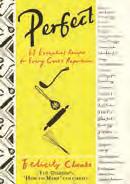

TRIED & TESTED

Ask any Jewish cook about the best way to get fat from chicken soup and many will suggest laying kitchen paper onto the surface of the cooling dish, as it’ll stick conveniently to it. Repeat until there’s no fat left. Another way of removing fat, particularly from stocks and casseroles, is to let them cool and drop in a few ice cubes—the fat will magically cling to them.
In case you missed it when it first came out, take a look at PERFECT (£18.99) by Felicity Cloake. She’s done the culinary hard graft by testing a host of di erent recipes to come up with 68 perfect versions, including Yorkshire puds, coq au vin, roast pork with crackling, mash, sticky to ee pudding and crumble.
out, take a look at of Yorkshire crackling, mash, sticky to ee pudding and crumble.
Nigel Barden is the food and drink presenter on Simon Mayo’s show on BBC Radio 2, and chairman of the Great Taste Awards
132 READERSDIGEST.CO.UK MAY 2013

If getting out and about isn’t so easy, let Wiltshire Farm Foods take care of your mealtimes.





















Choose from 260 frozen meals
Many diets catered for, including gluten free and diabetic
Easy to store and cook
For your FREE brochure call
0800 066 3540 wiltshirefarmfoods.com
FREE DELIVERY MEALS START from £2.95
 Roast Lamb in Mint Gravy with vegetables £4.25
Roast Lamb in Mint Gravy with vegetables £4.25
RD13/IN1

Ok,
There are some things that have improved with time, which is why with Reader’s Digest home insurance we offer you the most up to date cover without forgetting good, old fashioned customer service. Just pick up the phone to one of our UK based call centres and one of our advisors will give you all the help you need.
Advising our customers on an ever changing world for decades.
Vivat Finance (trading as Reader’s Digest Financial Services) is an Introducer Appointed Representative of Commercial Vehicle Direct Insurance Services Limited for general insurance products. Reader’s Digest Financial Services is registered in England No.07205138. Registered Office: 9th Floor, 1 Eversholt Street, London, NW1 2DN. Home Insurance is provided and administered by Commercial Vehicle Direct Insurance Services Limited. Authorised and Regulated by the Financial Services Authority (Number 302216). 3297RD/3013
Home Insurance 0800 022 3822
maybe not the wallpaper Things used to be simpler
GARDENING WITH BOB FLOWERDEW

Growing perfect sweetcorn and a good variety of apples
QMy friend grows splendid sweetcorn, but mine performs miserably. How can I do better?
ASow fresh seeds of a modern variety of sweetcorn in situ straightaway—or, better still, put out small plants. Don’t delay getting plants started, though ideally dig and enrich the sites beforehand with pelleted or well-rotted manure. And don’t put plants as close as they’re often shown on TV, which only works in exceptionally good conditions. In poor or dry soils, a foot apart each way is an absolute minimum, and more is better (wider spacing gives more cobs per plant, and bigger, fatter ones). As they grow, mound soil about their bases to encourage more roots. Most importantly, water generously and regularly, and add liquid feed.
When male flower tassles sprout from the tops, run these through your hand to pick up pollen, then run the same hand over the silky threads sprouting from young cobs underneath. That’s it. Sweetcorn is ready to eat if a kernel squirts thick cream when pressed.


Room to grow: give sweetcorn plants plenty of space to ensure a good crop
Q
My neighbour ties her da odil leaves into tight bunches after the flowers die.
Should I?
A No. It’s one of those traditional but daft practices with no discernible benefit. In fact, it can even reduce the number of flowers the following year.
135 MAY 2013READERSDIGEST.CO.UK
GARY SMITH/GARDEN WORLD IMAGES; RICHARD SHIELL/GARDEN WORLD IMAGES (PETUNIA) ►
QI’ve heard that the new “family” apple trees are perfect for small gardens. Should I get one, and will it give my family enough apples?
AI’ve never thought of it that way—I understood it as a family of varieties on one tree, not a tree fit for a family. But maybe…The idea is that several (usually three) varieties are grown on one tree, so spreading the season and saving space. These should all be compatible, so no other pollinator is needed. Sadly, these seldom perform very well—invariably, one or other dominates and the least vigorous wanes. One tree isn’t likely to supply enough fruit and, worse, you have little choice of varieties.
BOB’S JOBS MAY


likely to supply enough




more, taking a and with a tad three separate trees. For example,
Although costing more, taking a little more space and with a tad more work to plant, I’d prefer three separate trees. For example, a Discovery, Egremont Russet and Ribston Pippin would give loads of fruit for the six months from August until January. And a small point: family trees are not new—grafting several cultivars on one set of roots is an old practice going back to Roman times.
Bob Flowerdew is an organic gardener and a regular on BBC Radio 4’s Gardeners’ Question Time. Send your gardening questions to Bob at excerpts@readersdigest.co.uk
Beware of late frosts! Don’t be too quick to put out tender crops, expensive bedding or hanging baskets. However, do prepare tender plants— your own or bought in—to establish more readily outside. Simply put plants outdoors in the morning and bring back under cover at night for several days before finally leaving or planting them out. Use dark blue or violet petunia plants for hanging baskets by a bedroom window— these look beautiful and often have a delicious evening perfume.


To make your own reader’s tip
To make your own seedling propagator, just put your plant pot, soil and seeds into a yogurt pot, top with a clear plastic dessert pot, and place on a sunny windowsill. ■
Submitted by Sonja McLachlan, Fort William
Email your gardening tips and ideas—with photos, if possible—to excerpts@readersdigest.co.uk. We’ll pay £50 if we use them on this page.
136 READERSDIGEST.CO.UK MAY 2013

•FAST & SIMPLE! Removable ‘gates’ for quick, easy planting •PLANT FROM THE OUTSIDE IN! No damage to plants or roots
•SAVE MONEY! Unlike other baskets you need no moss or other liner
•CLEVER DESIGN! Built-in water reservoir stops roots drying out
•STRONG! Anti-twist 4-point chain Spectacular results guaranteed! “Discover














































www.YouGarden.com/RD100| Call 0844 6 569 569 Calls cost no more than 5p per minute from a BT landline. Other network charges may vary. © YouGarden Limited 2013. Or post completed coupon to: YouGarden, Eventus House, Sunderland Road, Market Deeping, Peterborough PE6 8FD. Offer available while stocks last. ORDER ONLINE, BY PHONE OR BY POST Designed for professionals, these amazing baskets are now available for home gardeners so you too can grow the most incredible displays. The unique construction means you plant from the outside in. The clever lattice ‘gate’ clicks shut, holding roots inside and flowers outside – all perfectly intact! The ‘Easy Fill’ Hanging Basket – allows your plants to ‘breathe’ and gives them the growing room to ensure every plant reaches it’s full potential. Don’t miss this BUY ONE GET ONE FREE offer SAVING YOU £9.99 while stocks last.
Pot not included 1 Lift gate & slide plant in from the outside, so no damage 2 Simply slide the gate back over the plant 3 Clever design ensures roots have room to breathe & grow
Amazing ‘Easy Fill’ Hanging Basket
to creating the most
hanging
have ever seen!” SEE THE VIDEO ONLINE BUY ONE GET ONE FREE SAVE £9.99 NOW JUST £4.99 EACH WHEN YOU BUY 2 FOR £9 99 RD100 “If you are not totally happy, let us know within 30 days of receipt and we will replace or refund. If any of your trees or hardy plants should ever fail to thrive, we will replace them free of charge. You just pay the PP&I!” Peter McDermott, MD
GUARANTEE The last hanging basket you’ll ever need! 15” diameter RD100 Post to: YouGarden, Eventus House, Sunderland Road, Market Deeping, Peterborough PE6 8FD Mr/Mrs/Ms/Miss First Name Surname Address Postcode Tel Email Please tick here if you would prefer not to receive offers other than from us. © YouGarden Limited 2013. Item Offer Description Price Qty Sub Total 13-0029 15” Easy Fill Hanging Basket Buy One Get One FREE! Save £9.99 £9.99 These SPECIAL OFFERS go perfectly with your Easy Fill Hanging Baskets 40-0078 Surfina Trailing Petunia Collection – 12 Jumbo Plug Plants £12.99 13-0023 4 x 12” Easy Fill Hanging Baskets £14.99 10-0007 All In One Rain Gel & Feed x 500g £9.99 Add PP&I £6.99 Total order value Delivery to UK mainland only* I enclose cheque/PO with your name & address on back for £___________________ payable to You Garden, or charge my Visa/Mastercard/Maestro card: Card Security No. No. Start Expiry Maestro Last 3 digits on reverse Date Date Issue No. *Surcharges will apply to N.Ireland, Channel Islands, Scottish Highlands & Islands. See website for full details. BONUS OFFER SURFINIA TRAILING PETUNIA COLLECTION 12 JUMBO PLUG PLANTS Perfect for Easy Fills, creating a non-stop waterfall of incredible colour and fragrance from April until October! — 40-0078 — NOW ONLY £12.99
The Professional’s Secret
spectacular
baskets your neighbours
LIFETIME

Splendour in the grass: at a wood near you soon
One of the glories of our countryside bursts into full splendour this month. Not only is a wood with a carpet of bluebells an electrifying sight, but it’s also very British—because the UK has perhaps 40 per cent of the world’s common bluebells.
In recent times, however, there’s been what some people call an “invasion” of another variety— known as Spanish bluebells. Fortunately, it’s easy to tell the di erence. The flowers of common or British bluebells all droop elegantly from one side of the stem, they smell lovely and have white pollen inside the flowers. Spanish bluebells have their flowers all around
Over the next few weeks, try leaving a light on near a window. You may be surprised to hear a repeated knocking and tapping at the glass. Grab a torch, rush outside and you’ll probably find large, tawny-coloured beetles crashing about, all attracted to your light. Some will be upside down on the ground, some walking about and others actually airborne, zipping around with a loud, slightly intimidating drone.
These are cockchafers, which

the stem, do not smell and their pollen is blue.
To find a bluebell walk near you, just enter your postcode at visitwoods.org.uk/ en/visit-woods/things-to-do/nature/ Pages/bluebell-walks.aspx#.
FALL GUYS
often emerge this month, hence their other name of “maybugs”.
If you pick up a cockchafer (go on, they don’t bite!) it will suddenly flick open the protective cases on its back and unfurl the delicate wings beneath. Then, with an exciting hum, it will try to take to the air, more often than not crashing straight onto the ground. Cockchafers may be one of nature’s most successful designs—but it takes them a while to get their pilot’s licence.

138 READERSDIGEST.CO.UK MAY 2013
JEF MEUL/MINDEN PICTURES/FLPA; JOHN BEEDLE/GPL/GETTY IMAGES
HUGHES-GAMES
WILDLIFE WITH MARTIN
A very British blue? Woodlands in May
A cockchafer in flight— for now
NOT GUILTY

Martin HughesGames is a host of BBC2’s Springwatch and Autumnwatch
Almost as soon as they arrived in the UK, little owls caused controversy. A non-native species, they were first bred in 1879, and introduced into the British countryside over the following decades “to rid belfries of sparrows, bats and mice”. But the little owl, just ten inches high, soon incurred the wrath of gamekeepers, who accused it of killing game birds. So in 1935 the British Trust for Ornithology commissioned Alice HibbertWare to investigate...
Miss Hibbert–Ware’s report is a marvel of scientific investigation. She exhaustively analysed the owls’ diet, dissecting pellets, gizzards and nest sites. In one pellet she found 686 individual earwig pincers; in another, 2,000 daddy-long-legs’ eggs. The evidence was overwhelming: little owls eat insects and rodents, and the gamekeepers were talking nonsense. This month, look out for little owls perching boldly in daylight (tops of telegraph poles are a favourite). Although they’re classified as an invasive species, and so have no conservation status, if there was a poll I think most of us would vote for keeping them. The little owl has found its way into our hearts. ■
DICKIE DUCKET/FLPA
139


Why apps are everywhere, and how they can help

Brainy charity One Laptop per Child (OLPC; onelaptop.org) recently left sealed boxes stu ed with solar-powered tablets in two remote Ethiopian villages. Within four minutes, the first child cracked one open and fired it up. Never having seen written words, road signs or even packaging, children were using 57 pre-loaded English-based apps a day by the end of the first week. By week two, they’d started to recite and write the English alphabet. A hundred million kids worldwide are denied a basic education. OLPC uses tech to tackle this, and has already given away two million low-power connected laptops to some of
Kids from the One Laptop per Child scheme

the world’s poorest children. But while laptops need teachers, touch is intuitive.
Tech bo ns predict that, by end of this year, all new gadgets will be touch enabled. Brits already own nearly 50 million tablets and smartphones—in the week before Christmas, Dixons sold five tablets a second. I’m excited about touch potential for those unfamiliar with or unsure about traditional gadgets, or who have accessibility issues. I’m not quite mad enough to prophesise the demise of PCs, but before long we’ll marvel at memories of grappling with clunky mice and monitors.
Cheeringly, apps make using
140 READERSDIGEST.CO.UK MAY 2013
ONLINE WITH MARTHA LANE FOX
our favourite bits of the web simpler, smarter and faster.
Back in 2008, Apple’s App Store launched with just 500 —fast forward five years and we’ve downloaded a cool 40 billion, with 20 billion last year alone. Experts predict an extra 56 billion this year.
Most of us use 23 apps a day, for 77 minutes, to do daily stu like checking train times, or to turn gizmos into everything from drawing pads to remote controls. We downloaded a whopping 200 million BBC iPlayer apps a month last year, and the PM recently road-tested the “No 10 dashboard” for live info on GDP, bank lending, jobs and polling data.
There are also heaps of fun and frivolous ones—the Temple Run 2 game follows the hugely successful Temple Run, which clocked up 170 million downloads, and the number of royal-baby apps grows with Kate’s bump. Others help us do more locally or tackle thorny issues—one of my favourites is the Apps for Good programme (appsforgood.org), which teaches kids to build apps that solve real-life problems.
TRY THESE
Apple has 750,000 apps, with 650,000 from Android, plus thousands more from rivals such as Blackberry, Nokia, and Windows:


● Swiftkey allows you to type in an easier and faster way. If you’re bored with your style, write like literary greats such as Shakespeare, James Joyce and Charles Dickens, or even her Maj— based on words and phrases from the Queen’s speeches, top terms are “My Government will”, “Men and women”, and “United Kingdom”.
● People Finder helps blind people find each other by vibrating or making noise when someone else with the app comes within 50 feet. It then lets you know how close they are by saying “near” or “cold”.
0800 77 1234 Charles or ● dulcet tones to

● Warning: I’m very lucky to chair these two fab companies, so here come shameless plugs! Makies Doll Factory lets you design your own 3D-printed Makie doll. Make one for fun, or use the app to order. Then, if you fancy a song, Lucky Voice Karaoke lets you add your dulcet tones to over 8,000, which can be streamed straight to an iPad. Give an hour of your time to help an internet beginner. Go to go-on.co.uk for more. Or to find a taster session near you, call freephone

ABSOLUTE BEGINNER WHAT’S AN INBOX?

It’s the place where your email messages go and stay until you read, answer, store or delete them. It’s automatically created when you set up an email account. For more info on choosing the one for you, visit bbc.co.uk/webwise ■
141 MAY 2013READERSDIGEST.CO.UK
Martha Lane
Fox is the UK’s digital champion and chairs
Go ON UK (go-on.co.uk)
MOTORING WITH CONOR MCNICHOLAS
What makes us want to raise the roof?

Britain loves cabriolets. Show us a motor with the roof taken o and many of us go weak at the knees. It’s often claimed that we buy more open-top cars per head of population than any other country. Perhaps our weather means that any day of sunshine needs to be celebrated.
While cabriolets now feel a bit glamorous, it’s ironic that all cars were originally opentopped—they were derived from horse-drawn buggies with fabric hoods that could be raised and lowered. But enclosed cars were the future. In the US, Cadillac o ered its first made-to-order fully closed body as an option in 1906. By 1910, it was their standard design. From the 1920s
The new Vauxhall Cascada, “a selfconsciously premium design”

onwards, soft-top cars became a niche choice.
Early convertibles were clumsy to operate by hand. The first electrically folding soft-top was the Plymouth Convertible that wowed Americans in 1939 and gave the convertible car a new lease of life. Folding hard-top cars may feel new, but the first to go on sale was the Peugeot 601 Eclipse in 1934!
Between 2.5% to 5.5% of UK car sales each year are now cabriolets of one kind or another. The newest of the open-top breed is the Vauxhall Cascada, their first dedicated cabriolet (ie, not a regular hard-top model that’s been converted) since 1926. The engineering and attention to detail is superb—the beautiful fabric hood folds in just 17 seconds, and you can do it at speeds up to 30mph if the rain suddenly reappears.
But the question still remains whether you’d want to pay £23,995 for a Vauxhall when the same money would get you a tidy secondhand BMW or Merc. If new is your thing, however, the Cascada now o ers Audi-like quality for mainstream money.
142 READERSDIGEST.CO.UK MAY 2013
ONE TO BUY

ONE TO SPOT
Renault Clio (from £10,595) Just because you’re getting older doesn’t mean you want a boring car. Quite the opposite, in fact. If you’re looking for something with a dash of style, then Renault’s new Clio has brought a dash of va-va-voom back to the perennial small-car favourite. Bold styling and nippy handling are yours for a very attractive price.

VW XL1 A decade in the making, this final, very special production car from VW is capable of over 200mpg. Thanks to its diesel-and-electric hybrid engine, skinny tyres, lightweight body and other clever tricks, it shames other motors. Around 50 will be made. There’s no word on the (predictably high) cost, but whoever does buy one will own an engineering marvel that points to the future. Well done, VW.
ONE TO DREAM ABOUT



Porsche Cayman (£39,694) The Porsche 911 may be celebrating its 50th birthday this year, but it’s this little sports car that carries the true DNA of the classic 911. The new Cayman (essentially a hard-top Boxster) is considered by those in the know to be the finest-handling sports car in the world. Just imagine...
POSITIVE CHARGE
Here’s a good bit of news.


Renault is about to release its new all-electric small car, the Zoe, in June, but is aware that a lack of charging points is a concern. Now, though, it promises to install one at your home for free with every purchase; the Government pays 75% and Renault picks up the rest. It’ll be fitted by British Gas, so you’ll know it’s been done properly.
At £13,650 for a car that’ll cost pennies to run and do 90 miles on a single charge, the Zoe starts to look like a fine option. ■
Conor McNicholas is the former editor of BBC Top Gear Magazine
143 MAY 2013READERSDIGEST.CO.UK
TRAVEL WITH KATE PETTIFER

My Great Escape: to see the hidden treasures of Sicily
A little more than a pinch: the Ettore and Infersa Salt Museum in Marsala


Jane Keightley from Lincolnshire explores the little-visited salty west of Sicily
used to grind the salt. The salt pans have been worked since Phoenican times and were the mainstay of the local economy during the Middle Ages. It’s now just a cottage industry, but the salt here is still considered to be the finest in Italy.
Send us a photo of your favourite holiday, tell us briefly what made it so special, and if we include it on this page we’ll pay you £50. See address on p4.
After waking up to beautiful Sicilian blue skies and sunshine, and a day to be filled with adventures, we set o down the coast towards Marsala. We were staying in Trapani on the west coast of Sicily, and were keen to fit in as much as we could in the few days we had.
Driving down the coast road, we were overwhelmed by expanses of shallow pools, piles of gleaming white salt and small mulini, the windmills that were
We travelled onwards to Marsala, full of baroque buildings and famous for its dessert wine. It was here that Garibaldi landed in 1860 with his army of 1,000 men. After exploring for a couple of hours, we carried on towards Selinunte, known for its Greek ruins. As we journeyed along the coast, we decided to stop at a supermercato and get ourselves a picnic. Armed with our paninis and fresh fruit, we arrived at Marinella di Selinunte, where we sat and enjoyed the view of the beach and the shimmering blue sea. When we’d had our fill of the food and the view, we set o to Selinunte itself.
The ruins at Selinunte are amazing. It’s a huge site and we travelled around it on a little motorised buggy. The temples lie in heaps where they were felled by earthquakes, but you can easily imagine what a huge
144
ANIK MESSIER/FLIKR/GETTYIMAGES CO M PILED BY LA RA D UNN
and powerful city it was, one of the most important of the Greek colonies in Sicily for many years until it was attacked by a force of some 100,000 Carthaginians in 409BC. The city was ill-prepared and in some disrepair, but it defended valiantly, managing to hold out for nine days before most of the inhabitants were killed or sold into slavery.
After our dusty drive round the ruins, we were ready for a gelato. We headed home to Trapani, tired but looking forward to the rest of the time we had left in this captivating part of Sicily.
SECRET SICILY
Farm Holidays
THINGS TO DO THIS MONTH
GO NOW

The Alentejo region is wild and unspoilt, covering nearly a third of Portugal, yet home to just 7.1% of the population. Stargaze at the Unesco-certified Alqueva Dark Sky Reserve, enjoy pristine beaches or discover the region’s food and drink (Alentejo produces 46% of Portugal’s wine). Sunvil Discovery’s new fournight short breaks to the area combine the best of culture, cities and coast from £482pp, including flights, car hire, b&b, a three-course dinner and room upgrade, subject to availability (sunvil.co.uk).
STAY NOW
TRAVEL WEBSITE OF THE MONTH
unusualhotelsoftheworld.com
If the weird and wonderful are appealing, this website could be the answer. With searchable global locations, it lays out a huge variety of unusual and experiential accommodation options from historic buildings such as castles and churches to vehicles, wigwams, igloos and even underwater hotels.
Sicily (farmholidays-sicily. com) provides lots of options, while Sunvil Discovery has tailor-made packages in the west of Sicily (sunvil.co.uk). investigators as they enjoy a three-course dinner,
Prices and availability can be checked on the site and booking is directed straight to the property.

One of Cornwall’s much-loved festivals, the Du Maurier Festival, has been renamed the Fowey Festival of Words and Music. It takes place in the harbourside town of Fowey from May 8 to May 18, and this year’s highlights include author Michael Morpurgo, former mayor of London Ken Livingstone and harmony group Cantabile (foweyfestival.co.uk).
BOOK NOW



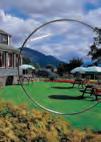

The Castle Inn Hotel in the northern Lake District is playing host to a murdermystery event on June 15. Guests take on the role of investigators as they enjoy a three-course dinner, hopefully solving the crime in time for co ee. The hotel is surrounded by hills and woodland, making it perfect for a weekend walking break with a twist. Tickets cost £27.50pp and rooms are from £25pppn, including breakfast (castleinncumbria.co.uk). ■



145 MAY 2013READERSDIGEST.CO.UK
The Reader’s Digest
May fiction
From family ties to open skies: our favourite novels published this month

Big Brother by Lionel Shriver (HarperCollins, £16.99; ebook, £10.99)
Since her global smash We Need to Talk About Kevin, Lionel Shriver’s novels have been rather hit-and-miss affairs. With Big Brother, she comes roaring back to form.
Pandora is a married Midwesterner about to meet her beloved older brother Edison—jazz pianist and all-round hunk—after four years apart. Excitedly waiting at the airport, she sees a 27-stone guy being rolled past in an extra-wide wheelchair. “Yo,” he says, “don’t you recognise your own brother?”
From there, the novel remains an intimate account of the continuing power of sibling relationships in adult life: because she’s always looked up to Edison, Pandora finds it painfully difficult even to acknowledge the mess he’s in. But it’s also a more general exploration of our completely weird attitudes to food, with what should be a simple question of refuelling now central to how we judge each other and ourselves. No wonder it’s such an endless source of anxiety, with the health-conscious just as incapable of carefree eating as the overweight.
If you know that Shriver’s own brother became morbidly obese, then the book perhaps has an extra
BY JAMES WALTON
James Walton writes and presents the BBC
Radio 4 literary quiz
The Write Stuff
?

name the author Answer on p150
Can you guess the writer from these clues (and, of course, the fewer you need the better)?
1. Her only novel is one of the best-selling Penguin Classics ever.
2. Its title is also that of a 1978 number-one single.
3. Her older and younger sisters were also novelists.
charge. But this is a novel with such universal implications that few readers will be able to avoid a shudder of recognition.
Under the Radar
by James Hamilton-Paterson (Faber, £14.99; ebook, £12.99)
Three years ago, the criminally undervalued James Hamilton-Paterson—a writer who for decades has been receiving rave reviews without ever quite breaking through to the wider world—came close to proper commercial success at last. The book in question was Empire of the Clouds, a non-fiction account of how post-war British aeroplanes became the best in the world—and how we blew it.
Set on a Lincolnshire airbase in the 1960s, his latest novel covers similar ground, taking us back to a time when the RAF was enjoying its last hurrah, with Vulcan bombers still carrying Britain’s nuclear deterrent. The title refers to the new stealth technology in which Britain led the world—but with the added suggestion that the whole Cold War period has now slipped under the radar too.
May paperbacks
The Daughters of Mars by Thomas Keneally (Sceptre, £8.99) Overwhelmingly powerful novel about two Australian nurses in the First World War from the author of Schindler’s List.
The Secret Rooms by Catherine Bailey (Penguin, £9.99) Terrific piece of non-fictional sleuthing uncovers some eye-popping aristocratic secrets from the early 20th century.
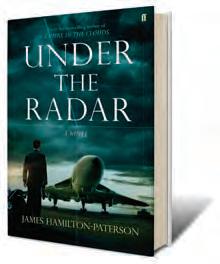
The Life by Martina Cole (Headline, £7.99) According to many of her fans, the best thriller yet from one of Britain’s best-selling authors.
National Service by Colin Schindler (Sphere, £7.99)
Oral history from the men conscripted into the services between 1946 and 1962.
If so, Hamilton-Paterson triumphantly reclaims it here. The factual background he knows so well allows him to bombard us with surprises—including the fact that Britain had to worry about American spies as well as Russian ones. The stirring set pieces and rich cast of characters provide a quietly jolting reminder of the emotional and often physical cost of being a front-line cold warrior.

Bring Up the Bodies by Hilary Mantel (Fourth Estate, £9.99) The all-conquering Mantel tells the story of Anne Boleyn in the sequel to Wolf Hall
Rod by Rod Stewart (Arrow, £7.99) One of the best recent celeb autobiographies, from someone with a genuine story to tell and a very funny way of telling it.
147
► penny
lancaster
“The
Germans were in a hurry”
Growing up in 1930s Poland, a young Jewish girl felt loved, happy and perfectly safe—but then her country was invaded...
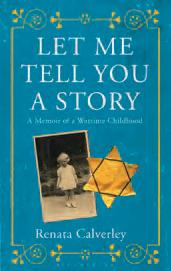
These days, Renata Calverley (right) is a retired teacher of English in Oxford. But before the war she lived with her father, mother and grandmother in the Polish town of Przemyśl. After the Germans invaded, she could just about understand why her doctor father had gone off to the army. Far more baffling was why her mother was sacked from her teaching job at the university, and why so many of their possessions were being sold. Above all, why did being a Jew suddenly matter so much?
Then, in June 1942, two German soldiers arrived at the family’s flat. Renata, her mother (or Mamusia) and her grandmother (Babcia) were ordered to gather a few belongings, and marched off to what she learned to call the “ghetto”. To her continuing bewilderment, she now found herself living in a room full of strangers and eating only watery soup, while Mamusia and Babcia began shift work in a factory.
The fact she’s around to tell us what happened next is largely thanks to her non-Jewish nanny Marynia, who smuggled Renata out of the ghetto under her skirt. From there, she was passed around members of her extended family, who were still in hiding; sympathetic members of the Polish resistance; and people who looked after her, often cruelly, purely in return for cash.
Through all of this, Renata was helped by her blonde hair and blue eyes, and sustained by her love of reading. But she was also, of course, very lucky. In the book’s most terrifying scenes, she crouches out of sight as German soldiers carry out a search, sometimes taking away the people she loves.
But what turns such a remarkable story into such a remarkable book is that it’s told without any hindsight. Instead, we see all the events from the perspective of childhood, with Renata more

r D e XC Lu SIV e : pretty StarS to keep uS Safe: more from LET ME TELL YOU A STORY
“A few days later, Mamusia came back from town looking worried and carrying something.
“ ‘Uncle Julek has told me that we mustn’t go out without wearing one of these,’ Mamusia said. She showed us three yellow six-pointed stars. I thought they looked quite pretty, just like stars fallen from heaven.
I wouldn’t mind having to wear one of those.
“ ‘Why? Why
148 readersdigest.co.uk may 2013
RD’s RECOMMENDED READ
►
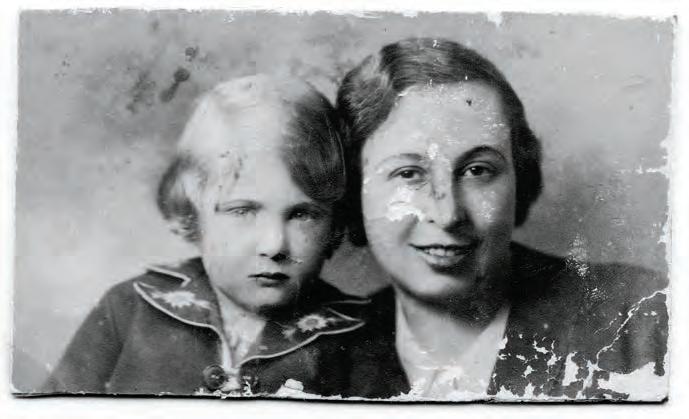
concerned with the loss of her toys than matters of huge historical injustice—which, needless to say, speak for themselves.
In this passage, she’s still living in the ghetto room that her family shared with, among others, the kindly Janka, an unnamed old woman who reminds Renata of a fairy-tale witch, and a man called Piotr. At this point, though, she’s all alone—because Babcia hasn’t come back, as she usually does, from her shift before Mamusia has had to go out for hers…
A whole day passed and Babcia hadn’t returned. I climbed into Mamusia’s bed, comforted in part by the familiar smell of my mother.
At last the door opened and the old woman and Janka hurried in.
‘Renata, are you here?’ Janka called.
I came out from under the blanket clutching Baby Doll, my last link with my old life. ‘Where is my Mamusia and my Babcia?’ Janka burst into tears, picked me up and hugged me tight.
‘I want Mamusia!’ I wailed, trying to push her away. ‘I want my Babcia. I want to go home and I want sausage.’
‘Your mummy and granny have had to go away for a little while,’ Janka said, releasing her grip. ‘They asked me to look after you until they come back.’ She looked at me kindly.
‘I want my Mamusia. I want my Babcia.’
‘How are we going to cope with the brat?’ the old woman snarled. ‘They’ll find her and then we’ll all be dead.’
►
In happier times: Renata, above, with her mother Tosia; and below, with Marynia, the nanny who saved her

Let Me Tell You
a Story: a Memoir of a Wartime
Childhood by Renata Calverley is published by Bloomsbury at £16.99
(ebook, £14.99)
149 may 2013 readersdigest.co.uk
‘‘
“His strange mad, laugh filled the room, but changed to a yelp when Jankahit himhard across the mouth”
‘Her mother may come back. Don’t be so heartless.’ Janka tried to cover my ears.
‘Don’t make me laugh! Does anyone ever come back?’ the old woman said. ‘Grow up, girl; it may be your turn sooner than you think, and don’t expect me to look after that child if you’re taken.’
I could sense that Janka was angry, but couldn’t really follow what the argument was about.
‘When will Mamusia and Babcia come?’ I sobbed. ‘Who will put me and Baby Doll to bed?’
‘I will.’ Janka tried to smile. ‘I promised your Mamusia I would look after you. She asked me to give you a big hug from her and to tell you to be a good girl until she gets back. She will try to be back as soon as she can, and so will your Babcia.’
‘Where have they gone and why didn’t they take me?’ I asked.
‘They’ve gone away with a lot of other people from the factory in a big lorry,’ explained Janka.
‘But why didn’t they come home and say they were going?’
‘They weren’t allowed to. The Germans were in a hurry and made them leave straight away.’ Janka’s voice broke and she wiped her nose on her sleeve.
‘Where have they gone?’ I pleaded.
‘I don’t know.’
‘Tell the child the truth,’ said Piotr, who had come in while this was going on. ‘She’ll have to know sooner or later.’ He turned to me. ‘Your mother and grandmother were taken off to Szebnie in a purge. They’ll never come back. You’ll never see them again. Even if you go there yourself—which you probably will. If you live that long.’
us?’ said Babcia.
“ ‘All of us,’ Mamusia replied, ‘all of us…Jews. Gestapo orders. It’ll only be for a while, until the war is over.’
“War. There was that word again. So war meant more than soldiers fighting and breaking things that weren’t theirs. It also meant soldiers killing each other and we, who didn’t want to fight, having to wear pretty little

stars so they wouldn’t hurt us by mistake.
His strange, mad laugh filled the room, but changed to a yelp of pain as Janka hit him so hard across the mouth that blood spewed out between his teeth. That was September 1943 and I was nearly six. It was the last time I ever saw my Mamusia and Babcia.

an D the name of the author I
Emily Brontë (Wuthering Heights). Her sisters were, of course, Charlotte and Anne.
“Pretty stars to keep us safe. I liked that idea. I felt very grown-up now I knew what Mamusia and Babcia were talking about.
“But then Babcia spoilt it by saying, ‘I don’t like this at all.’ ’’ n
150 readersdigest.co.uk may 2013
’’
◄
◄
S …

Books That Changed My Life
Award-winning singer and actor Michael Ball has appeared in West End musicals Les Mis, Hairspray and Sweeney Todd. He’s now on a UK-wide tour.
Jonathan Livingston Seagull by Richard Bach
Watership Down by Richard Adams
This book was published in 1972 when I was ten, although I didn’t read it until I was in my mid-teens. I quite quickly realised that it was much more than just a story about rabbits: it was an epic struggle between Big Brother and the individual and how, ultimately, integrity, courage and honesty will win the day. It was also about the lasting power of friendship. I must have reread it about eight times. I’m now trying to persuade my partner’s two grandchildren— Connor, who’s 13, and 11-year-old Grace—to give it a try. It’s well written and works on lots of di erent levels— a beautiful book, and somehow so quintessentially British.


I was in my late teens when I first read it and going through a hippie phase. It was about freedom and opening up to possibilities that weren’t the norm. It showed me you could pursue something that might set you apart from others but could still be liberating. I was a bit of a crazy, mixed-up kid, and it demonstrated that being di erent was all right—in fact, rather exciting—and it was better to be an individual following his dreams than one of the herd.

The Collected Poems of Wilfred Owen

At drama school in Guildford, we had to read First World War poets like Siegfried Sassoon and Wilfred Owen, who, of course, was about the same age as I was then when he was killed. I was a student in the early 1980s, around the time of the Falklands War. There was no real parallel, but we were nonetheless suddenly at war, and my best mate Phil performed a number of the poems in his final show. It was probably the first time that I realised the older generation were young once. These were little more than boys and yet they were fighting, sometimes dying, for their country. They faced situations that I couldn’t possibly have imagined until I read their beautiful, poignant, haunting verse. ■

were poems were young once. These were little have imagined until I read their beautiful,

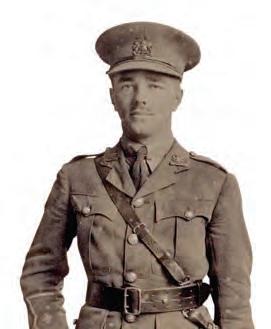

As told to Richard Barber
151










BEST OF BRITISH DIRECTORY 152 Great value, Full Board activity breaks in the heart of Devon. FREE Golf, Bowls, Tennis, Target Sports & Leisure + 17 Tutored Crafts! Crafty Breaks 0800 781 9714 activityhotelbreaks.co.uk Derbyshire weekend break, AA 3star. From £129.90 for Two Persons Dinner, Bed and Breakfast. Near to Peak District. Littleover Lodge Hotel www.littleoverlodge.co.uk Tel: 01332 510161 Brochure 01297 443363 www.lymebayholidays.co.uk properties all in & around beautiful Lyme Regis. Secluded, unspoilt location. Luxury timber lodge. Bright & well-appointed. Full central heating. Available all year. Wonderful walks & wildlife. NEW FOREST Brochure: 01425 477554 0845 434 8749 Tel 01273 390 399 Mobile 07900992494 MR BISHOP Entire house contents or single items. Antique Furniture, Paintings, Silver, Gold, Jewellery and China. Watches and Clocks, working and not working. 32 years’ experience. Will travel anywhere in UK. PURCHASE FOR CASH






To advertise on these pages please contact Nick Page Tel: 07789178802 Email: nick.page@madisonbell.com 153 MOUNTS BAY CORNWALL Pretty 4 star cottage for 2 people. 300m from sandy cove on coastal path. Patio and car parking space. Cottage for 5 people also available. Regret no pets & no smoking. 01344 621220 Napton Narrowboats A Great British Touring Holiday - you know you've always wanted to try it! Family run business for 25 years Weekly hire or short breaks. Call 01926 813644 www.NaptonNarrowboats.co.uk Sales, kits & restoration 0800 074 6104 dapplegrey.co.uk Simplaphone • Handsfree • Pick up the handset for added privacy • Large Print Numbers • Camera • Answer-phone included Buy Now www.simplaphone.com Tel: 01865 301915 Special Offer £49 + P&P £8.00 Touch Screen Home Telephone
Laugh!
WIN £50 for every reader’s joke we publish. Email excerpts@ readersdigest.co.uk or go to facebook.com/readersdigestuk
¶ “I got sacked today for downloading games onto the work computer and causing everything to crash,” I told my friend.
“That’s a bit harsh,” he replied.
“They don’t mess about at air-tra c control,” I said.
Seen on the internet
¶ After my girlfriend gave birth to our son, the midwife smiled at me and said, “Do you have a name?”
I replied, “Yes. It’s Andrew.”
“Andrew’s a great name,” she said.
“Thanks,” I replied. “But what do you think we should call the baby?”
Seen on the internet
¶ My boss told me o about my appearance. He told me that I should dress for the job I would like, not the job I have.
I now face a disciplinary hearing for wearing a Batman costume in the o ce.
Stephen Hughes, Newport, South Wales
¶ “What happens in the past should stay in the past” is a fun thing to say to your creditcard company.
Twitter comedian @sixthformpoet


“If I’d known we’d be this long wandering the wilderness I would never have worn these heels…”



¶ A MAN APPROACHED A VERY BEAUTIFUL woman in a large supermarket and said, “I’ve lost my wife in the aisles. Can you talk to me for a couple of minutes?”
“Why?” the woman replied.
“Because every time I speak to a pretty lady, my wife appears out of nowhere.”
¶ It was exam time and John, who wasn’t terribly bright, was determined to prove his teacher wrong and get at least one right answer on his chemistry test. The first question was, “If H20 is water, what is H204?”
Triumphantly, John wrote down his answer. “For drinking, washing, and cleaning.”
Seen at ahajokes.com
154 READERSDIGEST.CO.UK MAY 2013
¶ Mr Brown is building himself a shed in the garden. He goes to the local hardware shop and says, “Hello there, could I have some bolts, please?”
The man behind the counter says, “Well, how long do you want them?”
Mr Brown replies, “To tell the truth, I was really wanting to keep them.”
J W Stokoe, Durham
I don’t know why they say life’s not a rehearsal. I could still do with the practice Twitter comedian @MooseAllain
¶ The Farmer’s Arms was situated on a busy crossroads and had been damaged on several occasions by speeding vehicles.
The pub’s owner was not amused when, after the latest collision, one of the locals piped up, “Paddy, would you not change the name of this pub to The Plough Inn?”
Liam Kelly, Londonderry
Why do gyms have mirrors? I know what I look like. That’s why I’m there! Seen on the internet ►
THE TROUBLE WITH MAY

Award-winning comedian Josh Widdicombe is 5ft 6.5in tall, and his favourite TV show is The Simpsons. Each month, he lets us know just exactly what his problem is.
May: the month of two bank holidays, a concept people tend to get more excited about than I can understand. A bank holiday is just a three-for-two o er, the type of thing I walk past in Sainsbury’s without raising an eyebrow. But seemingly we can’t believe our luck. “A Monday o ! How am I going to cope with this kind of unheralded freedom? Drinking, I suppose.” So much drinking in the sun, in fact, that the extra day’s rest actually leaves us returning to work feeling worse than when we left on the Friday evening. It turns out an extra day is just not enough.
So here’s my plan. We take Britain’s bank holidays and (excluding the untouchable Christmas ones) shove them all together to create an ultimate Bank Holiweek—a whole week o for the entire country to do what they want.
BY JOSH WIDDICOMBE

The only problem with this brilliant plan that I can see is the damage it could do to our already ailing economy. But don’t worry, I’ve thought it through—the cannedlager and sun-cream sectors will pick up the financial slack for a week. Now this is something to look forward to, although it’ll be some hangover.
155 MAY 2013READERSDIGEST.CO.UK
THANKS, BUT NO THANKS
You’ve probably had a few painful rejections in your time, but this collection of rejection letters might at least bring a smile to your face. Seen at Oddee.com
“Dear Miss Ford,
Your letter of recent date has been received by the Inking and Painting Department for reply. Women do not do any of the creative work in connection with preparing cartoons for the screen.”
—Received by a hopeful cartoonist from Walt Disney Productions in 1938.
“Dear Mr Wax,
In reply to your recent letter, I regret that we must inform you that Princeton University has no law school.”
—Budding lawyer Harvey Wax received this embarrassing response from his university of choice.
“Dear Mr Dobrow,
We appreciate your interest in joining the Royal Marine Corps. However, since you are 12, you won’t be eligible to be a marine for a while.”
—Good e ort, though, little Bill Dobrow.
THE WHITES OF THEIR EYES



Yes, the internet is full of funny pictures of pets. But have you ever seen our selection of the web’s most surprised-looking pooches? You have now.








156 READERSDIGEST.CO.UK MAY 2013
¶ I hate all this terrorist business. I used to love the days when you could look at an unattended bag on a train or bus and think to yourself, I’m going to take that.
Tracy Davidson, Stratford-upon-Avon
¶ A man went into a chemist’s, reached into his pocket and took out a bottle and teaspoon. He poured out some liquid.
“Could you taste this for me, please?”
The pharmacist swilled the liquid around his mouth, then swallowed it.
“Does that taste sweet to you?”
“No, not at all,” said the pharmacist.
“That’s a relief! My GP told me to come and get my urine tested for sugar.”
Grahame Jones, London EC1
¶ I cut my finger on a beer can last night. Now I know how Julius Caesar felt when he was betrayed by his best friend.
Seen on the internet
60-Second Stand-Up
Ladies and gentlemen, please welcome Doc Brown
FAVOURITE JOKE?
It’s a Sean Lock joke. His missus is always asking him what he’s thinking, and he says, “Weeeell...” She says, “Go on.” He says, “Well, OK. I was just trying to imagine a world with no herbs. Don’t worry, everything was fine—trains ran on time, everyone went to work, but...[he smacks his lips] just something missing.”
FAVOURITE BIT OF YOUR OWN STAND-UP?

Doc Brown is touring in London this month and will also join the bill on shows in Birmingham. See docbrown.co.uk
The thing about your own material is you get so sick of saying it; there’s nothing in there that you’re hearing for the first time. But I always enjoy revisiting a bit I do about the generic nature of popular music. It’s called “Insert Your Name Here.” [You can see clips of Doc Brown’s rap and stand-up on YouTube.]
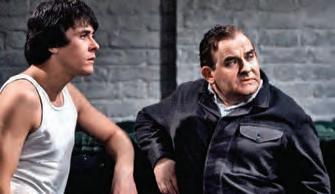
FAVOURITE TV SHOW?
Probably Porridge. I’m a sucker for two men in a room, just chatting. Two characters in an small space having to pick each others’ brains—almost Pinteresque. If Porridge was brand new, I think it’d still make an impact.
FINALLY, WHO’S YOUR COMEDY INSPIRATION?
Definitely my dad. He was the one who got me into watching Reggie Perrin, Python, Fry and Laurie, The Young Ones, Blackadder. He was a really funny guy himself—very dry, very deadpan. n
157 MAY 2013READERSDIGEST.CO.UK

158 READERSDIGEST.CO.UK MAY 2013 ACROSS 1 Steve , Olympic rower (8) 6 Overlook (4,2) 9 Edible underground seed pod (6) 10 Stovepipe, topper (5,3) 11 Lines held by tent pegs (3,5) 12 Informed hint (3,3) 13 Dumbarton’s river (5) 14 Largest city in the US (3,4) 17 Advertise in unauthorised places (3 4) 19 Opportunity, latitude (5) 23 Bring into harmony (6) 25 Non-active element such as neon or argon (5,3) 26 Laughed quietly (8) 27 Satirically incongruous (6) 28 Eats away gradually (6) 29 Elton John’s real first name (8)
ACROSS: 1 Redgrave 6 Pass by 9 Peanut 10 Opera hat 11 Guy ropes 12 Tip o 13 Clyde 14 New York 17 Fly post 19 Scope 23 Attune 25 Inert gas 26 Chuckled 27 Ironic 28 Erodes 29 Reginald DOWN: 2 Eke out 3 General 4 Antipodes 5 Egoist 6 Pleat 7 Sharply 8 Bradford 15 Exceeding 16 Fletcher 18 Pounced 20 Put down 21 Milder 22 Facial 24 Ellis DOWN 2 Make last (3,3) 3 Army rank (7) 4 Down Under (9) 5 Self-obsessed person (6) 6 Kilt fold (5) 7 Cuttingly (7) 8 City near Leeds (8) 15 Going over (9) 16 Person who makes arrows (8) 18 Swooped (7) 20 Quell (an uprising) (3,4) 21 More moderate (6) 22 Beauty treatment (6) 24 New York harbour isle (5)
Test-your-Knowledge Crossword
* Entry is open only to residents of the UK, Channel Islands, Isle of Man and Republic of Ireland aged 18 or over. It is not open to employees of Vivat Direct Limited (t/a Reader’s Digest), its subsidiary companies and all other persons associated with the competition.

1. Noughts and crosses
Put a nought (O) or a cross (X) in each cell so that there are no lines of three (OOOs or XXXs) in any direction. There is only one answer.
3. Pathfinder
Beginning with the highlighted letter, follow a continuous path to find 19 items of headgear. The trail passes through each and every letter once and may twist up, down or sideways but never diagonally.

Teatime Puzzles
2. Suko Place the numbers 1 to 9 in the spaces, so that the number in each circle is equal to the sum of the four surrounding spaces, and each colour total is correct.




£50 prize question (answer will be published in the June issue)
Wordladder Change one letter at a time (but not the position of any letter) to make a new word—and move from the word at the top of the ladder to the word at the bottom using the exact number of rungs provided.

The first correct answer we pick on May 3 wins £50!* Email excerpts@ readersdigest.co.uk
Answer to April’s prize question:
One solution is: Rent, cent, cant, cane, care, hare, hire
And the £50 goes to… Ugomma Adeyeye from London
159
1 2 3
ALL CONTENT SUPPLIED BY PU ZZ LER MEDIA LTD READERSDIGEST.CO.UK MAY 2013
THIS MONTH’S ANSWERS
specsavers.co.uk

Includes all frames, lenses and Extra Options. Excludes reglazes, safety eyewear, contact lens products, non-prescription sunglasses. Applies to one pair of glasses, from £69 range or above. Cannot be used with other o ers. Monday to Friday. Discount not transferable in whole or part for cash. SKUs
25381658, 25144444. ©2013 Specsavers. All rights reserved.


Beat the Cartoonist!
WIN £100 AND A CARTOON PRINT

Think of a witty caption for this picture and you could beat the experts at their own game. The three best suggestions will be posted on our website in mid-May alongside an anonymous caption from our professional cartoonist. Visitors can choose their favourite—and if your entry gets the most votes, you’ll receive £100 and a framed copy of the drawing. Submit to captions@readersdigest.co.uk or the address on page 4 by May 10. Enter and vote online at readersdigest.co.uk/caption. We’ll announce the winner in our July issue. ■
MARCH’S WINNER

Steve Way’s original caption, “It’s a portal to a cat universe, impossible for dogs to enter,” was trounced this month by reader Belinda Hardisty’s cartoon, “The cling film is in place. Now all we do is sit back and wait.” Which, we have to admit, is pretty funny (sorry, Steve). The professionals will be hoping to bounce back, but the readers seem to have a firm grip on this contest now.
SCOREBOARD READERS 10 CARTOONISTS 5

“I Remember” actor Jason Isaacs shares his most important memories

• Britain’s most beautiful rose gardens
• Why you need never get lost again
PLUS Father’s Day Special: how to be a modern dad
160 Follow us at twitter.com/rdigest. Like us at facebook com/readersdigestuk
next month’s issue
In

















































































































 Author and BBC2 Review
Show critic
Natalie Haynes on the new releases
Author and BBC2 Review
Show critic
Natalie Haynes on the new releases





























































































































































 ABI GLIDDON PHOTOGRAPHED BY MARC BURDEN
ABI GLIDDON PHOTOGRAPHED BY MARC BURDEN
 CHARLE S BLA KE
PHOTOGRAPHED BY BARRY MAR S DEN
CHARLE S BLA KE
PHOTOGRAPHED BY BARRY MAR S DEN
 EMILY PLATT
PHOTOGRAPHED BY BARRY MAR S DEN
EMILY PLATT
PHOTOGRAPHED BY BARRY MAR S DEN

















































































































 Short and curly: Peter with sister Shirley at home; (inset) dad Claude and younger sister Barbara join them on the beach
Short and curly: Peter with sister Shirley at home; (inset) dad Claude and younger sister Barbara join them on the beach

















 BY GILLY SMITH PHOTOGRAPHED BY MURDO MACLEOD
BY GILLY SMITH PHOTOGRAPHED BY MURDO MACLEOD





























































 City priest: but Pete Horlock isn’t there to “push God”
City priest: but Pete Horlock isn’t there to “push God”

















































































































 Roast Lamb in Mint Gravy with vegetables £4.25
Roast Lamb in Mint Gravy with vegetables £4.25










































































































































































